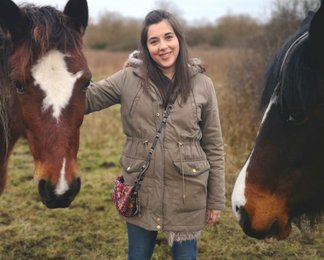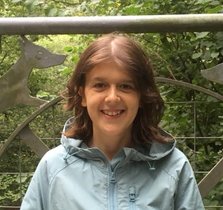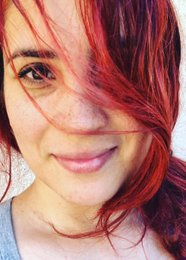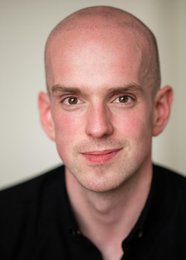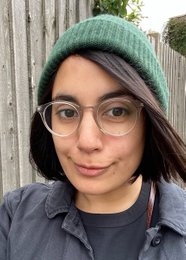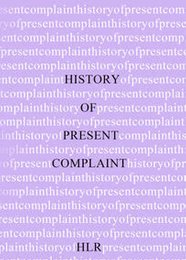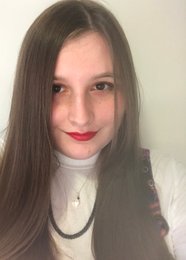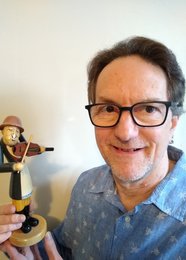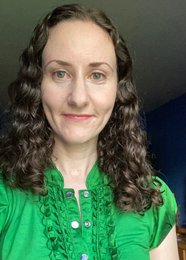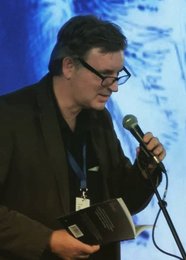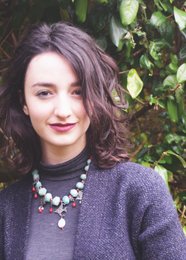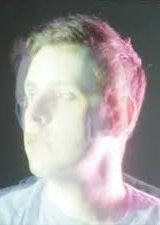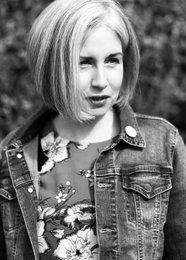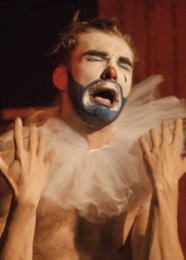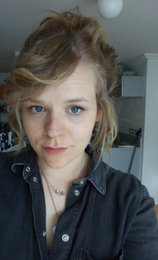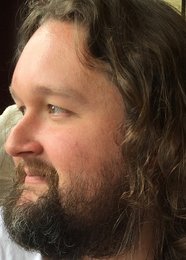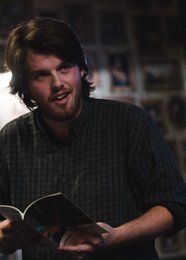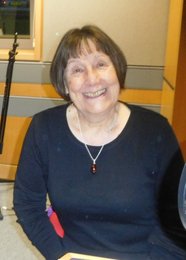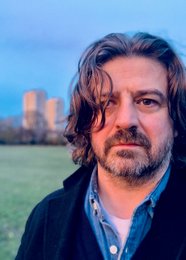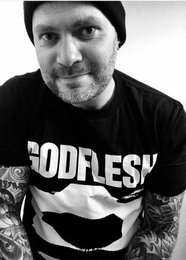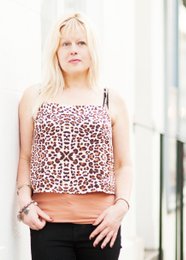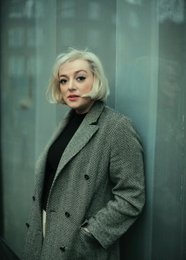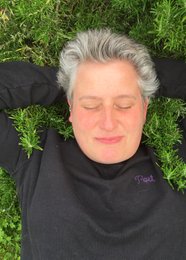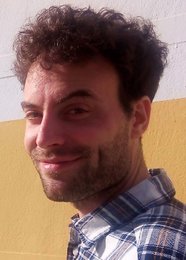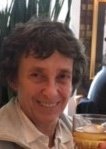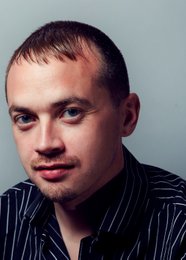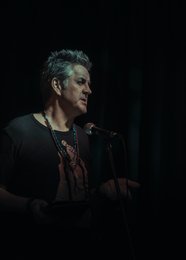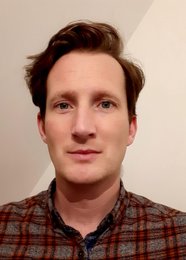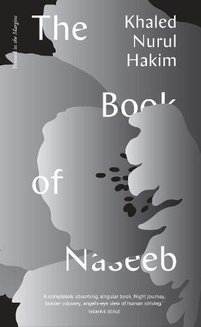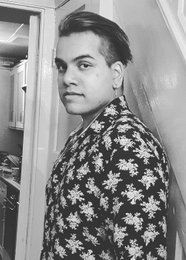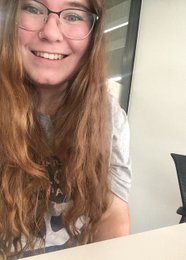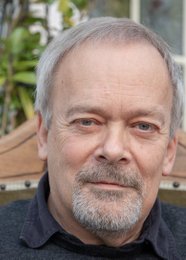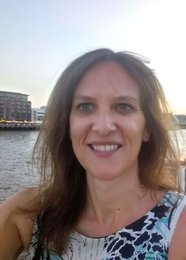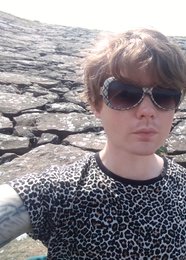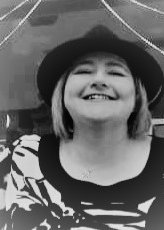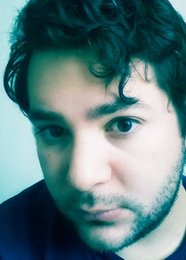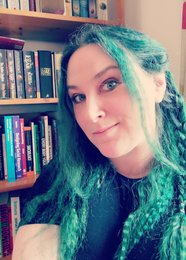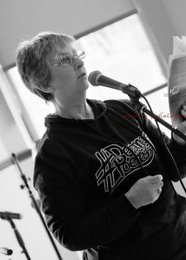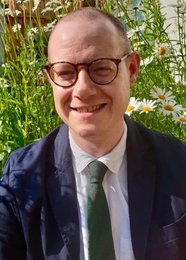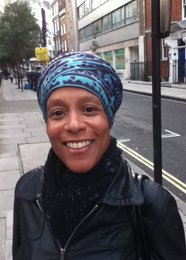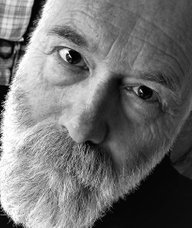Spotlight Poets
There are a lot of amazing poets out there and what we would like to do is to draw your attention to some of our favourites. With that in mind, we will be featuring a poet each week as part of the 'Spotlight Poets' series. We hope you like their work as much as we do.
Jo Bratten
Spotlight Poet #73
Jo Bratten is a writer and teacher living in London. My work has been published widely in print and online, including in The Rialto, The North, Ambit, Poetry Birmingham and bath magg. Her debut pamphlet, Climacteric, was published by Fly on the Wall Press in September.
Hometown: London
Collections/pamphlets titles: Climacteric
www.jobratten.co.uk
publisher website: flyonthewallpress.co.uk
Who would you say has had the biggest influence on your work and why?
Gerard Manley Hopkins. I was writing poetry infrequently and indifferently until I started preparing to teaching Hopkins's poetry to my A Level students. There is nothing more inspiring or exciting than Hopkins's extraordinary elasticity - of form and line - as well as his exhilarating, often manic, prosody coupled with his sheer joy in words and sound. Nature, faith (or loss thereof), guilt, suppressed desire: these Hopkinsean themes tapped into my own concerns and spending a year really immersed in his work, including his journals, reinvigorated my writing and made me, for the first time, write with a genuine sense of poetic purpose. Edward Thomas also is a powerful influence, with his casual, conversational style concealing so much darkness and the way his poems often twist their way to a surprising, usually damning, conclusion: I think 'The Glory' is one of the most brilliant poems ever written. Of poets writing now, Fran Lock and Naush Sabah have definitely changed the way I think about writing 'confessional' poetry. Both are excitingly fresh in style and voice.
What advice would you give to your young poetself?
Read more contemporary poetry, stop writing about your broken heart and be brave enough to read your shitty broken heart poems at university open mic nights.
What is your first poetry memory?
Probably Robert Louis Stevenson's poems for children, like 'How do you like to go up in a swing' and 'I have a little shadow that goes in and out with me'. And the other Robert, too - Frost. My mother made us memorise and recite poems regularly, from a young age. 'Stopping by Woods on a Snowy Evening' was where we started and 'The Road Not Taken' was a rite of passage into teenagehood.
If you could meet any dead poet, who would it be, why?
Shakespeare. There are things we need to know.
What poem by another poet would you have liked to have written?
'That Nature is a Heraclitean Fire and of the Comfort of the Resurrection' by Gerard Manley Hopkins. Read it and you'll see why. He called it a sonnet and it's a mind-bending, tongue-twisting monstrous thing of beauty.
An interesting fact about yourself
My parents had radical ideas about things so I grew up very much off-grid. We had to fetch our water from a well at the bottom of the hill, sometimes through a foot of snow. This has made me eternally grateful for hot showers.
Jo Bratten
Chiaroscuro
In the fractured dark we’re all doomscrolling
before dawn, lit up like Caravaggios:
arms stretched across burning beds,
brows trenched like Judith surveying the head
of Holofernes caught against her bright blade,
baffling our morning brains with fresh dread.
In the pale light of refrigerator dawn
we stroke our kettles, wake our computers,
watch the same horrors play on bigger screens.
Tag yourself: Salome looking away,
the dispassionate crone, the white-shouldered
executioner with pity in his lips,
the head of the prophet on the platter
lit like pearl, all played out, prophecies stopped.
Charlotte Baldwin
Spotlight Poet #72 is the brilliant Charlotte Baldwin. Charlotte Baldwin works on a national project supporting young people’s mental health and as a creative writing tutor & dogwalker. As Gypsy Rose Poetry, she travels round London visiting people living in isolation to talk about their lives and write poems for them. Her poetry has appeared in the Elements anthology from Fawn Press, The North, Under the Radar, Shearsman, Lighthouse and Tears in the Fence, among others. In 2019 she was featured in Islands Are But Mountains, an anthology of the best new contemporary poetry from the United Kingdom published by Platypus Press.
Hometown: Uxbridge
Collections/pamphlets titles: With my lips pressed to the ear of the Earth - forthcoming with...Nine Pens
Who are you currently reading? Emma Hine, Holly Singlehurst, Anna Selby, Dom Bury
Who would you say has had the biggest influence on your work and why?
Probably the American poet Mary Oliver, who showed me how focused attention on the natural world in a poetic space could open up many insights about the human world - a skill which feels ever more precious in in this chaotic, distracted digital age. I also learned much from her book about writing poetry, which teaches the same skills her poems demonstrate - slowness, attention, learning through observation. Caroline Bird has also been a massive influence both as a poet I admire and as a tutor on an Arvon course, which has become a precious poetry memory. Lastly, Pascale Petit has long been an influence for her ability to create deeply human metaphors from vivid, often strange imagery of the natural world.
What advice would you give to your young poetself?
So the work is slow; let it be slow. Trust it and let it happen naturally. Learn. Embrace the joy of uncertainty, of not knowing whether another poem will ever come to you. All you ever have to do is show up and listen.
What is the biggest ambition for your poetry career?
To feel I have brought moments of beauty, joy and connection to people's lives and through struggling to bring those moments, become a richer, more expansive version of myself. To continue writing and growing as the years pass.
What poem by another poet would you have liked to have written?
Phantom by Don Paterson, a deft and powerful evocation of loss which I have always admired for its taut, densely crafted imagery, its restrained monochrome colour scheme (how many poems come with a colour scheme?!) and the relentlessness of its escalation.
What do you find the most difficult thing about being a poet is?
Trusting the long gaps between poems; maintaining the sort of quiet attention which brings poems; being willing to accept them for what they are when they do show up, even if they are not what I expected, or what I think may be publishable.
Charlotte Baldwin
I shared an ale with John Barleycorn
and neither of us were wearing shoes and the empties
leaked onto our toes while the sun hung red faced
from a tree and the dregs of the harvest stood waiting
for rains which never came and two hours earlier
I staked my last field in a poker hand I should have won
and no one but my father had ever spoken of John Barleycorn
but there he sat on the fallen tree with his tankard
so I tried to explain how we could find his song on YouTube
sing along to the tale of his triumphant drunken return
from oblivion with each harvest growing like a miracle
from his tomfoolery tales I sang with my father who sang them
with his father but he shook his head and swigged
and the summer smelled sweet as an open wound
and John Barleycorn puffed oak smoke from his pipe
and traced the path of the old ways with a calloused finger
and I felt a fight climb from the bottom of the bottle
to join the line of things that were all my fault
and John Barleycorn saw its little balled fists
and chewed the yellow husks of his fingernails
so I punched him because he should have hated me
and all of us for what we had done to him
and I punched him because my dream of country life
lay in the yard with its throat cut and the earth’s dry mouths
filling with its blood and I punched him because his world
lay buried beneath the rusting barley beside my father’s
and John Barleycorn’s crooked nose dripped blood
slowly into their invisible graves black as oil
and he asked me why no one knew the words of his song
anymore if we all carried it round in our pockets
JP Seabright
Spotlight Poet #71 is the wonderful JP Seabright. JP Seabright (she/they) is a queer writer living in London. They have three pamphlets published: Fragments from Before the Fall: An Anthology of Post-Anthropocene Poetry by Beir Bua Press; the erotic memoir NO HOLDS BARRED by Lupercalia Press, and GenderFux, a collaborative poetry pamphlet, by Nine Pens Press. The microchap Be∞Cause is available from Ghost City Press, and MACHINATIONS, an experimental collaborative work is out Autumn 2022 from Trickhouse Press. JP is Assistant Editor of Full House Literary, and has been nominated for a Pushcart Prize and Best of the Net. More info at https://jpseabright.com and via Twitter @errormessage. https://jpseabright.com
Hometown: London
Collections/pamphlets titles: Fragments from Before the Fall: An Anthology of Post-Anthropocene Poetry (Beir Bua Press, 2021); No Holds Barred (Lupercalia Press, 2022); GenderFux (Nine Pens Press, 2022)
Who are you currently reading? I read several books at once, both poetry and prose - poetry is the debut collection from Elizabeth McGeown, Cockroach recently out from Verve Poetry Press, and the latest issue from 14 poems, and prose I'm reading Klara and the Sun by Kazuo Ishiguro, as well as Audre Lorde's groundbreaking autobiography Zami and itching to start Everybody by Olivia Laing.
What advice would you give to your young poetself?
Have confidence, don't give up and look for like-minded people for support. I stopped writing for about 20 years due to lacking confidence and support.
If you could take one collection with you to a desert island, what would it be?
Can I have an anthology? If so, then probably The Rattle Bag ed. by Heaney and Hughes as it was the first poetry anthology I owned as a young teen, and although my tastes now are broader, it's still a great anthology and I would enjoy dipping into it again to rediscover classics and for my own personal nostalgia.
What is your first poetry memory?
Writing a poem (aged about 12), plucking up the courage to show it to my mum who then critiqued it as if it was an A Level poetry text. Obviously it wasn't a good poem but this put me off writing and sharing anything for a very long time!
If you could meet any dead poet, who would it be, why?
Sappho. I'd like to ask her to fill in some of the gaps.
JP Seabright
The moment he left the wall he was done for, they were on him from every side
They swarmed round. In the course. I could see. They were young.
They attacked cunningly. They knocked him. They took advantage.
Others followed suit. Absolutely no chance. Shower of stones.
I saw something. Blood trickled down. Clutched his chest.
This hairless skull. He lay still. It was murder. Not my affair.
The police were. Society’s dregs, they. Watched them chase.
In uncontrollable fury. There were shots. Blood was everywhere.
Suddenly someone shouted. I stopped, waited. He pulled out.
Little jeering fellow. I was disgusted. Turning, I confronted.
One of them. A mistake: he. Remembered the revolver.
Its owner was. Furious, he strode. Who are you? Must have cringed.
Not much past. No more chance. What are you? I knelt down.
There was a. A textbook fall. He fended them. Had been flattened.
Acute pain in. In a moment. Stone was thrown. Did not move.
He lay on. Almost torn off. The heart was. I wiped it.
I wanted to. Was a stranger. Was an outrage. How they treated.
They took no. It was disgusting. There was just. I was still.
Why did you? I regretted not. It’s not allowed.
Text taken from the first phrase of each sentence from pages 111-113 of Anna Kavan’s ICE.
First published in One Hand Clapping, June 2022
Mary Ford Neal
Spotlight Poet #70 is Nine Pens own Mary Ford Neal. Mary is a writer and academic from the West of Scotland, where she still lives and works (in Glasgow). She is the author of two poetry collections, 'Dawning' (Indigo Dreams, 2021) and 'Relativism' (Taproot Press, 2022). Her poems are widely published in magazines and anthologies. She relaxes by walking, binge-watching police dramas, and reading contemporary Irish literature.
Hometown: Glasgow
Collections/pamphlets titles: 'Dawning', (2021) - Indigo Dreams 'Relativism' (2022) Taproot
Who are you currently reading? Don Paterson, Jay Hopler, Ada Limon,
Who would you say has had the biggest influence on your work and why?
Probably songwriters, rather than conventional poets, because the act of combining words with music promotes a very flexible approach to syntax and construction. Also, the speech patterns of the people I was brought up around.
If you could take one collection with you to a desert island, what would it be?
Don Paterson's 'The Arctic', because I'm desperate to finish it & I haven't yet.
What is your first poetry memory?
I remember my Mum reading poetry to me when I was a preschooler - not only nonsense rhymes, AA Milne, and children's poetry, but Tennyson, Hopkins and other grown up stuff!
If you could meet any dead poet, who would it be, why?
Mary Oliver, because I think she might actually be good company, unlike most of them.
What poem by another poet would you have liked to have written?
'The Wreck' by Don Paterson, from The Arctic. 'Aubade' by Larkin. 'Prayer' by Carol Ann Duffy. 'Dear Life' by Maya Popa. But if I'd written them, they wouldn't be nearly as good.
An interesting fact about yourself
People sometimes suspect I might be interesting, because I'm reserved, but I'm not.
Mary Ford Neal
Mother, the sun is trying to shine on me
again, as you said it would.
I’ve kept the windows shuttered as you told me to, but
hot fingers always find ways through.
The sun is saying it might turn me golden if I step outside.
But ‘might’ was never good enough for you
and won’t be good enough for me
and I’m remembering everything you’ve said
about how ballerina skin like mine
is slipper-soft, and cannot be exposed.
I think the sun might be a liar, Mother.
You tell me that I mustn’t melt –
that I’m a fool to think I could be golden.
I move the slats a little
see some slow, sun-softened people
and I cannot help but notice that not one of them is burnt.
What should I do? Tell me again
and quickly, Mother. My hand is on the handle
and it’s nearly noon, when shade is hard to find.
Nóra Blascsok
Spotlight Poet #69 is the talented Nóra Blascsok. Nóra Blascsók is a Hungarian poet based in Manchester. Her most recent poems can be found in Butcher's Dog, bath magg and Acropolis. A selection of her poems titled 'Headspace' was published as part of the limited edition Broken Sleep Books imprint, Legitimate Snack in September 2021. Her debut full pamphlet titled <body>of work</body> will be published by Broken Sleep Books in June 2022.
Hometown: Manchester
Collections/pamphlets titles: <body>of work</body> (Broken Sleep)
Who are you currently reading? Just finished Honey Monster by Bobby Parker, absolutely brilliant book! Especially loved Resurrection Mary.
Who would you say has had the biggest influence on your work and why?
John McCullough, love the surreal and playful aspects of his work, while also being political and empowering
What advice would you give to your young poetself?
I didn't properly start writing until my 30s, so I guess I would tell myself to start bloody writing. Joking aside, when I started I often wanted the poems to be about something. It's much more fun to not know that and just write and find out or just never find out.
What is the biggest ambition for your poetry career?
I already feel like having a pamphlet published by a press I love is a dream! A full collection before I turn 40 would be nice too. I feel like you have to be realistic when you are working full time (unrelated to poetry) and start with a disadvantage of writing in a second language and not having grown up in the UK and lacking the networks and formal training.
What do you find the most difficult thing about being a poet is?
the next day: the day after you've written something, you realise it's a pile of crap
If you could meet any dead poet, who would it be, why?
Frank O'Hara, to hang out in New York and gossip and smoke
Nóra Blascsok
GIF
in the round mirror face edges hair granular stare into white of the eye see nights dreaming your death your face looking back in the round mirror aches angular mouth holds back scream this transaction between me & mirror image of me is a Hollywood movie you can do this corporate single woman in her thirties straightening jacket crisp shirt floss look down at toothpaste stains ripping pyjama stitch stay afloat in bath same again day in the round mirror gums eat face rub Pret all over newly acquired head-buds finally feel something dunk myself in iced lattes — revert — in the round mirror smiling what else is there is smiling is laughing is cackling
is crying
Phil Vernon
Spotlight Poet #68 is the brilliant Phil Vernon. Phil lives with his wife Tebo in Kent in the UK, where he returned in 2004 after spending two decades in different parts of Africa. He works in the international humanitarian and peacebuilding field. His poems have appeared in magazines and websites. His version of Stabat Mater with music by Nicola Burnett Smith was performed at St Paul’s Covent Garden in 2019. This Quieter Shore, a micro-collection, was published by Hedgehog Poetry Press in 2018, and a full collection Poetry After Auschwitz was published by Sentinel in 2020. Another collection, Watching the Moon Landing, was published by Hedgehog in 2022. www.philvernon.net/category/poetry. @philvernon2
Hometown: Tunbridge Wells
Collections/pamphlets titles: This Quieter Shore (Hedgehog Poetry Press, 2018), Poetry After Auschwitz (Sentinel, 2020), Watching the Moon Landing (Hedgehog Poetry Press, 2022)
Who are you currently reading? Dereck Walcott, Anne Stevenson
Who would you say has had the biggest influence on your work and why?
Philip Larkin for the way he weaves insights seamlessly into formal - yet originally deployed - poetic forms. Gary Snyder for his use of rhythm and sound. But hundreds of other poets, too.
What is your first poetry memory?
Not the first, but two important poetry memories: 1. Reading Larkin's Aubade, sitting in a courtyard in El Obeid, Western Sudan in 1988 and being blown away; 2. Reading Gary Snyder's poetry in Exeter in the mid-1970s and being drawn into his unique mixing of Japanese, US West Coast and up-country logging camp cultures.
If you could meet any dead poet, who would it be, why?
Hardy. To hear him talk about how his poetry developed privately, over many decades.
Phil Vernon
Arabic Lessons
Arabic lessons
I think I remember this:
my teacher and I discussed free will
on plastic chairs in the scent of citrus leaves,
as thorn tree shadows faded into dark.
God has no plan for you – I think he said –
but what He has, is a map of all your lives.
Which path you take is yours to choose. And then,
which path to take again. And again:
an endless web that only He could weave,
where every join and thread, once left behind, dissolves –
a picture sketched with a twig in the dirt at our feet,
explained with no more words than a child would know.
And yet, Mahmoud, you picked a course you knew
He’d marked in bold for you, and chose to be
a follower of given word for given word.
While most of what I learned from you’s dissolved.
These towering canyon walls whose sandstone layers
were majesty, creation –
evidence that we, however small, belong –
have now become just weight that looms above, and walls.
The river is merely a trickle, and cold:
the sunshine barely reaches here an hour a day.
Hard to recall – imagine even – now,
the paths I chose; or those from which I turned away.
Free will embracing fate, and fate, free will:
it was all so clear, till I forgot the words.
All I can do today is greet a memory of you:
salaam aleikum, keif al hal? Shukran.
Leia Butler
Spotlight Poet #67 is the excellent Leia Butler. Leia (she/her) loves experimental poetry and sound pieces and enjoys work that is bold. She has a BA in English Literature and Creative Writing from the University of East Anglia. She is a winner of the Streetcake Experimental Poetry prize (2019), and her work also appears in Re-side, Beir Bua, Permeable Barrier, and on The Babel Tower Notice Board. Her first poetry collection ‘Tear and Share’ is available at Broken Sleep Books. She is Head Editor of Full House Literary. You can view more of her work on her website: https://leiabutler.com/
Hometown: Ilford
Collections/pamphlets titles: Tear and Share - Broken Sleep
Who are you currently reading? On my reading list, I have lots of poets with debut collections. Pamphlets/collections I'm really enjoying currently would be from writers such as Kali Richmond, JP Seabright, Stuart McPherson, Elizabeth M. Castillo, and Louise Mather.
Who would you say has had the biggest influence on your work and why?
I have so many. I feel as if every day I see something new that deeply inspires me and influences me to get writing. My biggest influence though, has been Nikki Dudley. She is the first person who made me feel like a writer, and this is what inspired me to get writing and be the poet I am today. I certainly wouldn't be where I am today without her. In terms of writing style, I love the way she writes boldly, and this is something I am always trying to achieve more within my own work.
What advice would you give to your young poetself?
I feel I'm still quite new in my poetry adventure, but I would certainly say to the me that started poetry 3 years ago, 'don't be afraid to try new things, and read widely.' When I was first starting out with poetry, I always used to worry that my most recent poem would be my last, and I'd never be able to write about anything again, so I'd also say 'don't worry, you have lots more left in you yet.'
If you could take one collection with you to a desert island, what would it be?
'Dorothy' by Briony Hughes, published by Broken Sleep Books. This is the first poetry collection I ever bought, and holds such a special place. If I was ever in need of inspiration, this would be the book that could sustain me endlessly.
What do you find the most difficult thing about being a poet is?
I think having confidence in yourself is quite difficult, especially as a younger poet. There are so many brilliant writers who I look up to in the community, and sometimes it's hard to keep up with that and feel like you do deserve to have collections out, and you should be shouting about them and being proud of your achievements. I'm certainly working on this though!
An interesting fact about yourself
This year with Full House, I ran a 24-hour online live festival for the charity First Story. It was such a celebration of all different writers, and organisations. We had lots of excellent speakers and had lots of positive feedback about people finding new people and sites they weren't familiar with before. It was such a source of connection and I loved every second (despite having to stay awake for a very very long time!)
Leia Butler
Kitty Donnelly
Spotlight Poet #66 is the talented Kitty Donnelly. Kitty's background is Northern Irish. She currently lives in West Yorkshire. Her first collection, 'The Impact of Limited Time', was published by Indigo Dreams. She is working on a second collection and writing a novel. She works as a psychiatric nurse and rescues unwanted animals. She has an MA in Creative Writing from Manchester Metropolitan University.
Hometown: Difficult to say - born in Oxford but my parents are from Northern Ireland. Have lived for long periods of time in London, Cumbria, Chichester, Swansea and West Yorkshire.
Collections/pamphlets titles: 'The Impact of Limited Time'. Indigo Dreams 2020.
What are you currently working on? 2nd collection. First novel.
If you could meet any dead poet, who would it be, why?
I think I would like a drink with Anne Sexton. Her vivacity and disinhibition is refreshing and I wouldn't have to worry about talking - she could do that for both of us. I love blunt honesty and have a hatred of small talk. I'm used to hearing about the most bizarre situations, thoughts, feelings and behaviours in my job. I don't think anything shocks me now, aside from my own night terrors. I think Anne would be fascinating and not at all conventional. If I had to choose another poet it would be Shelley for his interest in politics, the supernatural and social justice. I could talk about ghosts with him all night on the shores of Lake Geneva.
What advice would you give to your young poetself?
Have some belief in yourself for god's sake. You have only one life and to waste it berating yourself and fearing rejection is a squandering of precious time. Be bold. Trust your instincts. Keep working on your drafts and read as much as you can.
An interesting fact about yourself.
I used to work for a podiatrist in Lewisham when I was at Goldsmiths College. I had to sweep up the toenail clippings. I was sacked because I forgot to post some very expensive insoles to a famous cricketer. There was a big queue in the Post Office and I left them at home, bought a bottle of wine with my student loan and the rest is history.
Kitty Donnelly
Clemency
Weeks, strong sun has seared the soil:
incongruent, luring us out
as though it were natural
for summer to crown in April.
The valley swelters, febrile
under lockdown: hearts leaping
at each new symptom,
temperatures checked like the time.
I want lightening cracking over the heath,
thunder clapping like Thursdays’ hands,
a high wind, loosed like relief.
Who took for granted the gift
of effortless breaths; reassurance
an arm through an arm can give;
lips on lips, hair brushing a cheek?
I did, I did.
Elizabeth M. Castillo
Spotlight Poet #65 is the excellent Elizabeth M. Castillo. Elizabeth is a British-Mauritian poet, writer, indie-press promoter, and a two-time Pushcart Prize nominee. She lives in Paris with her family and two cats, where she writes a variety of different things, in a variety of different languages, and under a variety of pen names. In her writing Elizabeth explores the different countries and cultures she grew up with, as well as themes of race & ethnicity, motherhood, womanhood, language, love, loss and grief, and a touch of magical realism. Her writing has been featured in publications and anthologies in the UK, US, Australia, Mexico and the Middle East. Her bilingual, debut collection “Cajoncito: Poems on Love, Loss, y Otras Locuras” is for sale on Amazon. You can connect with her on Twitter and IG as @EMCWritesPoetry.
Name: Elizabeth M. Castillo
Hometown: Paris/London/Mauritius
Collections/pamphlets titles: Cajoncito: Poems on Love, Loss, y Otras Locuras
Who are you currently reading? Gabriela Mistral, Ada Limon, Mary Oliver, Laura Besley, Roque Dalton, Ave Barrera, Daniel Sluman, Jen Campbell...
Who would you say has had the biggest influence on your work and why?
Uff that's a hard one! Roque Dalton in his mix of intensity and playfulness. Lucille Clifton for grief. A whole myriad of women writers... Maya Angelou, Ada Limon, Warsan Shire, Gabriela Mistral...
What is the biggest ambition for your poetry career?
Art-wise: that my poetry might be the soundtrack of my life, and feature in the important parts of other people's lives. Publishing-wise: To sell enough books to be able to financially support a few independent literary presses on a regular basis.
What do you find the most difficult thing about being a poet is?
A lot of the time it's a lot of work for very little return. Putting everything of yourself into art that very few will read, and ever fewer will buy. Poetry is still considered "niche." Indie poetry even more so. It's a travesty, really.
Elizabeth M Castillo
Can I send you my poems?
Can I bind these words together with the finest filament of my hair? Can I set
the spine with the viscosity of my affection? Can I wrap
this humble offering in egg-shell, and earth, so that on their way to you, new things, green things, might sprout up in between each whispered word? Can I etch
the destination across my rib cage, right there, where the wound you gave me almost
bled out? Can I slice
it open, press you inside, sew it back up with gorse and spidersilk? Hold my breath so
you can’t escape?
Can I tear myself down to only skin, steal into the forest under cover of night? Launch
myself from the tallest canopy? Can I hang,
suspended on the wind, clamber into the undercarriage, nestle myself between blades of
the whirring motors? Fall asleep, head resting against the lull of this strong, steady
machine? Feel the hundred tonnes of thrust cradled beneath me? Can I throw
my entire self into the welcome embrace of the ocean? Can I cleave
my way, breathless, across the seas? Can I scale
the mountains erected defiantly between us? Fight, bare-knuckled, the beasts that live at
altitude? Can I crush
their venomous, bottom-dwelling brothers beneath my heel? Can I harness
the finest desert stallion? Ride him, bare-backed and broken, into the city, against the
wind?
Can I climb the trellis of your castle, slip in, silently through the window of your room?
Can I curl myself around your sleeping body, weave my limbs and yours into a divine
tangle, rest my head in your neck’s crook? Can I bury
myself beneath you, absorb myself into your sweat and skin? Can I burrow
deep into your teeth’s enamel, stretch myself along the slant of your nose? Can I wrap
your thinning hair around me, shrink into the hollow of your clavicles? Navigate the
tunnels of your bloodline from heart to wrist? Can I find
my home in the juncture of the veins that gather there? Dissolve myself into the
lifeblood, disappear into that glorious red?
Or can I just send you some of my poems instead?
Georgia Hilton
Spotlight Poet #64 is the excellent Georgia Hilton.Georgia is an Irish poet and fiction writer living in Winchester, England. Her work has appeared, or is forthcoming in various magazines and anthologies, such as The Rialto, Prole Magazine,192 Magazine, and Perhappened. Georgia has a pamphlet, I went up the lane quite cheerful (2018) and a collection, Swing (2020), both published by Dempsey and Windle. Her poem, Dark-Haired Hilda Replies to Patrick Kavanagh, won the Brian Dempsey Memorial Prize (2018) and her short poem The Lost Art of Staring into Fires was a runner-up in the Briefly Write Poetry Prize (2021). Georgia lives with her husband and three children. She tweets sometimes at @GGeorgiahilton.
Name: Georgia Hilton
Hometown: Limerick
Collections/pamphlets titles: I went up the lane quite cheerful; Swing - Dempsey Windle
Who are you currently reading? Kim Moore, Naush Sabah, Ankh Spice.
Who would you say has had the biggest influence on your work and why?
The late Eavan Boland was a huge influence. It was a revelation to me that a woman poet could write about domesticity, children, husbands, menstruation etc and still be taken seriously. Of course she wove a lot of history, myth and magic into her poetry too, and I found this synthesis of the everyday and the mysterious very exciting.
What advice would you give your young poet self?
I would tell my young poet self that you don’t need permission to write! Poetry is not an indulgence or something reserved for other people - it’s your birthright.
If you could meet any dead poet, who would it be and why?
W.B. Yeats. I memorised many of his poems when I was a teenager. He was around at a pivotal time in Irish history, and knew many of the protagonists - it would be fascinating to hear his firsthand account of the time. I would also like to hear about his interest in folklore and the occult.
Georgia Hilton
Phoenix
When I went up in flames
it wasn’t quick, or clean.
Even now I can hear myself
scream. In still moments
it comes back to me –
the howling, the disbelief,
the smell of burnt fat,
singed feathers, scorch marks
on the ceiling. The mess I left
behind when I immolated
was itself an atrocity.
I grew back a worm
from a pile of ashes, ugly
pale thing without feeling.
Here I am in red and gold,
indestructible, a flame-bird –
rage and sheen are what
the fire left me. You say
my tale is hopeful – yes –
I was reborn but I still died first,
my plumage mimicking
the thing that killed me.
And I did it to myself, that’s
what hurts the most
Andrew McMillan
Spotlight Poet #63 is the brilliant Andrew McMillan.
Name: Andrew McMillan
Hometown: Barnsley, and now Manchester
Collections/pamphlets titles: physical, playtime, pandemonium
What are you currently working on? My boyfriend got me an advent calendar with a different kind of tea behind every door- number 24 is Christmas Cookie flavour, which feels as though it could go either way
Who would you say has had the biggest influence on your work and why?
Am I allowed more than one person? Obviously it’s no secret that I come from a house of poetry, and one of the very important things that privilege afforded me was a chance to see poetry as a living, tangible thing, that someone could really do as a job. Beyond that, I also had instilled in me this real sense that where I was from, my street, my village, my town, my own life, my own voice, were worthy of poetry and that was a really important thing for me to carry forward. Thom Gunn is someone I’ve talked a lot about so I won’t repeat myself here, but both formally and thematically he’s been a hugely important voice on my shoulder. It was first reading the novels of Jon McGregor, when I was younger, that helped me towards what was at least my early style of plain, and stripped back directness.
What poem by another poet would you have liked to have written?
That one that someone has just finished, and they’re sat at their desk, or looking at their notepad on their knee, and they have that glow of satisfaction- they’ve walked the tightrope of the page, they’ve landed the plane in foggy weather, they’ve managed to get out what was in their head without too much being lost. That feeling always gives way to anxiety, uncertainty, anger, bemusement, bafflement, but that moment, that moment of satisfaction or excitement or joy at having done something, I’d like that feeling, and maybe for it to last a little longer than it does
What is the biggest ambition for your poetrycareer?
Honestly, to be able keep writing for as long as it’ll keep coming, to be able to keep reading it, because reading it is the first love and that, if it was a choice between writing it and reading it, the reading is always what I would want to return to. There’s a great quote by a comedian who’s talking about their career and they imagine this time when , one day, they go to an event, and nobody is there, and they just go home and get in bed next to their wife and say “well, that’s that then”. I’m really drawn to that idea, maybe one day nobody will want to publish me, or read me or come to my gigs, and I can go home and get in bed and say, "well that’s that then”, and then pick up a book and carry on reading. I like to help and support other people, that’s not an ambition per-say, but a hope that I have space in my life for that to continue
Andrew McMillan
grey
I’d thought that having lost it all would spare me this
the way you never hear of snow falling far out
on a calm sea but anchored somewhere between
my thirty first and thirty second year static
settled at my temple flecks of granite
in the stubble first but then the flesh itself
appeared to lighten as though the skin were thinner
and the skull were pushing through and now the right side
of my head is the colour of clouds after
heavy rain and I’ve come to think that this is just
what living is something’s lost and the body
pushes on regardless it has its script
it has its cues you have your lines
Shani Cadwallener
Shani Cadwallender salutes magpies, keeps left, drinks pints, contains multitudes, and is comfortable writing about herself in the third person. Born in a house full of cats and raised in a town full of seagulls, she now lives in a city full of foxes, where she spends the day teaching about words in a high school, and the evening learning about them at Birkbeck College. She can be found hanging around the cemetery, or under a tree in Gordon Square, eyes skywards. Among her compulsions are petting the dogs of strangers and writing poems, of which A Crow’s Diet is her first improper collection.
Name: Shani Cadwallender
Hometown: Peterlee, County Durham
Collections/pamphlets titles: A Crow’s Diet published by Dreich
What are you currently working on? I’m just starting a PhD on nineteenth century arboreal poetry and identity, which will combine critical and creative writing. Also, I’m currently working on a collection of poems, provisionally called Something Fierce- ultimately, it’s about relationships- with love, nature and the self. The poem below is from this collection.
What poem by another poet would you have liked to have written?
I wish I’d written ‘Death of A Naturalist’. It was the first thing by a ‘canonical’ poet I remember instantly identifying with for its fascination with the disgustingly compelling side of nature. The way it evokes Seamus Heaney’s spoken voice, as well as mimicking the sounds of the vengeful frogs slapping through the mud, still absolutely thrills me. It’s nature poetry done perfectly.
If you could meet any dead poet, who would it be and why?
This is a tough one- they say you shouldn’t meet your heroes, and certainly a good poet does not necessarily equate to a good person. But, since I had the great honour of meeting that kindly wizard Seamus Heaney while he was living, I suppose I’d choose Amy Levy, a Victorian poet I’m currently researching for my PhD. She was the first Jewish woman to go to Cambridge university, and a self-professed ‘minor’ poet. I love the idea of being deliberately ‘minor’, embracing otherness- an early questioning of the canon!
What is your first poetry memory?
It’s hard to be sure what my first poetry memory is; my dad is a poet, so my childhood was full of readings, which I loved but didn’t always understand! My first real poem, though, was about a trip to Tynemouth, where we saw seagulls nesting in the rock face. I suppose I still see poetry sometimes as a way to capture my impressions of nature, or rather, the impressions it makes on me.
Shani Cadwallender
Nothing to be done
but watch my
breath and maples catching
fireful;
nervous twitch
at scold of jays
with buttered croak:
a gas-blue eyeful.
Wonder, do I
smoulder slow like
ginkgo-gloam
or orange rust; do I
corrode, or grow
on you, or
switch, like
swift-soft footfall;
stick, like branches,
bare-armed after
leaves?
Attracta Fahy
Spotlight Poet #61 is Attracta Fahy. Attracta lives in Co.Galway, works as a Psychotherapist, and has three children. She completed her MA in Writing NUIG ‘17. She was October winner in Irish Times; New Irish Writing 2019, Pushcart, and Best of Web nominee, shortlisted for Over The Edge New Writer 2018, Allingham Poetry competition both in 2019 &’20. She has been published in several journals at home and abroad. Attracta was a featured reader at Over The Edge Reading in Galway City Library, Cultivating Voices, and read with poet Paul Muldoon and Adrian Rice at The Poetry Salon with the Irish American Society of New Mexico. Fly on the Wall Poetry published her debut chapbook collection Dinner in the Fields, in March’20. She was recently one of ten emerging poets chosen for the first-ever Dedalus Press Mentoring Programme.
Name: Attracta Fahy
Hometown: Killererin Tuam Co. Galway Ireland.
Collection: Chapbook - Dinner in the Fields
Link: https://www.flyonthewallpress.co.uk/product-page/dinner-in-the-fields-by-attracta-
What are you currently working on?
I’m so thrilled to have been chosen as one of ten emerging poets to receive a place in the first-ever Dedalus Press Mentoring Programme. I’m really looking forward to this experience and the opportunity to develop my style and craft.
I will be reading at the Fly on the Wall Press Summer Festival on Saturday 3rd July – the festival is from 11am to 6.30pm and includes some wonderful poets: https://www.facebook.com/events/895316811324984/
While I’m not consciously working on publishing a full collection yet, the idea is there and I’m trusting it will emerge organically. I’m not sure what my muse is planning, and as her plans are always better than mine, I will leave it with her.
Who would you say has had the biggest influence on your work and why?
The greatest influence in my work would definitely be my memory of the storytelling nights when I was very young. It was a magical time, intriguing and very poetic. It was a great way of staying connected, and then television came in and took that away. My mother’s singing was another influence, also learning nursery rhymes and reading.
Of course W.B.Yeats was a great influence and definitely inspired my love for poetry. I felt a very special connection to him because I felt connected to the soul in his poetry, and this continues still for me in poetry which resonates that same voice I heard through his poetry.
What poem by another poet would you have liked to have written?
This changes, right now it is ‘Dust’ by Doireann Laux.
What is the biggest ambition for your poetry career?
I don’t think in terms of career anymore, my focus these days is on finding a reflective way of being in the world. My greatest career has been rearing my children alone this past number of years, and my role as a mother even to adult children continuously inspires everything I do, including my poetry. I like to read, learn and write at my own pace. Writing for me is soul work, and I don't want it to become ambition, or driven. I make sure to nourish my other interests too.
What advice would you give to your young poetself?
Trust that you are more than enough. Everything takes time, and along the way there are many paths, but they all lead back to the becoming of who you are, and the finding of your origional self.
An interesting fact about yourself?
Because I have a very sociable and engaging persona, very few know that I am an introvert, and love nothing more than to be alone reading, or working in my garden communing with birds, bees, flowers and butterflies. Apart from my work and time with my children, I spend most of my time alone, and to me that is heaven.
Attracta Fahy
Sensual Nature
What if Eros
was also a tender leaf
falling in autumn,
or a marigold,
striking light,
decomposing in soil?
The wind gathers, travels
into every crevice,
as the months move.
I sit in sunset,
watch swans float
on Lough Corrib,
how they arrive
at the brink,
and observe.
Seagulls speak to me
from other worlds.
When the stars dance
they arrive at night
in a sheet of sparkling
pleasure, into our hearts.
My heart also moves,
raw and bright.
Pauline Rowe
Spotlight Poet #60 is Pauline Rowe. Pauline lives in Liverpool and writes poetry and essays. She has worked as a poet in community and health settings for nearly 20 years. She was the first writer-in-residence at Liverpool’s Open Eye Gallery (2016 – 2019) which led to a research interest in poetry and photography. Her recent PhD in Creative Writing from Liverpool University included a study of the work of American poet Frank Bidart.
Name: Pauline Rowe
Hometown: I was born and brought up in Widnes but have lived in Liverpool for the longest time.
Collections/pamphlets titles:
My first pamphlet was published in 1993 – luckily under my previous name and by a small press that no longer exists.
My other publications and exhibitions are:
The Weight of Snow (Maytree Press, Feb 2021)
The Ghost Hospital (Maytree Press, Oct 2019)
The Allotments (Victoria Gallery & Museum, Liverpool, 2019)
Sleeping in the Middle (Open Eye Gallery, 2018)
Voices of the Benares (Lapwing Publications, 2014)
Waiting for the Brown Trout God (Headland Publications, 2009)
Playing Out Time (Driftwood Publications, 2005)
What are you currently working on?
I’ve been working on an education project with MaxLiteracy, Open Eye Gallery and Wirral Hospital Schools this year and am in the middle of developing the learning resources for this.
I’m thinking about trying to put together a new full collection but I’m very uncertain about it – I am rewriting and reconsidering a series of poems I’ve written about the nineteenth century American journalist Nellie Bly. I have a lot of poems that I have not submitted anywhere and I need to think about what my duty is as a writer. Is it to hide things away or send them out? I have a memoir buzzing around my head about friendship, poetry and death (all the good stuff), a crime novel half written and lots of ideas for essays. Something I’m looking forward to is collaborating with my sister on a play but we’ve only just started planning this.
What poem by another poet would you have liked to have written
It’s ‘Those Winter Sundays’ by Robert Hayden
https://www.poetryfoundation.org/poems/46461/those-winter-sundays
This is such a moving and finely written poem about generational and family division. And love. A challenge, if you like, to Larkin’s ‘This Be The Verse’ – that seems truer and more humane.
If you could meet any dead poet, who would it be, why?
It would have to be William Blake. He is one of the most amazing visionary, mystical poets who devoted his life and work so completely to art and did so in the face of poverty and struggle. And ‘Tyger’ was the very first poem I remember reading and loving when I was 6. I’d like to meet his angels too.
If you could take one collection with you to a desert island, what would it be?
This is really difficult. I really love and go back to poems by Tony Harrison, D.H. Lawrence, Alice Oswald, Thom Gunn, John Donne, Seamus Heaney, John Keats, Robert Lowell… but I think I would have to choose either Shakespeare’s Sonnets, so that I could learn them by heart, or Frank Bidart’s Half-light, Collected Poems 1965 – 2016 as I love American poetry and I think Bidart is a major and completely unique poet. His work is difficult and complex. So it’s between English sound and rhythm or American voice? Hmm… I’d have to go for Bidart.
Pauline Rowe
Wedlock
‘’both succeed at last in drowning’’
from ‘He is Ava Gardner’, Frank Bidart
They try to assist each other for hours,
day after day. He puts his weight
on her head to keep it submerged,
the parietal bone a resistant football.
He floats on the surface, faces the sky
as her head nudges his back. He becomes
afraid, so rolls away in the water, a man-seal.
He needs her weight too.
She struggles in the air, recovers in rushed
commotion, reminded of separation.
Cold and colder. Oxygen infuses her blood.
It is his turn to drown.
She puts her pale hands on his skull –
an un-birthing; his head scattered
with tiny pits of slime and pain.
His wide, scarred limbs float away.
They cannot solve it –
how to help each other drown.
Perhaps they should swim out
until their legs refuse to move
so that they lose direction –
release each other’s hands
until there’s no coming back.
HLR
Spotlight Poet #59 is the talented HLR (she/her) who is a working-class poet, writer, and editor. She writes autobiographical poetry and short prose about living with chronic mental illnesses, trauma, addiction, and grief. Her work has been widely published in print and online since 2012. Her debut full-length prosetry collection ‘History of Present Complaint’ was released by Close to the Bone in February 2021. She lives in north London, where she was born and raised. @HLRwriter / www.treacleheart.com
Name: HLR
Hometown: London, England
Collections/pamphlets titles:
History of Present Complaint (Close to the Bone) & micro-chap Portrait of the Poet as a Hot Mess (Ghost City Press)
What are you currently working on?
I’m drafting my second full-length collection, titled ‘Anatomy of a Disordered Personality’, and reworking old material.
What is your first poetry memory?
Probably my dad writing obscene limericks taking the piss out of our friends in the pub. Or my dad spotting an advert in the newspaper calling for entries for a national poetry anthology, him telling me to send a poem in (even though it was for adults and I was 10 years old) and then, when my poem was published, him carrying the anthology with him everywhere, showing it to everyone in the pub, and shouting, “MY DAUGHTER IS A PUBLISHED POET!” at anyone who’d listen.
If you could take one collection with you to a desert island, what would it be?
Les Fleurs du mal by Charles Baudelaire.
What advice would you give to your young poet self?
Stop thinking you’re stupid and feeling like you're not good enough because you didn’t have a stable upbringing or as good an education as your peers. It’s precisely because you have no idea what you’re doing, no teacher to inform you or money to support you or home to live in, that your writing is as unique as it is and as honest as you are.
HLR
Sweet Release
You have never been so relieved
to breathe in pollution, to find your feet
standing on concrete at the bottom of Highgate Hill.
You got out. You lied your way out of the padded room,
and now you stand, outside, alive, a sobbing Sisyphus
with holes in your socks and shakes in your veins.
You feel fizzy
[when you were 18, you burnt your fingertips off]
Your body is fizzing under its skin
[in all of your dreams, he is in trouble]
You spilled everything and you’re still not empty
[on your 21st birthday, you set your hair on fire]
Psht <<< that’s the sound of a can opening
[you wore black to his wedding, red to his funeral]
North London has never looked so ______________.
You are not okay but you are not inside
You feel fizzy inside but you are outside
You are outside so you are free
You are free and you are
you are
you
are
you
are
you[1]
[1] are not a liar
Naoise Gale
Spotlight Poet #58 is the talented Naoise Gale. Naoise is an autistic poet from West Yorkshire. Her debut pamphlet After the Flood Comes the Apologies is forthcoming with Nine Pens. She writes about mental health, neurodivergence and addiction. Her work has been published in various magazines such as Opia Lit, Versification and Nightingale and Sparrow. She was shortlisted for the Creative Future Writer’s Award 2021 and longlisted for the Fish Poetry Prize 2021.
Name: Naoise Gale
Hometown: Huddersfield
Collections/pamphlets titles: After the Flood Comes the Apologies (forthcoming with Nine Pens)
What are you currently working on?
At the moment I’m applying for an MA in creative writing. I’m also working on poems for my first full collection, which is in its early stages.
What poem by another poet would you have liked to have written?
Poem in Which I Do Not Become A Bird by Gaia Rajan. I lost a friend to suicide nearly a year ago, so the poem resonates with me on that level. I’ve tried to write my own poems about the experience, and have succeeded occasionally, but I’ve never written anything as perfect as this poem.
What is your first poetry memory?
When I was about two years old, I loved memorising things, particularly adverts. I would constantly embarrass my poor mum in the supermarket by pointing at random products and reciting the words of the TV advert that went with them. One day my granny had the fantastic idea of teaching me poetry. She chose The Daffodils by William Wordsworth. I memorised it quickly and it became quite the party trick – my granny always got me to recite it for neighbours, friends, or anyone who walked past her garden!
What is the biggest ambition for your poetry career?
I’d like to make a living doing what I love. Obviously, with poetry, that’s not particularly realistic, but if I could make enough to get by from writing, translating, editing and doing other literary bits and pieces, that would be my dream.
What advice would you give to your young poetself?
I’m still a young-ish poet now (I’m twenty-one). I think when I was about fifteen, I believed that I needed to write the most revolutionary, incredible poetry book ever; I thought it needed to published immediately and it needed to win every award under the sun. If I hadn’t made it by sixteen, I would be a total failure. I would tell my younger self not to rush or worry so much. Every poem is a practise, and every poem moves you forward.
Naoise Gale
Dream
There was a breath of white fog
that smothered the vast mouth
of water like a wet hand; there
was a boy on a canoe pedalling
furiously into the half-smoke;
there was a vase of lilies in the
hallway, drooping into oblivion.
I sat whale-quiet in the doorway,
mind fixed on a peculiar dream:
a sliver of foil silver as mercury,
a straw long and thin, blue smoke
thick as New Delhi smog. Two
teenaged cherubs danced in
my vision, laughing as I inhaled.
The smoke plumed from my
nose like cold breath, and my
cold breath plumed from my
mouth, like smoke. The fog
kept on sighing, and a thousand
other girls like me breathed air
clouded as fresh Italian lemonade.
David Bleiman
Spotlight Poet #57 is the brilliant David Bleiman. David writes out of Edinburgh in English, Scots, Spanish, Yiddish and a largely imagined dialect of Scots-Yiddish which won him the Sangschaw prize in 2020 for The Trebbler’s Tale. He has been shortlisted for the Wigtown Poetry & Pamphlet prizes 2020. He is a winner of the Poetry Society members’ competition on the theme of surreal cities, Poetry News, September 2021.
Name: David Bleiman
Hometown: Edinburgh
Pamphlet title: This Kilt of Many Colours
What are you currently working on?
I have several projects bubbling away. My next pamphlet may be on various forms of love,including family, romantic and love of place (as in my slightly ironic love poem to myadoptive home nation of Scotland, included here). Or maybe I will assemble my poems about my home barrio of Cramond, a strangely liminal suburb of Edinburgh, which sits on a muddy border between city and countryside and even has its own island. A third project would be a collaboration with my novelist sister and compile her short stories and my poems on a family heritage theme, alongside photos and documentary records. Finally, I am working up my capacity to write poems for children, so as to have something to offer my two year old granddaughter, who is already enjoying rhyme and is nearly ready for unreason.
What is your first poetry memory?
If I can give “poetry” a liberal interpretation, my first memory is of sitting, age 6, on the stoep of our family house in Cape Town, 1959, while my sister Barbara told me of her imaginary family: A-cron, B-cron, C-cron, D-Cron, E-Cron…and Jerry! It must be poetry because I have made use of this memory as a shred of found poetry. I guess that Barbara must have had a first alphabet book, including “A is for acorn” and her five-year old imagination did the rest.
What poem by another poet would you have liked to have written?
I’ll plump for John Donne’s famous sermon on the theme that “no man is an island”. It is
extraordinarily resonant and enduring. Hemingway used the phrase “for whom the bell tolls” as the title of a novel. I found that during and after the Brexit referendum Donne’s words kept repeating in my brain, especially the concept that we are all part of the continent and if a clod of earth be washed away, Europe would be the less. I wrote a number of angry rants about Brexit and eventually some more reflective poems and, time and again, found myself channelling Donne. Oddly, what Donne developed as a metaphor, now works in a much more literal way.
An interesting fact about yourself.
In 1976 I smuggled the Universal Declaration of Human Rights into East Berlin in my Y-
fronts. It was in one of those wee yellow German Reclam paperbacks. So it tucked in nicely. I have since tried to tuck this anecdote into a poem, with less success.
David Bleiman
Scotland my Love
These greys are not alien imports,
just reds grown accustomed to dreich,
survival of the flattest,
such are pigeons, town doves,
waiting for a referendum
to cross the graphite sun.
Even the robin, poor thing,
will wear a leaden breastplate
while a stoat in dark coat
scopes a granite sky
for signs of snow.
We cling to a ridge
where the ben’s leaky pen
smudges the mist
and run the scree slope
to an ashen-ersed lochan
which hings aff the edge
of the long walk out.
And you, my braw bairn,
redhaired Rowan,
pink in your perfection,
you too will go grey
at the end of the day
and I will be smoke in smoke
hugging the heart of the haar
where even the midgies don’t bite.
First published in “Things to do with love”, Dreich, 2021
Nikki Dudley
Spotlight Poet #56 is the awesome Nikki Dudley. Nikki is managing editor of streetcake magazine and also runs the streetcake writing prize and MumWrite. She has a chapbook and collection with KFS. Her pamphlet 'I'd better let you go' is out with Beir Bua Press. She is the winner of the Virginia Prize 2020 and her second novel, Volta was published in May 2021. Her website is: nikkidudleywriter.com Twitter: @nikkidudley20
Name: Nikki Dudley
Hometown: London
Collections/pamphlets titles:
exits/origins - Knives Forks and Spoons
Hope Alt Delete - Knives Forks and Spoons
I'd Better Let You Go - Beir Bua
Fanny B. Mine - Beir Bua
Novels: Ellipsis and Volta
What are you currently working on?
I'm working on a new pamphlet/collection based around my fears! It may be a disaster but I'm enjoying researching different fears and then exploring them through my writing.
If you could meet any dead poet, who would it be, why? Maybe Gertrude Stein, then I could ask her who the roast potatoes were for.
If you could take one collection with you to a desert island, what would it be?
Something by bpNichol perhaps. He has such a range and if I took one of his Martyrology books, it might keep me going for a while! I love how he has incredibly visual pieces and can say so little with so few words.
What advice would you give to your young poetself?
I would tell myself to be brave, to read my words with more confidence and be open to feedback. But also know when to trust your own words and not change them.
An interesting fact about yourself
I was born 3 months premature, which is why I think I'm usually just on time or late for almost everything!
Nikki Dudley
Helen Allison
Spotlight Poet #55 is the brilliant Helen Allison. Helen is from Forres in Morayshire, North East Scotland. Her poetry is rooted in the dark and light of the natural world and relationships, and her work has appeared in journals and online. The poems in her first collection ‘Tree standing small’ (Clochoderick Press, 2018) explore her family tree, grief and longing, tangled with the beauty and brutality of the natural world. Frequent swearer, tea drinker, walker, swimmer, art trier and important of all mum to two teens, she is working on a new sequence of poems.
Name: Helen Allison
Home town: Forres, Moray, Scotland.
Currently working on: a new sequence of poems.
Pamphlets and Collections: Tree standing small, Clochoderick Press, - available directly from Helen: email helen.k.allison@outlook.com
If you could meet any dead poet, who would it be, why?
If I could meet any dead poet it’d be Norman MacCaig. I picked up a book of his while a teenager and it was like tearing the lid off the world. I can remember the exact place and time I first read his poetry, the sunlight on my bedspread. He also was very kind when I wrote to him when I was still at school and from what I’ve read his sense of humour was brilliant.
What poem by another poet would you have liked to have written?
The poem from another poet I would like to have written is ‘In a Station of the Metro’ by Ezra Pound. I think simplicity is very difficult to achieve and the image here is bottomless and incredibly moving. I admire it so much.
If you could take one collection with you to a desert island, what would it be?
A collection I’d love to have with me on a desert island is Adam Thorpe’s Nine lessons from the dark. It beautifully entwines history, archaeology and nature.
An interesting fact about yourself.
An interesting fact about me is I always wear a ring that my father made for me from a silver coin.
Helen Allison
Last Light
With cancer she is a child again,
the drive to the hospital lit
by her pale face tilting at trees,
her voice proclaiming
everything clean and bright.
Her handbag lies open on her lap,
Turkish Delight spilling out,
whitening the seats.
The darling she gives to her daughter’s name,
glistens like a wedding band, its yellow
piercing her final night like a star.
Her hands lie youthful against the sheets,
a fan scatters summer across her brow,
and the silence of the heart monitor
is a good husband’s promise of sleep.
Neil Young
Spotlight Poet #54 is the excellent Neil Young. Neil hails from working-class west Belfast and, after much shunting about, now lives in Stonehaven, Aberdeenshire, his adopted home, with his wife and our daughter. After school, he worked as a labourer, kitchen porter, barman and stage-hand before becoming a journalist, going on to report everywhere from New York post-9/11 to the Gaza Strip. That background inevitably runs through his writing which is preoccupied by how the personal and political collide; it's a deep, deep well from which to draw. He co-founded Drunk Muse Press last year, alongside Hugh McMillan, and they'll be publishing their first poetry books this spring.
Name: Neil Young
Hometown: Stonehaven
Collections/pamphlets titles: Lagan Voices (Scryfa, 2011), The Parting Glass – 14 Sonnets (Tapsalteerie, 2016), Jimmy Cagney’s Long-Lost Kid Half-Brother (Black Light Engine Room, 2017), and Shrapnel (Poetry Salzburg, 2019). After the Riot (Nine Pens, 2021)
Poems have appeared in Poetry Ireland Review, The Honest Ulsterman, The Interpeter’s House, The Morning Star, The Scotsman, among other journals, and US and UK anthologies.
What are you currently working on? A prospective pamphlet of satires, or spoofs, on the Greek myths, which evolved almost by accident while I was reading the stories to my nine-year-old daughter and decided I didn't like how they panned out - too much hero-worshipping, misogyny and deference to the gods. Not sure how or when it will emerge, but it's entertaining to write.
Who would you say has had the biggest influence on your work and why?
A drama teacher called Ann Pearson, who taught me when I was 18-20, and the curious thing is I had no idea at the time of the impression she left. The lasting impression she left on me was to be ferociously independent-minded, non-conformist, and not to squander our creative energies (and I wish I'd absorbed that latter lesson much sooner). It's intriguing and both wonderful and sad how these impressions are scattered over us and we can be so neglectful of them, or the people who created them, but they lodge like dust in our imaginations just waiting to be kicked up again later.
What poem by another poet would you have liked to have written?
Prayer Before Birth by Louis MacNeice. For me it says everything that needs to be said about humanity.
What is your first poetry memory?
When I was around eight years old I was sent, without explanation, to see the head teacher in his office. I knocked on his door and waited nervously, wondering what I'd done wrong or what punishment might await me. When I was called in, there was a new headmaster, very different to the one who'd previously occupied his chair, and he smiled and praised me for a poem I'd written in class, which included the words 'Satan's claw'. I think, in retrospect, he marked a regime change at the school - imagination was applauded, the approach and attitude towards children was gentler.
If you could take one collection with you to a desert island, what would it be?
Norton anthology, otherwise you'd feel as if you were stuck on a shrinking rock with the same poet forever. And no matter how good that poet is/was, you're gonna fall out.
Neil Young
Linen
You think you know your past
but then you find some things
have hidden meaning,
not just the older pictures
or your granny's watch,
the table linen
Wrapped
and kept for best in a drawer
but not because
it waited for
a queen or star
to come for tea
Because it was the way
the women
stitched a beauty
from existence,
it made a room
more than a function,
the smallest stain
would be a sacrilege.
This was how the ones
who blur between
the photos
blessed the next
with social standing
because
although
they may not own a table
they'd have the cloth.
This outlasts the repo man,
divorces, wars
and emigration,
this the thread
that passes
from the linen
through each hand.
Maia Elsner
Spotlight Poet #53 is the brilliant Maia Elsner. Maia was born in London to Mexican and Polish Jewish parents, with three refugee grandparents. Much of her work thinks about exile in relation to the dislocation of objects and languages, as well as people. She is interested in silences and fragmentation in relation to memory, as a form of alternate history in contexts where so much has been destroyed, and how we resist established narratives, forms and structures. Overall, her subject is the search for intimacy, hope and survive in a violent world. She hopes one day to write about joy.
Name: Maia Elsner
Hometown: This is a hard question for me to answer. I think I make roots in people not places, and those I love are scattered all over the world.
Collections titles: overrun by wild boars (flipped eye, July 2021)
What are you currently working on? I’m currently working on a poetry-postcard project with Guillemot press, writing ekphrastic poems about my grandfather’s paintings. He was a Holocaust survivor and refugee, who found in making a reason to live and to hope, after the murder of his family. I’m also working on a poetry-film collaboration with the aim of bringing together Latin American writers across the diaspora.
Who would you say has had the biggest influence on your work and why?
My maternal grandmother loved poems, and even through her dementia and forgetfulness, she would recite the verses she learned as a child in Mexico. There is one particular poem ‘el tiempo está vengando’, which means ‘time is having its revenge’, written by José de Antequera y Castro, who led an insurrection against the viceroy and King of Panema, and was executed after being incarcerated in 1731. My grandmother returned to this poem, which includes the word ‘tiempo’, meaning ‘time’, in every live, frequently during the last weeks of her life.
What is your first poetry memory?
My first poetry memory is of my mum singing songs for me and my brother to sleep. We were really naughty together, and would deliberately keep each other awake in our bunk beds so she would continue singing to us. I didn’t think of these as poetry until I realized the importance of form, musicality, repetition and refrain in verse.
What advice would you give to your young poetself?
The gift I would give to my younger self – poet and pre-poet – is fearlessness. This is what I try and give my younger siblings, and the young people around me. It’s not exactly advice – because you cannot advise someone to be confident, and telling people not to worry rarely works… But the best teachers and mentors I have seen have both inspired and believed in their mentees – and most importantly, been able to communicate their belief, so that the person feels it also. I hope to one day be able to do that for others.
Maia Elsner
Aaron Kent
Spotlight Poet #52 is the incomparable Aaron Kent. Aaron is a working-class publisher and poet from Cornwall, now living in Wales. He has been awarded the Awen medal and won the Michael Marks Publishing award 2020. Aaron has had several pamphlets released, and his debut collection, Angels the size of Houses, is released at the end of July by shearsman. Gillian Clarke has called his poetry 'word-music', JH Prynne has called it 'unicorn flavoured'.
Name: Aaron Kent
Hometown: Redruth, cornwall
Collections/pamphlets titles: Subsequent Death, The Rink, Bampy, St Day Road, Tertiary Colours, The Last Hundred, Blood Fjord '89. SHITSHOW, Melatonin Spring Collection, Harbour Equinox, Perfectly Reasonable Justifications for Nuclear Apocalypse, Haemorrhage, The Afterlife of Pablo, Collected Pamphlets, Angels the Size of Houses. ANTHOLOGIES EDITED: Hit Points, Crossing Lines, Broken Sleep Books 2018, Broken Sleep Books 2019, Broken Sleep Books 2020, Poetic Interviews.
What are you currently working on: A series of poems that explore the ways in which the conscious edits the subconscious.
What is the biggest ambition for your poetrycareer?
Honestly? It'd be nice to write something and not hate it within 24 hours, that'd be good. Otherwise I think people place too much importance on prizes and reviews, I'm just happy to offer something to a reader, no matter how temporary that offering is in their life.
What advice would you give to your young poetself?
Read. Read poetry widely. Read poetry you like and read poetry you hate. I didn't do this early enough in my career, and it stalled creative progress as I was writing in a vacuum. I think it's essential that poets get to grips with the work around them. You'll improve by reading and learning what works for you and what doesn't.
An interesting fact about yourself:
I am absolutely petrified of being stuck inside of my clothes and not being able to get them off. If I get my arm caught taking off a shirt or jacket it sends me onto a panic. I think it comes from having been stuck in a field at a scooter rally in an inflatable sumo suit when I was little.
Aaron Kent
Forcing my Nose to Bleed Over & Over Again
What even is the first law of Nightmares?
What even is the square root of sleep cycles?
It is easier to use your fingers to count time
spent at the edge of REM
than it is to wrap yourself up in duct tape
and fake your own kidnapping.
I guess what I'm saying is:
I'm still writing about sleep,
still inches from my tomb,
still a walking cut-out of hypnotherapy.
(It didn't work).
Soon, I will have nobody left to bargain with
beside the nocturnal cuckoo
that howls dubstep
and renders the silence
into a form of energy
betrothed to my kinetic restlessness
Kali Richmond
Spotlight Poet #51 is the talented Kali Richmond. Kali is a lapsed video artist living in the north of England. Her poetry has featured in various publications, including Gutter, The Babel Tower, Green Ink Poetry, Coven, Jaden Magazine, Osmosis and Porridge. In 2020 she won both the Reflex Press and Lucent Dreaming flash fiction competitions.
Name: Kali Richmond
Hometown: York, UK
Collections/pamphlets: Gradual Reduction to Bone, published by Nine Pens
What are you currently working on?: I’m working on my first full collection, approaching childhood experiences through a gothic lens: i.e. the council flats become haunted houses, the people shift into monsters (which I’m coming to understand can make them more sympathetic to the modern reader, which was not my initial intention but it’s interesting to play with).
What is your first poetry memory?
My Nana wrote poetry, so I suppose it’s flicking through her books, and being quite shocked at how personal they were. They were full of her drawings and paintings, and touched on, among other things, experiences of war, desire and a dysfunctional family. I remember visiting her cottage and finding a huge print press taking up half of her kitchen and not understanding her excitement – if only I could step back and enthuse with her about it now. I wrote my first poetry “collection” when staying with her aged eleven, about the surrounding countryside. I still recall the joy of it, the certainty that I’d one day be a published poet. It took me longer than planned, but I’m sure her influence got me here in the end.
What advice would you give to your young poetself?
Following on from my last answer, without a doubt it would be: keep reading and writing poetry. Over the last few years I’ve really benefited from connecting with other poets’ through social media. Go back two decades and at my inner-city school I was already weird for openly reading novels; there’s no way I would have pulled a poetry collection out in class. By my twenties I had completely distanced myself from poetry in favour of prose and video art. I’ve had to re-learn everything poetry related in my 30s, including the baptism of writing shockingly bad stuff and (the horror) sending it out in gauche enthusiasm. It is slightly gutting to think how much more experienced I would be had I not given up, but I do believe poetry can be approached at any age.
What poem by another poet would you have liked to have written?
Caroline Bird’s The Ground, from The Air Year. In fact, most of the poems from that collection, but I can distinctly recall reading The Ground for the first time and thinking, wow. It’s the perfect mix of clever, funny, relatable, and yet underneath the witty veneer, quietly moving. I’ve just read it again and can’t believe it’s only a single page long, because it imbues this sense of journey, a great spanning of existence, but I suppose also reflects how fast time seems to rush by. I don’t know how Caroline Bird does it, so many of the poems in The Air Year feel like they’re meant to exist, and now she’s written them no one else can, and I love that, it makes the collection utterly – to coin an overused but fitting word – essential.
Kali Richmond
The Grind
Inspiring a nice bump of dopamine
a woman rescues a bee from a paddling pool
with a trowel from which, when no longer sodden,
the bee crawls into the grass
seeking shelter
from predators who would likely not miss
it on that reflective platter,
and huddles close by gathering strength.
So she is unaware when, an hour or so later
presuming the bee long since flown off,
her shoe finds its sanctuary;
presses thorax and mandibles into earth.
The bee does not die quickly as the woman would
if a creature of unfathomable size
stepped on her as it hung out its washing,
but slow, unable to free itself, and anyhow
even if its legs were able to heft it up and out of the shit,
its wings have been shredded by the grind of pivoting heel,
the woman taking a moment
to admire the buddleia
swathed in painted ladies.
Louise Peterkin
Spotlight Poet #50 is the brilliant Louise Peterkin. Louise is a poet and editor from Edinburgh. She is a recipient of a New Writers Award from the Scottish Book Trust. She is the co-editor along with Rob A. Mackenzie of Spark: Poetry and Art Inspired by the Novels of Muriel Spark (Blue Diode Press, 2018) and she is assistant poetry editor for the long running poetry magazine The Interpreter’s House. Her poems have appeared in many publications including The Dark Horse, Magma and The North. Recently she was longlisted for the National Poetry Competition. Her first collection of poetry The Night Jar was published by Salt in 2020.
Name: Louise Peterkin
Hometown: Edinburgh
Collections/pamphlets titles: The Night Jar, (Salt 2020)
What are you currently working on?
A second poetry collection. It will contain an extended sequence about a writer recovering from a mental breakdown who takes up a residency in a haunted house on the Suffolk coast. It’s essentially a supernatural horror film in poetry form but also investigates themes of depression, addiction, dysfunctional relationships and the creative process itself.
What poem by another poet would you have liked to have written?
It’s such an interesting feeling when you discover a poem you really wish you had written. It’s like the most benign form of envy – really it is intense admiration and a renewed wonder in the possibilities of the art form itself. It usually has the effect of motivating you to write rather than throwing your pen down in dismay (well mostly!)
I wish I had written almost anything by Jen Hadfield. And Judith by Vicki Feaver – I write a lot of character monologues and that is just a perfect example of the form – seething with passion but so controlled and skilfully sustained. And Cow by Selima Hill – she takes a fantastical conceit and imbues it with such relatable yearning – who hasn’t wanted to escape the reality of their life at some point?
What is your first poetry memory?
I remember in primary school our teacher reading out Tam O’Shanter for either Burns Night or Halloween. I remember being thrilled by the vivid description of the graveyard revelry. The bit that stayed with me was the line “Two span-long, small, unchristened babies” I remember thinking I haven’t been christened! It pervaded my thoughts for weeks. A profound sense of impending doom hung over me until something else came along to fill me with dread and trepidation – that’s how it usually worked!
If you could take one collection with you to a desert island, what would it be?
It would have to be Sylvia Plath’s Collected Poems. She is my favourite poet and this is a substantial tome - It contains Ariel, The Colossus, Crossing the Water and Winter Trees and some juvenilia, notes and prose.
Louise Peterkin
Renfield
Not entomology, nor some god-aping
yen for a menagerie to bend to my will
but for the blood, the lifeblood sir! It flows
through the strata of the littlest things.
I was precious
at first, reticent. So when a bee marred
itself in a clumsy descent from the window
I let it curl for days like a dried flower
before I sampled. I smiled:
it tasted liverish, autumnal.
I dusted the sill with sugar for a fly.
I blackened the sill with flies for a spider.
The spider would tempt down a bird.
But I was impatient; I indulged.
I rattled a flea to my ear
then popped it in my mouth like a pill.
My fingers took on the tang of a bell,
faint arcs of gore under each nail
as if I had been playing a black pudding piano.
Small viscera
hung from my gums like a piñata.
I needed self-control if I wanted the sparrows!
I began once again to propagate.
Until the day the doctor entered my cell
to find the air and my hair full of birds.
And what he conveyed, not so much in words
but a sharpening glint in his eyes was a sort of…
respect. I wouldn’t say awe. No, not just yet.
Rick Dove
Spotlight Poet #49 is the excellent Rick Dove.Rick is a progressive poet, storyteller and activist whose work extends across page and stage, blending styles, both old and new, to examine societal and personal change and these forces interact as we grow. A regular performer on the London poetry scene since late 2015, Rick has been published in numerous poetry zines, the national press, was highly commended at the BBC Edinburgh Poetry Slam in 2018, The Hammer & Tongue London Slam Champion in 2019, and the UK Slam Silver Medallist in 2019.
Name: Rick Dove
Hometown: London
Collections/pamphlets titles: Haigha's Noosphere Canticles (WCH Publishing 2017), Tales From the Other Box (2021)
What are you currently working on?
I am currently working on a new collection on thought experiments, and a pamphlet and fringe theatre piece about Evelyn Dove (1902-1987), my great aunt and the first black woman on the BBC radio.
What poem by another poet would you have liked to have written?
To Whom It May Concern (Tell Me Lies) by Adrian Mitchell, the craft, the message, its timeless quality. People often argue that there is a trade off to be made between craft and accessibility, this poem proves that this is not the case.
If you could meet any dead poet, who would it be, why?
Percy Bysshe Shelley, I love his lyricism (who doesn't have a soft spot for Ozymandias) and his politics were fairly radical and progressive for his day, so I think we would have a lot to discuss. Also, we share a birthday which would be handy for drinks...
What advice would you give to your young poetself?
I would say to younger poet me, "Don't sweat too much about the choices you make in your career". There are always going to be niggling doubts about which poems to include in a collection, which magazine to submit a piece to, so don't take any of it too seriously. Concentrate on growing as an artist, "do the work", and you'll get there.
Rick Dove
Bucket List
capitalism is
putting out a fire with a bucket
with a trickle of a hole at the base of it
and having to carry said bucket
from the lake edge to the seat of it
(the fire that is)
and what is your strategy in this
is it in a steady stream of half buckets
anxiously and hurriedly
backwards and forwards forwards and backwards
more than enough
to make sure of enough
or is it more conservatively
in believing you have time
to plug the hole before you go
and committing early to that belief
that efficiency and lack of waste
especially of your own energy
is the key
capitalism is
filling the bucket with poured possessions
to a raging fire made of need
capitalism is
the bucket makers’ greed
selling straw as kindling with black market weed
there’s a hole in my bucket dear Liza dear Liza
you used to sing to me
that one bucket was enough for Maslow’s hierarchy
you used to sing to me
there’s a hole in my bucket dear Liza
that all abundance is about anxiety
around security
about the fear of fire that our news reels bleed
there’s a hole in my bucket
you used to sing to me
my bucket a hole
capitalism is
black market buckets
reselling buckets to stockpile
to price fix
reading bucket diplomas at bucket universities
studying an amendment to the very definition of freedom
all about buckets and straw
and a straw man’s deeds
capitalism is
a media obsessed with fires
even the ones with deniers
the ones we started abroad
and still sell straw to feed
capitalism is
the very idea of buckets
with buckets as seeds
and bucket peer reviewed
year-on-year growth in perpetuity
and bucket salesman arsonists
suggesting the blood of refugees
is as good as water
and better for the buckets’ longevity
it is only thicker
when you’re family you see
capitalism is
an endless game of buckets
bucketing down with rain
and when into every life some rain must fall
the bucket is panacea
catch all
capitalism is
our willing acceptance
and yet total denial
of all this
until we kick it
(the bucket that is)
Olga Dermott-Bond
Spotlight Poet #48 is the fabulous Olga Dermott-Bond. Olga is originally from Northern Ireland. She studied English at the University of St Andrews and is an assistant head teacher at a secondary school in Warwickshire. She has always loved reading and writing poetry, and over the past five years has been dedicating more time to her writing. She has two daughters, and motherhood has shaped and influenced many aspects of her work. Memory, social and political history and female identity spark her interest as a writer and are prevalent themes in her work.
A winner of Candlestick Press’ competition for 10 Poems about Breakfast in 2019, the BBC Proms poetry competition in 2019 and Poetry on Loan competition in 2020, Olga enjoys experimenting with different poetic forms, and has collaborated with a range of local artists as part of Warwickshire Open Studios to create ekphrastic poetry in response to their work. Her new pamphlet 'A Sky Full of Strange Specimens' is out with Nine Pens Press now.
Name: Olga Dermott-Bond
Hometown: Originally Comber, Co Down in Northern Ireland – these days I live in Warwickshire, Shakespeare’s county!
Pamphlets: My debut pamphlet is called ‘apple, fallen’ published in 2020 by Against the Grain Press
What are you working on at the moment?
I am currently enjoying writing about whatever takes my interest. At the moment this ranges widely: Irish myth and folklore, historical and political issues and how they resonate with contemporary life, and the female body). I am thinking about what the shape of my first full collection might look like.
What advice would you give to your young poetself
I would give my young poet self so much advice: (would I listen?!). I only really started writing in earnest five years ago – twenty years too late perhaps! So, I would tell myself to GET WRITING and remind myself that time is short: find the minutes from somewhere and find the joy! I would also tell my younger self to connect with other writers, ask for help, and find many different ways to walk the line between total humility and the belief that your words matter.
If you could meet any dead poet, who would it be, why?
This is a difficult one to answer, as I suppose we get to meet little fragments of dead poets when we read them, but if I had to choose one I might say Dylan Thomas. His poetry is so inventive, lyrical and beautiful, and I never tire of reading of listening to ‘Under Milk Wood’. I don’t think he would find me very interesting company, but perhaps we could spend a few hours in his writing shed in Laugharne and then take a stroll round the village, and he could tell me where his ideas grew from.
What is your first poetry memory?
I always enjoyed writing from when I could first read and write - my mum has uncovered some very ‘early work’ of mine recently while sorting though piles of old books in lockdown! I do remember reading ‘Dulce et Decorum Est’ by Wilfred Owen when I was about ten in primary school. I think it was the first “grown up” poem I had ever encountered and I remember being totally struck by the vividness of the description. Something in the power of the language captivated and moved me – and I have been hooked ever since.
Olga Dermott-Bond
Sonnet of swimming parts
Human body parts 'pile up' in NHS waste backlog
BBC News
This is a love poem. These body parts
don’t know they were meant to be burnt long
ago; don’t know an oozing of black hearts
that swim out of plastic bags is so wrong.
Don’t know the kiss between elbows and scooped-
out intestines - once punctured tyres - now round
with bacteria, bright as jewels hooped
through dismembered Havisham hands, sounds
grotesque when the radio tells us.
A mourning of ankles, appendices, hurt,
waltzing in darkness of this second chance;
a putrid opera, a wake in reverse.
Tendrils of skin float, tiny fish in the depths,
lips brush against cheekbones, longing to be kept.
Day Mattar
Spotlight Poet #47 is the enigma that is Day Mattar. Day is a cheeky queer poet and performer from Liverpool. They facilitate writing workshops with the Queer Bodies poetry collective, of which they’re the co-founder. Day’s poems come from the body, they use poetry as a tool to explore links between the psychological and the physical, the somatic and the sensual. Can a poem make you jump? Is your heart beating faster?
Name: Day Mattar
Hometown: Liverpool
Collections/pamphlets titles: Springing from the Pews
What are you currently working on?
I’m currently working on the manuscript for my first collection, and a long-form sequence ‘Body, Turned’, exploring episodes of dissociation when I was a teenager. This feels like a natural progression from Pews, which records the cause, and now I get to write about the effect. Lucky me… the writing is genuinely quite scary, it feels a lot of the time like ‘horror poetry’, so much of dissociation feels like possession. I’m enjoying working in a new form, too. The shape of a poem is as much metaphor as the language inside.
Who would you say has had the biggest influence on your work and why?
Sharon Olds taught, and continues to teach me, that I could rely on the power of simple language to manage the ‘bigger’ things. Early in my writing I had this idea that the more abstract the subject (love, death, trauma) the more overwrought metaphor, and this can work for some poets, but I think I respond to Old’s ‘image-ination’, her plain and direct, almost imageist, response to the experiences of her childhood.
If you could meet any dead poet, who would it be, why?
Frank O’hara, so I could flirt my way into his apartment, count his freckles, and drink his coffee. He wrote my favourite love poem in the world, so I’d plant a kiss on him for every line.
What advice would you give to your young poetself?
Same advice I give myself now, which is to write and read daily. I don’t do it. I’m doing it this week though - self-isolating with covid, so I have no excuse, and I’ve finished 4 poems in 3 days. Anyone can write poetry! But not everybody is. Write, read, write, read, write, write, read.
Day Mattar
for attention
I was ten when I learned I could hold
my breath, long enough to make the adults
come running. At the traffic lights, after school,
I tensed ‘til my face screeched with blood
stars. I shattered two teeth on the concrete,
was made a fuss of. It wasn’t enough to ask for love.
I needed panic. It was the language, the formula
I understood: harm yourself love will follow.
My tiny face, found suspended in the coat rack, looking
for attention, cord from dad’s dressing gown
in a double-knot ‘round my neck
their little balloon.
(published in Rattle 2020)
Bryony Littlefair
Spotlight Poet #46 is the excellent Bryony Littlefair. Bryony is a poet, community worker and workshop facilitator living in London. Her poems have appeared in various magazines, most recently Poetry Ireland, Magma and Poetry Wales. Her pamphlet Giraffe won the Mslexia prize in 2017. She was shortlisted for the Rebecca Swift Foundation prize in 2018 and 2020 and in 2019 received the Moth Retreat Bursary Award. Her first collection Escape Room will be released with Seren in 2022 and is funded by Arts Council England. bryonylittlefair.wordpress.com
Name: Bryony Littlefair
Hometown: Watford
Collections/pamphlets titles: Giraffe (2017) – Seren Books
What are you currently working on? I’m finishing my debut collection Escape Room, which will be released with Seren in early 2022.
Who would you say has had the biggest influence on your work and why?
Marie Howe. I remember coming across a snippet of her work while I was browsing around Tumblr and it just blew my mind wide open:
‘the sky darkening from light to heavy grey
And why shouldn’t I be happy, and why shouldn’t we argue –‘
I think it was the juxtaposition of the idea of being happy and the idea of arguing. Conventionally – in psychology, philosophy, art - they don’t sit alongside each other - or at least I hadn’t seen them sat together before. Plus the backdrop of a dramatic sky with changing weather. Those two lines hinted that life was so much more complex and in-flux, so much more difficult-in-a-good-way than I could know, and there was a comfort in that. All her poems are like that – consolation and difficulty inseparably together. I also love the biblical and spiritual references as I grew up attending church with my family, though I am an atheist now.
What poem by another poet would you have liked to have written?
There are so many. Goodtime Jesus by James Tate, it’s so cheeky. Or The Art of Disappearing by Naomi Shihab Nye – I find that line ‘Tell them you have a new project. It will never be finished’ so beautiful.
What is your first poetry memory?
I wrote a poem called ‘A day in a life’ when I was about 9 or 10, which used a day in a person’s life as a thinly-veiled and clunky metaphor for a person’s entire lifespan (I remember it ended with ‘And then I slowly dropped to sleep…’ to signify death). I had to read it out to the class, and my teacher cried. I was a really shy and inoffensive child so I don’t think I’d ever made someone cry, at least not on purpose. I thought cool, let’s do that again.
Bryony Littlefair
Typo
How am I meant to bear this, I thought, along
with everyone - the year a typo in a hyperlink -
wearing a fur coat to the funeral
like I had to become an animal to endure it.
But yesterday I woke, cheeks dry for the first time
- we’d slept for eleven hours or more -
and I said, half-dreaming,
I’ve always
thought lesser-spotted meant an animal
has fewer spots and I realised just now
it means less often seen.
Maybe sometimes a strangeness arrives
and lets us free, like loving your partner afresh
when both of you are on separate walks,
and you bump into each other on the high street.
Or a thought occurring to you years after
someone’s death: they didn’t do that to be mean,
they did it because they loved me -
sounding out like a windchime across
an overgrown garden.
It’s like the door
being on the latch when the whole time
you thought it was locked. Someone thinks
I can’t bear it, and then dies. Typo.
Someone thinks I can’t bear it, and then does.
Michael Conley
Spotlight Poet #45 is the fabulous Michael Conley. Michael is a writer and teacher from Manchester. His poetry has appeared in Rialto, Magma, Interpreters House, Butcher’s Dog, Strix, among other magazines. His first pamphlet, ‘Aquarium’ was published by Flarestack. He also writes short stories and flash fiction, and his prose collection, ‘Flare And Falter’, was published by Splice and longlisted for the Edge Hill Prize.
Name: Michael Conley
Hometown: Manchester
Collections/pamphlets titles: ‘Aquarium’, ‘Flare and Falter’
What are you currently working on? Since my latest poetry pamphlet was accepted for publication by Nine Pens, I’m turning back again to prose and working on some new flash fiction pieces for another collection.
What poem by another poet would you have liked to have written?
“Lying On A Hammock On William Duffy’s Farm In Pine Island, Minnesota” by James Wright. For the perfect unwieldy title, for the famous gut-punching twist in the last line, and for the alchemy of literally turning horseshit into gold.
If you could meet any dead poet, who would it be, why?
I can’t really think of a dead poet who I could confidently say would be interested in meeting me. It would probably just be really awkward. I’d like to tell Edna St. Vincent Millay she was the best sonnet writer in English since Shakespeare, but then again I imagine she probably knew that already.
If you could take one collection with you to a desert island, what would it be?
Elizabeth Bishop’s ‘Collected Poems’. I’ve had that collection for about 10 years and now have a tradition where I take it with me on every holiday I go on, partly because she writes so well about travel and partly because I know I’ll invariably find something brilliant in it that I hadn’t spotted before. It’s constantly rewarding to come back to. I’d love to be able to observe the world in the way she did.
Michael Conley
Punching A Pigeon Out Of The Air
To your surprise, your fist
connects. A cushioned implosion; the rush
of a gas stove igniting.
It hits the pavement like a book of raffle tickets.
It scrabbles itself upright in the gutter
and tumbleweeds across the road,
newly aware of gravity.
At the pedestrian crossing, you push the button
and make eye contact
with the man accosting people
for Save The Children. He stares, open-mouthed.
You are the first to look away.
Jake Wild Hall
Spotlight Poet #44 is the excellent Jake Wild Hall. Jake is one half of Bad Betty Press, the host of Boomerang Club and winner of the PBH 2016 Spirit Of The Free Fringe Award. He has performed on BBC Radio and at festivals and literary events across the UK, including touring his debut pamphlet Solomon’s World—longlisted for Best Pamphlet in the 2018 Saboteur Awards. He co-edited anthologies The Dizziness of Freedom and Alter Egos (Bad Betty Press, 2018 and 2019). He is a multiple slam champion and his work has been published in magazines and anthologies including Hit Points (Broken Sleep Books). His second pamphlet Blank is out with Bad Betty now.
Name: Jake Wild Hall
Hometown: London
Collection/pamphlet titles: Solomons World and Blank
What am I currently working on: I've signed up for the London Marathon so mostly that. A few people have recently told me I should write more poems which is nice so maybe there will be something soon.
Who would you say has had the biggest influence on your work and why? At first it was rap, I wanted to be a rapper so much as a kid. Then I found poetry slam and found it so absorbing. I think at the time the openness to talk freely about things that were hurting me and for people to clap was so needed for me. Since then I have really gotten into books and reading and communicating (again my pain) in more subtle ways.
What poem by another poet would you have liked to have written? the Fuck The Police poem by Sean Bonney
If you could meet any dead poet, who would it be, why? Rimbaud because I'd reckon he'd be up for absinth and a laugh.
What is your first poetry memory? Watching was seeing John Agard read half cast, reading was a book called The Day I Fell Down the Toilet and performing was a night called Poetry and Pimms run by Dean Atta and Deanna Rodger.
If you could take one collection with you to a desert island, what would it be? This is such a hard question, picking one is so hard. Today the answer is POOR Caleb Femi.
What is the biggest ambition for your poetry career? To be content because it's so easy getting lost in chasing things, I am so often unhappy with everything I do because it's not as good as what x person is doing. I hope I can just look at some of my work and not go I hate that.
What advice would you give to your young poetself? It's going to be alright and work twice as hard as you're working now.
An interesting fact about yourself? I really like socks with puns on them and I am an advocate for PeanutButter and cheese sandwiches.
Jake Wild Hall
Something
and of course you could have died
i knew that but what use was i
being the dead weight of my worry
two tiny whirlwinds in the front room
me trying to put the room back together
so that when you finally came down you’d say
this is how you kept it for me?
i’d reply i love you this tidy
instead we cried in the kitchen
over a lukewarm dinner
in a brand new bowl taken from
a brand new cupboard in a brand new kitchen
a week ago we where the people
in the pictures we look at and sigh
and wasn’t it perfect
Gill McEvoy
Spotlight Poet #43 is the brilliant Gill McEvoy. Gill won Keele University’s Inaugural Poetry Prize, 2007, and Havant Literature Festival 2009. Best of all was winning the 2015 Michael Marks Award for “The First Telling” (Happenstance Press) It gave her a 2 week residency in Greece at the Harvard Centre for Hellenic Studies, Nafplion, just wonderful!! Hawthornden Fellow (2012).
Name: Gill McEvoy
Hometown: Yealmpton, Devon
Pamphlet title: from Happenstance Press: Uncertain Days, 2006; A Sampler, 2008; The First Telling, 2014. Collections. From Cinnamon Press: The Plucking Shed, 2010; Rise. 2013. Hedgehog press: Are You Listening? 2020. Also one of 6 featured poets in Caboodle, Prole books, 2015.
Among the poets whose work I love are Louis MacNeice, Jane Kenyon, Basho, Rengetsu, Jaan Kaplinski, Thomas Transtromer. But tops is George Mackay Brown and if I had to be on a desert island I’d take his Collected Poems. I love his bright simplicity and his deep sense of place and history on his own island of Orkney. In fact what I really prize in poetry is simplicity, which is often more deceptively telling than elaboration. One of the reasons I won the Michael Marks Award, for a pamphlet about the aftermath of rape, was for the use of implied silence indicated by white space, and simple language. Martyn Crucefix called this pamphlet “terrific”, Who needs more than that?
The poem I’d really love to have written is Louis MacNeice’s poem “Mayfly”; wonderful, his line that the mayfly “goes up and down in the lift so many times for fun” - have you ever done that??? - and later the statement that the mayfly ‘never has a chance to grow up’. Poets shouldn’t grow up and lose their sense of fun.
I don’t think I really want to meet any dead poets; I’m sure they’re better off where they are. And if I had an ambition, apart from to continue writing, it would be the hope that perhaps some day someone would learn one of my poems by heart and keep it there. I’d be thrilled by that if I ever got to know about it!
When I was three years old an aunt taught me to read using a very old-fashioned book about a cat sitting on a mat. I remember playing with those 6 words: The cat sat on the mat/on the mat the cat sat/ etc. Round and round the words went and if I think about it now, they were so simple.
Maybe that’s where my love of simplicity came from, because my maxim now is “take everything out that you can take out then see what’s left”. If I could have given that statement to my younger poet self I would have done so.
My greatest achievement in life is that, because I have always loved wild-flowers and trees I was passionate about learning their names as a child, and I’m pleased to say I can still name most of them even when they’re not in flower. I learned to Look, really look, and I treasure that. I’m not sure if that counts as an ‘interesting fact’ but as I haven’t gone over Niagara Falls in a barrel it will have to do!
Gill McEvoy
Difference
One airport much like another,
the same eternal corridors,
the same departure lounges.
We taxi to the runway.
Below I see white clover in the grass,
a bee, a clump of yellow bedstraw,
a small brown butterfly.
At once the airport turns into
a place where species are defined
by difference. I want to be out there,
on my hands and knees,
naming things.
(from “A Sampler” (Happenstance Press, 2008)
Julie Irigaray
Spotlight Poet #42 is the excellent Julie Irigaray. Julie is a French Basque poet. Her debut pamphlet Whalers, Witches and Gauchos was released in April with Nine Pens Press. Born and raised in the south-west of France, she writes about her native region as well as Paris, Dublin, Bologna and London, where she has lived. Her poems appeared in Ambit, Magma, Stand, The White Review, among others. She was the second and third prize winner of the 2018 and 2017 Winchester Writers' Festival Poetry Prize. She teaches creative writing and is studying for a PhD in English Literature at the University of Huddersfield.
Name: Julie Irigaray
Hometown: Boucau/Bayonne (south-west of France)
Pamphlet title: Whalers, Witches and Gauchos
What are you currently working on ?
I always plan projects five years in advance to keep me motivated, otherwise I feel lost. I’m preparing my first collection : I’ve finally found a theme, but it involves discarding some poems and writing new ones to create a sense of cohesion. So the book will probably not be ready before many years, but I prefer taking my time to make it as good as possible.
What is your first poetry memory ?
Learning things by heart is key to French education, so my first poetry memory dates back from primary school, when pupils are forced to learn poems by heart to recite them in front of the class… I was extremely shy so this was utter torture. We were also required to copy the poems in a notebook and to illustrate them. I was very difficult to canalise at that age, so both my handwriting and colouring skills were quite « messy », and I have memories of the schoolteacher tearing pages off from my notebook until I’d write the poem with a perfectly neat handwriting… All these constraints made me hate poetry until the age of thirteen, when I discovered Arthur Rimbaud. He’s the one who reconciled me with poetry, which was quite of a challenge!
What poem by another poet would you have liked to have written?
Arthur Rimbaud’s « Le dormeur du val » (« The Sleeper in the Valley »), because this poem is a masterpiece in terms of craft. From a technical point of view, Rimbaud respected all the restrictions imposed by the French literary tradition: the alexandrine metre, the sonnet form, the caesura, the rhyme scheme… Yet he managed to make the poem compelling, and the end is so unexpected! Let’s not even mention the fact that he was barely fifteen when he wrote it and that this poem is still considered as one of the finest of the French language… I enjoy scanning « Le dormeur du val » out of sheer pleasure because I admire and respect the efforts Rimbaud put into it. I’d love to teach this poem to Anglophones.
If you could meet any dead poet, who would it be, why ?
I feel as guilty as a parent who has to pick up her favourite child… Three poets have had a tremendous impact on me: Arthur Rimbaud, Federico Garcia Lorca, and Sylvia Plath. I’m doing a PhD on Plath and she’s the one who made me want to write poetry in English, but Rimbaud is the one who made me want to become a poet. I can also recognise myself in Rimbaud’s and Plath’s temper or background. So if I really had to choose between one of them, I might pick up Lorca instead because his personality was the opposite of mine ! He had such a radiant and magnetic personality… I would have probably fallen in love with him !
Julie Irigaray
Exte
For my partner’s first visit to his village, my father brings us to
the highest peak of the Pyrenees. My partner asks why
the word etxe appears everywhere, from road signs
to restaurants, town halls to hotels. My father explains it
means ‘house’, and that the house is very important
for the Basques.
My father doesn't mention a Basque would rather immolate
himself and his family than lose his house. Gabriel Aresti had
his people in mind when he wrote “My Father’s House.”
My father doesn’t admit losing his house would be a
mutilation.
My father tells us the etxe is so important here his neighbours
know him by the name of his house. My father forgets to add
he regularly threatens to disinherit me of his every time I stand
up to him.
My father explains that the eldest child used to inherit
the family house so the other siblings had to emigrate to
Argentina to earn a living. What he doesn't say is many of them
refused to buy land in America because it would have meant
bidding farewell to their Basque house.
Many Basque surnames have etxe as their root, like Etxegaray.
My father deciphers our own: Iri = the city, garay = above,
and at last I understand this is all about place – my surname,
this visit, my angst and anger at never feeling at home in any
country –
My father concludes: it is very Basque, to leave and return.
Casey Bailey
Spotlight Poet #41 is the awesome Casey Bailey. Casey is a writer, performer and educator, born and raised in Nechells, Birmingham and is the Birmingham Poet Laureate 2020 - 2022.
Casey released his debut full collection of poetry, ‘Adjusted’ in 2018 with Verve Poetry Press and his second collection 'Please Do Not Touch' will be published by Burning Eye in 2021. His play ‘GrimeBoy’ will be arriving on the stages of a number of theatres in 2021. Casey’s poetry has featured in a number of anthologies and he was commissioned by the BBC to write ‘The Ballad of The Peaky Blinders’ in 2019. In 2020 the poem was internationally recognised, winning a Webby Award. He has performed his poetry nationally, and internationally.
Casey was named as one of ‘Birmingham Live’s’, Birmingham ’30 under 30’ of 2018. He was also recognised in 2019 when he was made a Fellow of the University of Worcester and in 2020 he was named the Greater Birmingham Future Face of Arts and Culture.
Name: Casey Bailey
Hometown: Brimingham
Collections/pamphlets titles: Waiting at Bloomsbury Park (2017), Adjusted (2018), Please Do Not Touch (2021)
What are you currently working on? A few things. A collection (although maybe not ‘a collection’) of poetry around women/girls who have impacted my life, focusing predominantly on my mom, sisters and wife. Writing for a theatre piece told with huge puppet insects called Insect Safari, a piece with Birmingham Royal Ballet called Thousand Trades and my own play GrimeBoy which will be in theatres early 2022 having been pushed back due to Covid.
What poem by another poet would you have liked to have written?
The Way Home (Liz Berry, Black Country). I get that this quite a ridiculous answer, as this poem is written from the perspective of a mother, but this poem leaves me awestruck every time I read it and often in tears. There are parts where i resonate with the detail of the poem, and there are parts where I am just stunned by the skill of the writing.
If you could meet any dead poet, who would it be, why?
Gil Scott Heron. When Gil Scott Heron spoke about the way in which we as poets, often endeavour to be difficult to understand, as if that provides legitimacy to our work, it really crystallised for the important balance that I try to strike between being poetic and being understood. I’d love to just discuss poetry with him.
What is your first poetry memory?
My English teacher reading John Agard’s ‘Half Caste’ to the group, and ending by looking at me and asking ‘was that alright?” I attached a lot of negativity to poetry during my time in that class.
Casey Bailey
2 Swings
And they will not hold hands,
Instead they will let little fingers
Hang, intertwined. In this bond
they will keep the time he said
I dunno man, you’re special
and the time she said, yeah
maybe not all boys, just most.
Between this finger link
And his black air max 95s
Brushing along the side
Of her white Air Force ones
They will hold a phenomenon
That breaks every rule of this
Place. They will wrap it warmly
In black tracksuits, dip it in honey,
Coat it with Demerara sugar
and rock it, back and forward
On these swings, under midnight sky.
Courtney Conrad
Spotlight Poet #40 is the talented Courtney Conrad. Courtney is a Jamaican poet. She is a current member of Malika's Poetry Kitchen. She was the Roundhouse Slam 2018 runner-up and a BBC Fringe Slam finalist 2019. She is an alumna of the Obsidian Foundation Black Poets Retreat and Roundhouse Poetry Collective. She has competed internationally in Philadelphia at CUPSI 2018. She has been a featured poet at Glastonbury Festival and StAnza Scotland's International Poetry Festival. She has been published by Bad Betty Press, Birmingham Literary Journal, The White Review and The Lumiere Review. She was shortlisted for The White Review Poet's Prize 2020 and Poetry London’s Mentoring Scheme and longlisted for the Rebecca Swift Women Poets’ Prize 2020. Her work has been featured on BBC 1Xtra. Her poetry explores the intersectionality between Black, Caribbean, Queer, Christian and Womxn identities.
Name: Courtney Conrad
Hometown: Born and raised in Kingston, Jamaica but based in Buckinghamshire, England.
What are you currently working on? Currently working on two debut pamphlet. This first pamphlet explores the intersectional politics of race, religion, gender and sexuality. So features poems like Roadkill and The Purge. It examines the utilization of Queerness and Religion as a means of seeking belonging. Also, showcasing some of the consequences of the "us" vs "them" dichotomy created between the LGBT+ and religious communities. Also, focusing on the internal and external conflicts that shape individual openness and repression; and touching on the Black and Caribbean community's relationship with the LGBT+ community.
The second pamphlet explores my experiences with growing up in Jamaica as well as my migration experience to England. I am translating these experiences across space-time and between languages using both English and Patois. The poems explore joy, struggle, systemic corruption, injustice, recreation and partial belonging. The nostalgic vibes will recall events that shaped my sense of self, rebellion, inquiry & declaration.
What advice would you give to your young poetself? There is so much to say, probably to use poetry as a tool for self-exploration. Don’t be afraid, to be honest with yourself on the page. Feel free to hold yourself and other accountable on the page. Apply for emerging writers development programmes, join National Poetry Library and GO TO MORE WORKSHOPS!!!!
An interesting fact about yourself – I played Water Polo for Jamaica. I never saw myself being in the creative industry, I was very much into playing sports. I did competitive netball, swimming and polo. I discovered poetry in my second year at The University of Birmingham. After I completed my year of being the Women’s First Team Captain there, I quit Water Polo to commit more time to Poetry.
If you could take one collection with you to a desert island, what would it be? I can’t choose, so probably between Forest Primeval by Vievee Francis and Teahouse of the Almighty by Patricia Smith. Both poets take my breath away. Their poems get under my skin, making me uncomfortable but in a good way. They make me want to write more boldly and take more risk.
Courtney Conrad
Roadkill
Serpent tongues
swaddle girls like me,
hissing venomous gibberish for
rebuffing the thought of belly becoming coop.
Barbells sculpting shoulders that carry fields
worth of cotton; catapult arms launching stonewall
rage, lasering eyes sifting crowds for violin waists,
tossing breasts into blender garments,
forging husky morning tones over phone lines,
landscaping hair and fingernails to midget form,
pistoling fingers making pussies rise like sky lanterns.
Who wants a ragdoll, sprawling out on both sides of the road?
They see me as tittyless carcass
getting in the way of traffic.
Survival conjuring reinvention of self.
I unearth
the potential of diaper-wearing men;
wrapping self in skirts and dresses tight
like clenching assholes.
Allowing rifle to shoot load
into stainless pussy.
I prepare my stomach,
for cramming,
after the crippling.
Barney Ashton-Bullock
Spotlight Poet #39 is the fantastic Barney Ashton-Bullock. I’m the poet / librettist in the ‘Andy Bell is Torsten’ pop-theatre-poetry collective and I narrate my own verse on the Downes Braide Association albums. I’ve had poetry published in a wide range of cult online poetry journals (SPAMzine, -algia, Babel Tower, Re-Side & Queerlings etc..), in both the ‘Avalanches In Poetry’ tribute anthologies to Leonard Cohen, in various Dreich pamphlets, in the Pilot Press ‘Queer Anthology Of Healing’ and in the 'Soho Nights' anthologies published by the Society Club Press who also published my first collection ‘Schema/Stasis’ in 2017. My latest poetry pamphlet ‘Café Kaput!’ was published by Broken Sleep Books in 2020.
Name: Barney Ashton-Bullock
Hometown: Christchurch, Dorset
Collections/pamphlets titles:
‘Mottled Memoirs’ was part of the ‘Torsten The Bareback Saint’ performance programme pamphlet, SFE through Cherry Red Records, 2014.
‘Schema / Stasis : The Torsten Verse Diaries’, The Society Club Press, 2017.
‘Filthy, Rhymey Murk’ as part of the deluxe CD edition of ‘Torsten In Queereteria’, SFE through Cherry Red Records, 2019.
‘Café Kaput!’, Broken Sleep Books, 2020.
‘F**kpig Zeitgeist! - The Torsten Verse Diaries’ - SFE / Soho Poetry Nights through Cherry Red Records, 2021.
‘Bucolicism: Alt-lite lyrical verse for a post-pastoral England’ - SFE / Soho Poetry Nights through Cherry Red Records, 2021.
What are you currently working on?
I work on a number of parallel projects. Firstly, I have written a second volume of accessible verse to accompany the Andy Bell is Torsten hybrid pop/poetry/theatre collaborative project that I manage. This is called ‘F**kpig Zeitgeist!’ and is a book containing further reflections in poetry of the life, and verse-form diaries of, the semi-immortal polysexual protagonist ‘Torsten’ played by Erasure’s Andy Bell in order to bridge the gap before we start work on our 4th album and theatre show.
Secondly, I am the poet in the prog-rock band, Downes Braide Association (DBA) and have collated my spoken word pieces on their ‘Skyscraper Souls’ and recent ‘Halcyon Hymns’ album into a pamphlet called ‘Bucolicism: Alt-lite lyrical verse for a post-pastoral England’, re-contextualising the fragments into their original longer form works.
Those are both projects where I apply my poetry to external goals. I’m also gestating a collection of my own poetry work to follow on from the release by Broken Sleep Books of my ‘Café Kaput!’ pamphlet last year. I’m also keeping busy getting many new works published in a range of cult and queer poetry journals, particularly in Scotland and the US and reading at many a lockdown open mic!
Who would you say has had the biggest influence on your work and why?
It has to be the poetry of Thomas Hardy, although I’ve refracted madly from his sensibilities since he opened up my poetic imagination, as I’ve immersed myself for many years exclusively in utterly contemporary poetry.
Hardy unlocked the possibility of merging landscape, place and emotion. As such, he was the shoehorn into a psycho-geographic identification with Dorset; the county of my birth and the wellspring of my being, outlook and aspiration. The whole feeling of little people being lost in the enormities of passion, thwartedness and damnable hope; people on the cusp of wholesale societal change, stepping stones from an era of ‘knowing one’s place’, of rural isolation, of making do but being listless with an unarticulated want for more - and all the spiritual awakenings, aspirations and surrenders that come from that. Timeless, human ultra-dramas through unsparing concisions of words that herald the enormous challenges and passing joys of being human, and manifest it as a dynamic tension within a landscape that still resonates with both the beauty and savagery of the natural world.
If you could meet any dead poet, who would it be, why?
- Again, my answer belies the fact that I’m vastly steeped in the poetry of the here and now, but I long to meet Rupert Brooke to simply ask ‘Why?’
I’d like to walk with his manifestation, re-treading his oft-trod route from Corfe Castle station to Lulworth Cove, he’d alight the train there back in his ‘Bloomsbury Set’ days to meet his literary friends for holidays lodging above the West Lulworth post office, near the Dorset coast. He was such the poster boy of his generation, a truly beautiful man, whose heady idealism he never grew mature enough to have had challenged. I am awash in the beauty of his 1914 sonnets, their upbeat, almost pathological optimism, but, very aware that they present a grotesque, ideological screen that unintentionally, but very conveniently, masked the abject horrors suffered by the largely working class young men sent methodically to their grisly deaths by an establishment that was crueller, harsher, more vindictive and more heartless than any I’ve known in my lifetime.
That disjuncture, or rupture, of the poetic myth by the savage reality; that short-circuiting of reason by the conjured romantic lie of patriotic idealism must be one of the most deft ideological uses of the poetic form ever! So strong and binding and motivating and placating and assuaging his words were; comforting those on the homefront, inspiring those naïves bound for carnage with its deflection of certain death by the certitudes of righteousness and glory!
As I say, I just want to ask Rupert, ‘Why?’ and then, maybe make unbridled love on a Liberty picnic rug on a moonlit Durdle Door, (perhaps at the very spot I was a backing dancer in the Cliff Richard promotional video for ‘Saviour’s Day’ back in 1990!) before his ascension / descent / teleportation, whatever, back to the realms of dead poets!
What is the biggest ambition for your poetry career?
- That I might fuse more successfully the spheres of pop, poetry and theatre that, in my mind and to my sensibilities, have always enriched one another. I’d like to think, by so doing, I wouldn’t be written off as not being a ‘proper poet’! Lol!
To this end, my practise within the continuing ‘Andy Bell is Torsten’ and ‘Downes Braide Association’ projects is central to my aspiration to conjoin the artfoms I most love. I’ve grown to be at ease with the notion of there being different audiences for different projects. My ambition is that in being aware of those different audiences, that I don’t write exclusively for, or to, them; that I can function and be respected for the work I write as a poet myself as well and, to that end, ‘Café Kaput!’, published last year by Broken Sleep Books was very much only the beginning of a journey of a wonderment that I hope will see me out!
Barney Ashton-Bullock
Radipole - Out Of It (Deluxe)
(originally published in ‘Café Kaput!’ from Broken Sleep Books)
Omnishambolic… The gruelly spermbursts
From our kicked bollocks;
The native Dorset daughters shy away.
Aortal anthems of ad hoc four letter words
Slurred into a timeless rectitude;
Pisshead, jackboot, thugggery, yes!
Yet, as a pastiche potage of a ‘crew’,
Assumed, assuredly, a bit o’ruff deluxe;
This loose, shape-shifty, bitumen brew,
This assemblage of chummy loners and losers, true!
We speak in oddments and oddities of the Anthropocene age.
Casements of spent vials of home brew, knock-off shots,
Mad Dog 20/20 translucent with our flotsam slobber;
Our platitudes of jabs and right hooks,
Applied with affection betwixt we skittling punchdrunk
Who laugh at contusions and the serenity of knockout.
Now the curfew is ladling down like a vomitous broth
And our matedoms clutch in the crannies
Of the distil points of derelict quarters
With whatever dregs aswill in our filched tinnies
Supped as we smutch for scant warmth
And chirrup in fractal glitch; out of it.
Thirty year train wreck later, this be redolence deluxe
As I flob into Radipole lake.
Guttered delinquents, mastic seep;
Inelegantly, inexpertly spatchcocked.
Tenderised in the bootstomp,
Scabs crisping in the coiling night;
Darkly mottling bruisings,
Black as the potholed tarmac surrounds.
Eternal trimesters of trial.
Our forged crunk credentials;
misfiring misspells in faltering scrawl.
You slagged us for loitering in Arndale arcades,
Those arcades now padlocked empty!
We could’ve been crests of swans glissing ‘cross the Radipole lake,
But got slated and slaked into the quicklime slime
Of your aloofly, boggle-oggle, judgmental stares
Quagmired Dorset lads for whom quarries, trawlers, farmsteads
And grockle laden summer seasons were no longer there.
Not we, beshillinged, cart-bound chancers
A-chance to reel merrily down Ridgeway
Nor the clobber and pat to seduce a Lizbie Brown
Just shat, pissed keks and hunkery hovels
In what of Budmouth Regis be left
We sleep beneath fresnels of rot fronds in watery basements.
On sponge damp mattresses,
We, attired in gaffa’ed cast off carrier bags to stay dry,
Marinaded in the stupor stews of drunken weedheadedness,
Out of it.
Amara Amaryah
Spotlight Poet #38 is the excellent Amara Amaryah. Amara is a poet and travel writer of Jamaican descent, born in London. Her writing is interested in generational traditions, voice, spirit and black womanhood. She has been longlisted for the Women Poets’ Prize (2020) and her poetry can be found published in Under the Radar magazine, Poetry Birmingham Literary Journal, the Hippodrome Young Poet’s anthology and translated in the Colombian publication Arcadia. Amara has performed her poetry both nationally and internationally. The Opposite of an Exodus is her debut pamphlet.
Name: Amara Amaryah
Hometown: born in London but based in Birmingham - still deciding which/if any is home
Pamphlet title: The Opposite of an Exodus
If you could meet any dead poet, who would it be, why?
I'd want to meet Mikey Smith who was a Jamaican dub poet and hugely influential in the dub scene here in the UK and the Caribbean. I came across Mikey Smith's poem 'Mi Cyaan Believe It' during my undergrad on a 'Caribbean Poetry' module and fell in love with his handling of rhythm and his impeccable timing. Mikey was tragically stoned to death very early in his career and if I ever got to spend time with him I'd love to find out about what else he would write if he had more time.
What is your first poetry memory?
When I was about 10 my school entered me into a poetry competition and one of my poems (which I wish I could remember/find!) was selected and ended up being published. Whilst I don't remember the poem, I do remember how it felt to have my family gather around while I read and recited my words. From quite early I liked the fact that me or my words or the excitement of it was able to bring everyone together. In a similar way I actually feel like reading psalms or songs in my childhood church in Brixton shared that intention and energy; gathering to collectively enjoy the musicality of words.
If you could take one collection with you to a desert island, what would it be?
So difficult! I'm tempted to go with an anthology or journal or something just to cheat my way into having several voices. I think I would go for 'The Verandah Poems' by Jean 'Binta' Breeze not only for instruction on how to deeply revel in island life but also for the absolute range from humour to criticism, range in voice and landscape.
I also hate to admit that I would sneak in something written by Sonia Sanchez - probably 'Shake Loose My Skin' or atleast I would tear out a few pages and keep them with me too!
Amara Amaryah
Roots and genesis
A golden shovel after Sonia Sanchez
Somewhere between where I am and who I was, I decide to be both loved and
Lover even though this is not how it is done where I am from. In
This way, I have become more of my mother than my
Mother has. She has let ripeness split the skin, it weeps down the back of her head.
When old roots reggae slips from beneath the kitchen door, I
Imagine her story afresh. On a verandah at sunset, I see
My mother, dressed in all white with a garland in her hair, whispering low and my
Guess is that she is happy. Somewhere near I am Good Island Daughter, etching my history
Into hymn-song and forbidden drum and my love, who wears red, always, sees me standing In
the morning's darkness until it slits itself open and it says something like
I dare you forget again. Maybe this dreaming is all the work left for us raised by a
Body of girls who recognise the love they want only by song; too shy
Or tired to name it. The only way we unearth a soft place to teach a child.
Stuart McPherson
Spotlight Poet #37 is the brilliant Stuart McPherson. Stuart is a poet from Leicester in the United Kingdom. His work has appeared in online journals and anthologies, including Beir Bua Journal, After the Pause and Selcouth Station. His debut pamphlet ‘Water Bearer’ will be published in December 2021 by Broken Sleep Books. His work tends to explore the impact of family dysfunction and trauma upon ‘norms’ of masculinity and encourages a more open dialogue and openness around this challenging subject. He has also been known to write the odd cat poem from time to time.
Name: Stuart McPherson
Hometown: Melton Mowbray, Leicestershire
Collections/pamphlets titles:
My debut pamphlet ‘Water Bearer’ will be published by Broken Sleep Books in December 2021
What are you currently working on?
I’m currently working on a new pamphlet tentatively titled ‘Temporary Mother’. I’m writing it very much as a follow up from my debut, and it explores the process of Psychodynamic therapy from its very beginning to a point of individual progress. I guess you could say its very personal, but hopefully I’m framing it a way that’s accessible to all. My aim is really to encourage everyone (particularly men) to be open about mental health issues, and to see the empowerment in opening up and allowing yourself to be vulnerable.
What poem by another poet would you have liked to have written?
This is such a difficult question as there are hundreds! I think anything by the Korean poet Kim Hyesoon. Her work just has such a uniqueness and power. Its often surreal, but the points she makes actually come through very clearly which I think is a very difficult thing to achieve. If I had to pick one poem it would be “The Way Mummy Bear Eats a Swarm of Fire Ants” from the collection “SorrowToothPaste MirrorCream”. I would definitely recommend the Bloodaxe collection “ Its Ok, I’m Pig!!
If you could meet any dead poet, who would it be, why?
For me, it would be Frank Stanford. I’ve always been in awe of his creative thinking and observation. The fact that he was so prolific must have meant that his mind was in overdrive 24/7. Id love to be able to talk to him just to see what he was like, whether he would be down to earth, or full of ego. I’d like to think he’d be one of those inspiring people who could just interject in a conversation with a few words and leave people speechless. I always feel sad that he died so young.
What advice would you give to your young poetself?
Probably the obvious stuff. The advice I still need to listen to myself from time to time. I think authenticity is key. Don’t write what you think other people want to read, just write what’s important to you. Write what makes you feel better, write what excites you. Write poetry that simply makes you feel lighter afterwards. Also, don’t rush. Poetry can often seem like a numbers game and you’ll often see people smashing out 40 submissions a week. Don’t get sucked into it. It doesn’t matter. There generally isn’t a big prize at the end of it all, just your own satisfaction that you created something meaningful to you, and that’s more than enough.
Stuart McPherson
Aperture
It’s your lens that I’m pushed through
A white flatness manta-raying in liquid
Held atop by tongs, shaken loose drops
More than latent under red light
If you’d have framed me by the lilacs
Not the ledge of your ragged outcrop
I wouldn’t now be flooded,
like a bright ghost from the edges of film
Anna Saunders
Spotlight Poet #36 is the irrepressible Anna Saunders. Anna has been described as ‘a poet who surely can do anything’ by The North, ‘a modern myth maker’ by Paul Stephenson, and Tears in the Fence said of her ‘Anna Saunders’ poetry is reminiscent of Plath – with all its alpha achievement and radiance’. The author of six collections, Anna’s new book is Feverfew. (Indigo Dreams 2021). The collection has been described as ‘rich with obsession, sensuousness and potency’ by Ben Ray, and ‘a beautiful and necessary collection’ by Penny Shuttle. She is also the Executive Director of Cheltenham Poetry Festival and works as a creative writing tutor and mentor, communications specialist, journalist, broadcaster and copywriter/editor.
Name: Anna Saunders
Hometown: Hoylake, Wirral. Merseyside.
Collections/pamphlets titles:
Communion, (Wild Conversations Press), Struck, (Pindrop Press) Kissing the She Bear, (Wild Conversations Press), Burne Jones and the Fox (Indigo Dreams), and Ghosting for Beginners, (Indigo Dreams).
What are you currently working on?
I am currently working on what will be my seventh collection – All the Fallen Gold, the title pertains to all that we have lost, but still cherish – perhaps people, places, ways of life. A few interesting characters and creatures are already popping up in it – Agent Cooper from Twin Peaks, Jung, the artist Samuel Palmer, the infamous arsonist Thomas Sweatt, the god of wine and dance Dionysus, Van Gogh, Sean Penn, a man who murders a puppeteer plus badgers, swallow, silver birch trees, and a host of places I miss very much right now – Liverpool, Venice, Wales, Cornwall ( I write this at the heart of the pandemic lockdown).
If you could meet any dead poet, who would it be, why?
I am sure I would be invisible to him but Dylan Thomas, I think. The lush musicality of his work always affects and moves me. Poetry is at its most potent when it enables us to transcend our surroundings, and DT’s work takes me to the ‘heron priested’ shores, and the coruscating estuaries, and to a time that seems more innocent somehow, or at least quieter, slower and more in tune with nature than the period we are experiencing now.
What is your first poetry memory?
I wrote a poem when I was eight, we had snow – which was rare in the coastal town I lived in. I read it to my mum I still remember how she praised it. This was incredibly encouraging. I didn’t do very well at school but went onto do an MA in Creative and Critical Writing which kick started my publishing record.
What advice would you give to your young poet self?
I would say trust in yourself, don’t listen to anyone who tells you to write poems that are overtly lyrical, or traditional – allow yourself to go into the wild, to write darkly, or subversively. When I started writing I encountered a little bit of disapproval of some of my themes, and I wish it hadn’t worried me. I am now quite bolshy and write whatever I like.
Anna Saunders
Please step Aside So I can Write About the Living
You need to get the dead out of your poems
you told me but here I am writing of how
a month before you left this earth
we stood together in the gallery and I saw you reflected
in the fictive space of a painting
your form, gleaming white and translucent
as thin frost, or a sleek gauze
floating on the black glass as if airborne
a premature, amorphous haunting
your ghost getting here ahead of you.
You, see-through, overlay an oil sky
taking up almost all the canvas
a deep hued emptiness which consumes the artist's vision.
In that huge starless heaven,
a white dwelling is as diminished
as a tooth in a cavernous mouth,
a moth flying in space.
Your steps are so light
as you walk nearer to me.
How brave to paint so much darkness, you say.
From Fever Few. Indigo Dreams.
Damien B. Donnelly
Spotlight Poet #35 is the awesome Damien Donnelly. Damien B. Donnelly spent over 20 years working in the fashion industry in Paris, London and Amsterdam but had a passion for writing from a young age as a cathartic response to life and its challenges. He returned to Ireland at 45 with a long term-goal of setting up a Writer’s Retreat while focusing solely on writing. His debut poetry collection Eat the Storms was published by The Hedgehog Poetry Press in 2020 followed by a Stickleback collection in 2021. He has been widely published in journals for poetry and short stories. He writes about fragility, identity and connection.
Name: Damien B Donnelly
Hometown: Dublin, Ireland
Collections/pamphlets titles:
Eat the Storms, debut pamphlet, September 2020.
Stickleback, Considering Canvases with Boys, January 2021.
Both published by The Hedgehog Poetry Press
What are you currently working on?
I am currently editing my first full collection which will be a poetic /photographic journal, based on my time in Paris, followed by a poetry collection about returning to Ireland, after 23 years away, and feeling like a foreigner, loosely entitled Back from Away.
Who would you say has had the biggest influence on your work and why?
Joni Mitchell; the movement, the fluidity, the honesty, the breaks to look to other ways of expressing; painting, ballet, theatre, to not accepting being boxed into any one category, to slipping into jazz as if it was just the next step on the natural path. And, of course, for sitting in parks, in Paris, France, reading the news.
If you could meet any dead poet, who would it be, why?
Arthur Rimbaud; to ask about the silence that came upon him so quickly, why he stopped writing, was it really just that he had forgotten how to? He began writing early in life but stopped at 20, was shot by his lover Verlaine in 1873, had his right leg amputated in May 1891 and later that year he died, aged 37. I wonder what he would have to say now, after, looking back. Does the voice return after the breath has departed?
What is your first poetry memory?
I remember being about 15, having torn up the carpet from my bedroom floor, spending three weeks sanding the floorboards down, trying to remove all their stains, painting over the varnish, all slippery under stocking feet and then covering it all over with old blankets so I could paint the walls red. My bedroom, the biggest bedroom in the house for the only child, painted red, the red rickety room where I spent most of my childhood, hiding, waiting, like a timebomb ticking, never knowing whether I wanted it to go off or whether the point was that I needed it to go off. I remember having a small notebook and slowly, over a few months, one summer, the lines started to be filled in with childish, juvenile thoughts but I still have it, I still open it and when I do I can still smell the varnish from the floor, the fumes from the red painted walls I thought I had painted merely to express myself, back then, at 14, 15, 16. I thought I was trying to say this is who I am; big, bright and bold but what I read now, in the lines on the pages, is that I was just crying out, desperate to be seen, petrified about being the seen, needing to be seen. I didn't paint my walls red because I loved colour. I painted my walls red because it was the only way to let out some of the insanity that was going on inside my head. Sometimes it flows across the page, sometimes on a canvas and occasionally across another wall. Again, I go back to Joni Mitchell; sometimes it was a lyric, sometimes a ballet and other times a painting, but never was it ever something to simply match in with the colour scheme of the sofa.
Damien B. Donnelly
When Notre Dame Came Falling Down
I had started packing up places and folding them
into pockets of dried time when I saw her burning.
I was to the north of her centre at the time, upwind
of the flames that were already ashes as they reached
my tongue. I took communion there once, years earlier,
taking the wafer onto that tongue that had yet to know
the taste of cinders. People cried their novenas below
while the flames ignited the stars above and the river
ran black as if already in mourning. C’est comme quelqu’un
était mort, someone said while I pulled the tape over
another packed box the river would carry downstream
until it forgot its way back. They all stood there,
on that street by the Seine, where les bouquinistes
sold those fading books that smelt of death, while
the ashes fell upon their heads, their eyes, their lips
and their tongues.
And so there we were- the grieving and the leaving,
open-mouthed, all of us desperate for one last taste
of what we had believed to be eternal.
Ella Frears
Spotlight Poet #34 is the incomparable Ella Frears. Ella is a poet and artist originally from Cornwall, now based in London. Her debut collection Shine, Darling (Offord Road Books, 2020) was a Poetry Book Society recommendation and was shortlisted for both the Forward Prize for Best First Collection and the T. S. Eliot Prize for Poetry. Ella was a finalist for the Arts Foundation Poetry Fellowship 2019 and her poem Fucking in Cornwall was commended in the National Poetry Competition. She is a trustee and editor for Magma Poetry and has been poet/artist in residence for Tate Britain, the National Trust, conservation organisation Back from the Brink, K6 Gallery (no.17 bus Southampton), The Observatory (Spud, New Forest) and Royal Holloway University physics department where she was writing about the Cassini Spacecraft.
Name: Ella Frears
Hometown: St Ives, Cornwall
Collections/pamphlets titles: Passivity, Electricity, Acclivity (Goldsmiths Press 2018), Shine, Darling (Offord Road Books 2020)
What are you currently working on? I've just become Writer in Residence for the John Hansard Gallery in Southampton, so I’m looking forward to producing a new body of work (poems probably) in response to their exhibitions this year.
What poem by another poet would you have liked to have written?
I never really experience that feeling of reading poems and wishing I'd written them. I love reading poetry by other poets because it takes me outside of myself and my voice. However, if I were to choose a few things that I think are wonderful, and must feel good to have written - they would be: Anne Carson’s The Beauty of the Husband, Jean Rhys’ Good Morning Midnight (I know, not a poem. But very brilliant and poetic), James Tate’s Dear Reader, Michael Earl Criag’s Tomatoes Disrespect Us, Kate Kilalea’s Hennecker’s Ditch.
If you could meet any dead poet, who would it be, why?
Sappho maybe, or Emily Dickinson? Depends. Are they beamed into a modern-day dinner party at my house, or am I taken back in time to meet them? Or am I dead too? Seamus Heaney sounds like he would have been nice to meet. Likewise, I’ve heard great things about Michael Donaghy as a teacher and a person. Let’s have them all back.
If you could take one collection with you to a desert island, what would it be?
Not a collection but I’m obsessed with The Princeton Encyclopaedia of Poetry and Poetics - I know it would keep me busy for years, trying out all of the different forms, styles etc. If I could glue that to an anthology like the Norton Anthology or one of the Bloodaxe Staying/Being Alive ones then I’d be all set.
Ella Frears
The Flamingo Estate
The sun is setting and the house’s eyes are burning gold.
Red hot pokers, ebullient and upright,
line the stone steps like torches. Just outside the door,
someone’s cigarette smokes itself on the ground.
With the blind pulled down, the air in the room
is the colour of rye – like fucking in a basket.
She thinks of the bath she’ll run later, a different kind
of nakedness. She thinks of steam – a natural soft focus.
There’s a place down the road that sells cakes impossibly
heavy with cream. There’s a palm tree nearby so enthusiastic
the sky has had to make extra room.
She shuts her eyes so they can see her better, and becomes
aware of her own mouth. Meanwhile,
a river splits in two, stretches its lovely long legs towards the sea.
Gareth Culshaw
Spotlight Poet #33 is the excellent Gareth Culshaw. Gareth lives in Wales. His first collection came out in 2018 by Futurecycle called The Miner. In 2020, his second collection, A Bard's View is now released. He is an MA student at Manchester Met. He has been published in 150 places across the UK & USA. Gareth won his first poetry competition in 2019 at the RS Thomas Festival and has also been nominated for Best of the Net.
Name: Gareth Culshaw
Hometown: - Wrecsam
Collections:- The Miner & A Bard's View
What are you currently working on? - Top Secret.
If you could meet any dead poet, who would it be, why?
RS Thomas. I would have gone to his house in Hell's Mouth and knocked the door, then hid behind the wall. His humour was great and we would have gone bird watching up the hills. I cannot say I agree with everything he said about the Welsh public, but he is an interesting character, very much misunderstood. His Collected Poems by Dent is one of the most important books ever written by a Welsh writer. It's immense.
If you could take one collection with you to a desert island, what would it be?
Seamus Heaney's Seeing Things. A marvelous achievement. I have yet to read a book that comes close. It's better than most poet's selected! I think he was at his zenith during the late 80's to mid 90's. The Spirit Level is also amazing. Seeing Things is a collection I go back to to remind myself of what the standard is to become a great poet.
An interesting fact about yourself - I'm Barney Rubble.
Gareth Culshaw
THE FARMER THAT LIVES IN A KNUCKLED HOUSE
The chin he found in a stonewall holds sunlight
for his working hours.
He grubs up another work day, pushes the tractor wheels
out of a gate.
Rooks, fetch back the blackness he hides in his head,
as they stagger across the ploughed sky,
bend the rawky air with their caw.
There’s signs of orange peel in his fingernails,
but he never eats on the whim of a hedgerow.
He catches his face in a rose petal when the morning rises
from the nest of night.
The mention of oak branches, shape his arms,
allow him to stand against the coughing wind.
Sometimes he shears sheep in a pen.
Grabbing them by the throat, he yells into their faces,
as his wife slips as a draft under the bed.
He seems to think we’re all part of his flock
as a frown escapes his whittled fringe, as you pass
him walking the dog.
The shaved wool whitens his beard fills the hair he lost
when his youth died.
He skittles the sheep with his stare, then whistles
the tractor homeward.
Unmutes the silence with sentences of a bluebottle fly.
Sue Finch
Spotlight Poet #32 is the brilliant Sue Finch. Sue was born in Kent and now lives with her wife in North Wales. She likes all kinds of coasts, peculiar things and the scent of ice-cream freezers. Her first collection, ‘Magnifying Glass’, was published in Autumn 2020 with Black Eyes Publishing UK. Georgi Gill describes Sue’s work as having “the ability to beguile and shock”. Helen Ivory says Sue’s poems are “tender and straight talking yet can catch you off-guard with their slanted pathways” and Anna Saunders comments on Sue’s “fiercely original vision of the world”.
Name: Sue Finch
Hometown: Born in Herne Bay, now in North Wales
Collections/pamphlets titles: Magnifying Glass (Black Eyes Publishing UK, 2020)
What are you currently working on? My second collection which has the working title of ‘Silence’.
What poem by another poet would you have liked to have written?
I would love to have written ‘Drawn Onward’ by Caroline Bird which is in the collection ‘The Air Year. I love the fact that it is not only an excellent poem, but that it is a palindrome. I love that feeling of reading a poem when it immediately makes me think “Ooooh that’s a cracking poem, I’m going to read it again (and again).”
If you could meet any dead poet, who would it be, why?
Sometimes I wonder what after dinner conversation would have been like with Sylvia Plath or Elizabeth Bishop. I revisit their poems often and would love to know about their poetry writing from that kind of conversation.
What is your first poetry memory?
I remember a teacher telling me my sleeves were too long and rolling them up for me before I went up to the lectern at Harvest Festival to read my poem, ‘Harvest Time’. I can remember being so pleased that my Mum and Nan were sitting in the pews watching me. It was a rhyming poem and I had really enjoyed writing it. It had ten lines, but I can only recall eight of these and sometimes think the other two will pop back into my memory one day, but they haven’t yet and it has been forty years since I wrote it.
What advice would you give to your young poetself?
Find your audience and share your work. Read your poems out loud more. (As my sister recently said to me, “There’s no point in writing a poetry collection and being shy about it”.)
An interesting fact about yourself:
I cried happy tears the first time I won a ‘meet and greet’ with Dolly Parton.
Sue Finch
Invitation
She says I will be able to see
Perseids tonight in her armpits,
just as I am worrying
that I cannot read binary.
I assure myself I can Google it later
hoping that the instructions
will be simple.
I plan to have a notebook
and pen ready.
I know that joke about
there being 10 kinds of people in the world:
those who understand binary
and those who don’t.
I tell her it would be great
to see the meteors up close,
nuzzled right in.
They don’t make your neck ache
this way, she says,
and you will be able to hear
the crackles of ancient fires
it is all deep in there.
I wonder if we will ever be
sociable again after this.
How many people in the world
are hankering to see
night skies in the armpits of lovers?
Charlie Baylis
Spotlight Poet #31 is the phenomenal Charlie Baylis. Charlie is from Nottingham, England. He is the Editor of Anthropocene. His poetry has been nominated twice for the Pushcart Prize and once for the Forward Prize. His most recent publication is Swimming (the Red Ceiling Press). He spends his spare time completely adrift of reality. Charlie is the Poetry Editor of Review 31 and the Chief Editorial Advisor of Broken Sleep Books
Name: Charlie Baylis
Hometown: Nottingham, Nottinghamshire
Collections/pamphlets titles:
Swimming (Red Ceiling Press), Drag City (Broken Sleep Books) at first it felt like flying (with Andrew Taylor) (Indigo Dreams Press), Hilda Doolittle’s Carl Jung T'Shirt (erbacce press), Elizabeth (agave press)
What are you currently working on?
Many things!
What poem by another poet would you have liked to have written?
I’ve been friends with Aaron Kent for a while now and whenever I see a good poem by him it stirs something in me, some kind of devilish envy that makes me want to write a better poem.
‘Levant 1919’ is a sestina by Aaron which moves with devastating fluency, it’s a really accomplished poem and it made me want to write a sestina. I had a go but it took me about an hour to grasp the structure, I could only write lines with the end word already set, there was no magic. It ended up being a disaster of a poem and I’ll never show it to anyone!
If you could meet any dead poet, who would it be, why?
Just one dead poet seems a little spartan. If possible, I’d like to propose the following itinerary:
- a morning stroll, to take the air, with Charles Baudelaire
- a hamburger and a malted (whatever a malted is!) with Frank O’Hara
- a hearty lunch with Elizabeth Bishop and Marianne Moore
- bowling and a movie with Allen Ginsburg
- a candle lit dinner with Anne Sexton
- a nightcap in a cosy oxford pub with W.H. Auden
What advice would you give to your young poetself?
Don’t worry about who is in x magazine, who has won x prize, who has got a collection coming out with x etc. These things are immaterial, they only speak to a particular moment in time and are completely outside of your control. Have the self-confidence and self-respect to focus on your own writing and ignore external pressures. Nurture the ability asses your work by an inner metric, not some dubious algorithm of social media likes, mentions and other deceptions. Also, essentially, don’t lose sight of the fact you’re giving up a vast amount of time to things that won’t be read or remembered, not necessarily a bad thing as it gives you an enormous amount of freedom. Have fun with it!
Charlie Baylis
dystopia
in memory of sean bonney
the eagle with gold bars melting in her mind
lava over the opal mines
ashes in a bucket of ice-cream
the silk worm eating herself tail to mouth
at the centre of a roundabout is hope
philosophers gridlocked in philadelphia
eagles dropping bars of gold over opal mines
between you and me sean bonney
i’ve had enough of this shit
nothing everyone and nobody
the city is killing me
the city hates my poetry
the city is a fucking nightmare
sean bonney do not fear
we will bury the dystopia
in unreadable film scripts under the pyramids
empty space expanding into empty space
your heart beating at the centre of the earth
bluebells growing bluer in the belly of blue-whales
black banners in riots for peace
re capitalism: fuck you
golden snow dropping gently over the opal mines
the sun is one of seven stars
rays of light polish our nightmares
write to me when the war is over
write to me when we have won
(‘dystopia’ first appeared in The London Magazine)
Helen Kay
Spotlight Poet #30 is the brilliant Helen Kay. Helen’s poems have cropped up in various magazines such as The Rialto, Morning Star, Stand and The Interpreter’s House. In 2020 she was runner up in the Prole Pamphlet Competition. She curates a project called Poetry, Dyslexia, and Imagination, fb page Dyslexia and Poetry which aims to support neuro-diverse writers. She has a hen puppet-poet sidekick called Nigella who dominates her fb page!
Name: Helen Kay
Hometown: Nantwich, Cheshire.
Collections/pamphlets titles: A Poultry Lover’s Guide to Poetry (Indigo Dreams 2015)
This Lexia & Other Languages (v.press, 2020)
What are you currently working on?
Currently working on poems about the poet John Barlas who spent 20 years in Gartnavel Hospital ; the poems explore conflicting attitudes towards mental health over different time periods
What poem by another poet would you liked to ahve written?
I would be happy to have written The Illegal Age by Ellen Hinsey because it is so politically relevant and multi- layered. I always write short poems and would love to write a book length sequence like this. I want to write poems that challenge and move people as this book does.
What advice would you give to your young poet self?
Don’t wait until you are older to start writing; don’t let anyone put you off; ignore the nagging doubt that your poetry is irrelevant.
If you could take one collection with you to a desert island, what would it be?
I know this is cheating a bit, I would take the Bloodaxe anthology, Staying Alive, because there are so many wonderful poems in it from all eras. The title seems appropriate too and I would feel that I still had contact with so many of my favourite poets.
Helen Kay
Why She fell in Love with Doors
Swing of a page to a new year.
Door yawns to first footers
bringing shortbread and sloe gin.
She must open more doors; no shut them.
Draughts prick her calves; light shafts
stab past the hinge’s stiff applause.
A chain smiles across an open slit.
She jokes with her kids to ask callers
to put a hoof through the letterbox
as proof, to beware the wolf who flours
his claws. The door’s side is pierced
with keys and bolts to keep out bad things.
Flashback : midnight in a moon-milk kitchen,
A backdoor handle turns. He is outside,
a low, spitting growl. Door plays dead.
John McCullough
Spotlight Poet #29 is the exceptional John McCullough. John lives in Hove. His latest book of poems, Reckless Paper Birds (Penned in the Margins) won the 2020 Hawthornden Prize and was shortlisted for the Costa Poetry Award. In the Times Literary Supplement, head judge for the Hawthornden, Christopher Reid, described it as 'a rare literary phenomenon . . . a frank and militant declaration of joy.' John has won other awards including the Polari First Book Prize and his collections have been Books of the Year in The Independent, The Guardian and The Observer as well as his work often appearing in Poetry Review and Poetry London.
Name: John McCullough
Hometown: Brighton-and-Hove
Collections: Reckless Paper Birds (Penned in the Margins, 2019), Spacecraft (Penned in the Margins, 2016), The Frost Fairs (Salt, 2011).
What are you currently working on?
My fourth collection of poems has been keeping me busy this year. I'm grateful I began work on it last summer so already had a number of pieces plus ideas for other ones before the first lockdown in March. I've found the distraction helpful. This book's a little darker in content and more experimental in form than my previous collections and I've felt energized by the task.
Who would you say has had the biggest influence on your work and why?
Setting aside the Spice Girls and Lady Gaga, in terms of poets I'd say it changes all the time. I always want each new collection to do lots of things I haven't done before, not just in terms of subject matter but also with regards to techniques and structures. I deliberately try to avoid writing a continuation of the previous book and, as a result, I'm constantly trying to push myself to discover a different configuration of writers whose poetry I feel passionate about. In the last few months, I've been getting into the work of two poets from across the Atlantic who aren't so well known over here, Kathleen Graber (USA) and Bruce Taylor (Canada).
If you could meet any dead poet, who would it be, why?
The pre-twentieth century poet whose writing I return to most often is Emily Dickinson. I love the creativity of her phrase-making, the way she generates sparks from unexpected pairings. I'm not sure how up for meeting a new person she'd be but if I took a trip in a TARDIS to nineteenth century Amherst, I'd definitely like to slide a cheery note or two beneath her bedroom door. Maybe a few Hobnobs.
What advice would you give to your young poet self?
Take your time. Poetry is a slow-maturing thing. Often my poems spring from an image or phrase I jotted down in a notebook many years ago that, at last, I suddenly know what to do with. You have to be patient. Editing is usually a long, slow process too so it's good to try to enjoy that side of it as much as you can rather than attempting to get it over and done with quickly. (Not that I'm convinced I would have listened. Young John would probably have nodded a lot then immediately gone back to charging through melodramatic sonnet sequences about blood and death at five thousand miles an hour.)
John McCullough
Please Don’t Touch Me, My Head Falls Off
reads the sign around the neck of the enormous Playmobil figure.
I know the feeling. I blame Red Bull and I blame the news.
In tests 70% of humans can be persuaded to give an electric shock
to strangers. I’d rather give them shortbread, or perhaps a little wave,
but those too could have blue consequences. I scan the crowd
and wonder who might push the button. This student in brogues,
wielding lilies? The yummy mummy with a fearsome ponytail?
I’m not answering further questions till my solicitor is present
or I have proof they are irrevocably bad, like at that fancy dress party
when I saw a Cyberman smoke a cigarette. Meanwhile, I’m petrified
of the thump in my chest that is four valves closing, that conjures up
a backwards Advent calendar, a door shut with every year.
I tremble, pick at falafel wraps and store each terror
like those bald eagles who save every twig they find
till their overburdened nests plummet to the ground.
I drop my leftover wrap in a bin and consider death by falling
or electrocution. Death by milk float, steered by the nemesis
I didn’t know I had. I am vastly misjudged as a foe,
I want to tell him. He doesn’t know who he’s dealing with,
how much I’m not here, startled as I am by what turns out to be
moss tumbling from gutters, by the voice shrieking and howling
in my pocket that is Kate Bush, by a horde of breakable creatures not licking or hitting each other, just treading their way
softly along the back of morning, tiny hearts jolting.
Victoria Bennett
Spotlight Poet #28 is the brilliant Victoria Bennett. Victoria is a disabled writer, poet and artist. She founded the radical rural collective, Wild Women Press in 1999. When she is not juggling motherhood and creative projects, she can be found howling in the hills of Cumbria with the Wild Women, her creative tribe. Her latest poetry pamphlet To Start The Year From Its Quiet Centre was published August 2020 (Indigo Dreams) and her memoir, All My Wild Mothers was long-listed for the Nan Shepherd Prize and Penguin WriteNow programme 2020. She is a recipient of a Northern Debut Award, a Northern Promise Award, The Mother’s Milk Writing Prize, and The Waterhouse Award for Poetry.
Name: Victoria Bennett
Hometown: Penrith
Collections/pamphlets titles:
To Start The Year From Its Quiet Centre (Indigo Dreams, 2020)
The following were all published by Wild Women Press
Byron Makes His Bed (2007)
Fragments (2006)
Fragile Bodies (2004)
Anchoring The Light (1999)
What are you currently working on?
All My Wild Mothers — a memoir about motherhood, loss, and planting
What is your first poetry memory?
As a writer, my first memory is writing a poem for a class assignment when I was around 6 or 7. In the poem, I imagined my father dead and what it would be like to not have him in my life, and being scared and alone in the dark, not knowing which way to go. My father was very much alive. I remember that the teachers were a bit confused by my hand-written and illustrated presentation and muttered something awkward in response about ‘couldn’t it be a bit more cheerful?’. This is something I have heard many times since! My mum kept the poem though, and I found it after she had died. As a reader, my first memory is the back of the airing cupboard at home, where my dad had scribbled Ezra Pound’s 'And the days are not full enough’. It is the only poem that I know by heart and I think it had a massive impact on me and how I saw life. I loved that there was a secret poem hidden in the airing cupboard.
And the days are not full enough
And the nights are not full enough
And life slips by like a field mouse
Not shaking the grass.
What is the biggest ambition for your poetry career?
I would like to write poetry that makes people say ‘that poem helps me understand something deeper about being human’. I think to do that, the poems need to be published and reach readers — so it would be very nice to have a publisher who wants to publish my work and readers who want to read it.
What advice would you give to your young poetself?
Don’t worry about the poems not being cheerful. Keep writing about what means the most to you. Your story has the right to exist and you have the right to write it. As you get older and experience more, you will come to understand that the joy and the sorrow go together, and reading poems that are sad can help us find a much needed place of peace and courage at times of difficulty. And I would write the following Rilke poem quote on the back of the airing cupboard door:
Let everything happen to you
Beauty and terror
Just keep going
No feeling is final.
― Rainer Maria Rilke
An interesting fact about yourself
I spent the first five years of my life living next door to Villa Diodati, temporary home of Byron, and the birth place of Mary Shelley’s Frankenstein. Come to think of it, maybe that had an influence on my first poem!
Victoria Bennett
How to Watch Someone Die
First, let go of all the plans
you once had: the casual ways
we assume the right to live.
Create a box for all your future tense.
Catch yesterdays in your upturned hands,
unfurl memories, learn to read code.
Before long, these too will be dust.
Abandon sleep. Forget the clock
and roll like a wave
on dawns and dusks that drip
like morphine into days
that feel as if they could go
on and on and on, but never
look away, in case you miss
the moment that it ends.
Learn to live between the punctuated hours,
your ears attuned like the city fox
to spot an altered breath,
your eyes alert to the pallor of skin.
Juggle everything, and fail,
and tell yourself this is your best
and know this best will never be enough.
Accept you cannot change any of this,
and break, and get back up again.
Try not to let them die before they die,
try to let them stay in this world
even as this world gets smaller
every day, even if some days
you wish an end to this and when it comes
try to remember
to stop, to sit
and listen
to the silence
after
the dying is done;
watch the morning come.
Try all over again
to let go,
and live.
Simon Maddrell
Spotlight Poet #27 is the enigmatic Simon Maddrell.Simon Maddrell was born in the Isle of Man in 1965, brought up in Bolton, lived in London for twenty years and then moved to Brighton & Hove in Feb. 2020.Simon writes through the lens of a queer Manx man, thriving with HIV.In 2020, Simon was first runner-up in the Frogmore Poetry Prize. His debut chapbook, Throatbone (UnCollected Press) was longlisted for the Poetry Book Awards. Simon also appeared in The Sixty-Four: Best Poets of 2019 (Black Mountain Press).Queerfella was Joint Winner in The Rialto Open Pamphlet Competition, 2020 and will be published in December.
Name: Simon Maddrell
Hometown: Brighton & Hove
Collections/pamphlets titles: Throatbone (UnCollected Press, July 2020); Queerfella (The Rialto, Dec. 2020)
What are you currently working on?A collection of Manx-inspired Poems to pitch to a publisher & a poetic biography of Jonathan Blake, one of the first people to be diagnosed with HIV in the UK and now 71 years old.
Who would you say has had the biggest influence on your work and why?
Anthony Anaxagorou for a number of reasons. I was inspired by his development into poetry and the transition from spoken word to page. We share the poetic themes of identity, small island heritage, colonialism, family, history and politics — albeit from different places and perspectives. Anthony has taught me a tremendous amount through course, mentoring and editing support and I remain in awe of his ability to draw universality out of the particular and to do so seamlessly and seemingly without effort.
What poem by another poet would you have liked to have written?
This time, Jack Underwood
What is your first poetry memory?
The story in the Half-rotten, half-new poem below
If you could take one collection with you to a desert island, what would it be?
New Generation African Poets Chapbook Series –– because I love all the African countries I’ve visited, especially Kenya which I’ve been to over fifty times and I’d love to learn from dozens of African poets what modern poetry is for Africa especially as I feel so hesitant to write from my own experiences there.
What advice would you give to your young poetself?
The more you know about poetry, the more you’ll learn how little you know.
An interesting fact about yourself
I’m a world expert on sand dams — having supported communities to build over 1,000 dams in Africa providing water for over 1 million people
Simon Maddrell
Half Rotten, half new
Bobbing in a rowing boat
in Port St Mary bay,
father recited the whole Rime
of the Ancient Mariner to me.
Some things I remember now
and some I remember then.
Me a glitter
in his half-closed eyes,
an albatross
I did not want to be.
I did not want to be
weighed by the neck.
There was a shearwater
whose wings I wanted to see
skim & break the silence.
I recall those licks
about the stern,
those slaps up on the bow,
and that smell, half-rotten,
half-new. One day
it may never return.
From port-side appeared
Gobbag vooar swimming at us
abeam, wide open
like Ahab’s foe, and all alone
I saw my life inside a mouth.
Its bulbous nose dived
and all in one breath breached
the starboard swell,
its tail fin dripping triumph.
My father smiled.
I loved the man who loved
the boy who loved men, even
though he shot me with his bow.
Niall M Oliver
Spotlight Poet #26 is the fantastic Niall M Oliver. Niall M Oliver is an Irish writer who lives in Co. Derry with his wife and three sons. He has just released a pamphlet called 'My Boss', published by Hedgehog Poetry Press, and his poems have previously featured in The Honest Ulsterman, 192 Magazine, Fly On The Wall Press, Ink Sweat & Tears, Black Bough Poetry and others. He occasionally tweets, but mostly only about poetry and can be found at @NMOliverPoetry.
Name: Niall M Oliver
Hometown: Derry, Ireland.
Collections/pamphlets titles: I have just released a pamphlet called 'My Boss' published by Hedgehog Poetry Press. It is a series of poems depicting the relationship between manager and subordinate in a dark humorous way. Selima Hill wrote to me recently saying she thought it was brilliant. I'll take that!
What are you currently working on? I'm working on a more personal collection, and would love to have it published within the next year or so. I tend to write a lot about family experiences, and as the father of three little boys, I don't have to look far for inspiration. Hopefully a kind publisher somewhere will take a chance on it.
What is your first poetry memory? When I was at primary school, the Headmaster (who was also my uncle) used to read the poems of Seamus Heaney to our class. Although I have to admit that at 9 years old it went over my head, and in hindsight perhaps Heaney was not the best choice as a first introduction to poetry for children, however given that our school was in the parish of Bellaghy, it was no surprise that he was the Headmaster's choice. Of course as I got older, my admiration for Heaney naturally grew, and the fact that I still recall my primary school experience over 30 years later, suggests that all was not wasted on me.
If you could take one collection with you to a desert island, what would it be? I recently picked up Aimless Love by Billy Collins, and as much as I'm loving it, it is too hard to pick just one, so I will bend the rules and take Neil Astley's Staying Alive Trilogy. First of all because 'Staying Alive' might be a pretty good mantra if trapped on a desert island, but mostly because it has got a bit of absolutely everything you need to live by in a poetry sense; all emotions are covered, and it contains many of the best voices our planet has known, including some of my favourites such as Paul Muldoon, Seamus Heaney, Jackie Kay, Selima Hill and indeed Billy Collins.
What advice would you give to your young poetself? I would advise to read as much and as often as possible, as this is the spark for much of my writing, and when writing, try to experiment and be brave with it. The technicalities of good poetry cannot be ignored, but you should be able to have fun with it and surprise the reader too. My younger self was very much into sport so I'd make sure and tell myself that poetry is way cooler than you'd think!
Niall M Oliver
My first day in the Headmaster’s classroom
Struck by the starkness of the walls;
colourless and cracked like eggshells,
I notice the only decoration, a thick wooden crucifix
looming above the blackboard—
X marks the spot, my older brother once told me,
showing me his knuckles, skinned
and wet like red inkwells,
courtesy of the metre stick.
I pick a desk as far away as possible,
beside the window,
and within sight, the playing field.
Already I’m longing for the clatter of the lunch bell
when I’ll be free to run to the wet grass;
perfect for lunging tackles, diving headers
or a knee-slide when I score.
Pay attention lad, he snaps,
before finger and thumb tightly grips
the hair behind my ear,
raising me from chair to toes.
My feet scrape the floor
as I’m hauled towards the blackboard,
recalling again my brother’s warning
that the Headmaster has no favourites.
In this room, he is not our uncle.
Published in North West Words
Julie Stevens
Spotlight Poet #25 is the excellent Julie Stevens. Julie has Multiple Sclerosis (MS) and used to be a teacher and successful athlete. Her poems tend to reflect the impact MS has on her life, as well as other topics close to her heart. She writes for both adults and children. Her poems have been published in various magazines, most recently The Honest Ulsterman, Dodging the Rain and Dreich. Her debut chapbook, Quicksand, came second in the Dreich Chapbook Competition 2020 and was subsequetly published. Her poem 'If I Can’t' was a winning poem in Bespoke Verse’s poetry competition in association with National Poetry Day 2019. www.jumpingjulespoetry.com
Name: Julie Stevens
Hometown: Cambridge
Collections/pamphlets titles: 'Quicksand' Dreich (2020)
What are you currently working on?
I am currently putting the finishing touches to my second pamphlet, no title as yet and submitting my first full collection Treading Water. It builds on Quicksand with many powerful insights into my disabled life with MS, both moving and funny, that everyone can relate to.
What is your first poetry memory?
My first memory is how I used to love learning poems to recite for drama auditions, school concerts, and other performances when I was a child. T.S Eliot’s Macavity the Mystery Cat and later poems from Shakespeare’s Macbeth were favourite choices. Open mic started here.
What advice would you give to your young poet self?
Read as much poetry as you can. Keep reading and read some more. Write honestly about what pulls you in. Keep writing and edit later. Get the ideas down. Always jot down ideas that come to mind, so you have them for future poems. I’m always putting them on my mobile for my next writing session. Send poems to magazines, enter competitions and don’t worry about the outcome. Good news will come.
If you could take one collection to a desert island, what would it be?
Crow by Ted Hughes. The darker the better.
An interesting fact about yourself
I performed near Morten Harket of A-ha on Saturday Superstore when Keith Chegwin’s Delivery Van visited our town. An important fact for a teenager. I gave Nick Cave some of my poems when talking to him at a concert. He put them in his jacket pocket. An audience member heard and I ended up reading poems on their podcast!
Julie Stevens
If I Can't
If I can’t walk that fast,
then I’ll start a new race.
If I can’t keep my balance,
then I’ll sing as I sway.
If I can’t use my hand,
then I’ll learn a new trick.
If I get so very tired,
then I’ll run in my sleep.
If the heat is too much,
then I’ll wave at the sun.
If I forget the answer,
then I’ll find a new question.
If I can’t sleep at night,
then I’ll say good morning to the stars.
Khaled Hakim
Spotlight Poet #24 is the brilliant Khaled Hakim. Formerly working in film and TV, Khaled was the first British-Asian experimental poet in the 1980s & 90s, working with semi-improvisatory performances. Largely refusing to publish at the time, he abandoned both writing and film in the new millennium to become a Sufi student and musician. He returned to writing after a decade and has published Letters from the Takeaway, The Book of Naseeb, and The Routines: 1983-2000. A new book To the Hitchhiking Dead is slated for 2022 release.
Name: Khaled Hakim
Hometown: Birmingham
Collections/pamphlets titles: Letters from the Takeaway (Shearsman 2019), The Book of Naseeb (Penned in the Margin 2020), The Routines: 1983-2000 (Contraband Books 2020)
What are you currently working on?
I've just completed a book-length poem 'To the Hitchhiking Dead' which was planned and part-drafted over 30 years ago when hitchhiking through Europe in the 80s.
What poem by another poet would you have liked to have written?
I described completing a book-length poem 'To the Hitchhiking Dead' shelved/abandoned 30 years ago. When I belatedly, reluctantly returned to the insignificant poetry world after my silence, I wanted to know what the vangardistes were doing these days. And I found a new online PDF zine produced in Seoul, and the very first poem of its first issue had a long poem called 'The A1' by Richard Parker. It was like reading my abandoned poem, with the same cadences and Romantic visions. I later met him and told him his poem had convinced me there was no point to completing my poem. He demurred, and somewhere last year I found I wanted to revisit the dozen notebooks to piece it together. Richard Parker wrote a version of my poem, and then I wrote my poem.
If you could meet any dead poet, who would it be, why?
Homer. I prefer dead poets to living poets. The deader the better. Homer because I was taken by Milman Parry's insights into oral composition/bardic performance. I later learnt Turkish Ottoman Sufi music and I suspect I would recognize the rhythms and modes of Homer's musical performance.
What is the biggest ambition for your poetry career?
To complete the poetry that I must write before I'm dead
What advice would you give to your young poetself?
My new book-poem 'To the Hitchhiking Death' is a dialogue between the young poet and the present poet. I couldn't say anything to the young poet that he would listen to. I wrote some lines since excised: 'I had to enter th skins of a moning narsissist to folow th thredd of luve -- is this prigge th father of me -- O son yore gonna be th death of me'
An interesting fact about yourself
I gave up writing to enter a long period as practising Sufi student and 'accidentally' ended up as a Daf player (Sufi framedrum). As my first books started coming out, I was still primarily known as a musician, but that's changing.
Fiona Larkin
Spotlight Poet #23 is the exceptional Fiona Larkin. Fiona was born in London to Irish parents. Her debut pamphlet, A Dovetail of Breath, was published by Rack Press in 2020. Her poems have featured in Magma, The North, Perverse, Under the Radar, New Boots & Pantisocrasies and elsewhere, and she was highly commended by the Forward Prizes 2019 for her poem ‘Rope of Sand.’ She manages innovative poetry events with Corrupted Poetry, with whom she has guest-edited the forthcoming issue of Finished Creatures. She tweets @fionalarkin
Name: Fiona Larkin
Hometown: Kingston upon Thames
Pamphlet: A Dovetail of Breath
What are you currently working on? I’m developing a couple of new pamphlets, which
might come together as a collection or might stand alone - it’s all quite fluid at the moment.
What poem by another poet would you like to have written?
I began writing poems about seven years ago. The poem which sparked that desire to write was ‘Irena of Alexandria,’ by Michael Donaghy, for its wit, its surreal imagery and its voice - it showed me what contemporary poetry could do - so yes, I’d like to have written it! I find that the poets whose work inspires me - Zaffar Kunial, Deryn Rees-Jones, Mary Jean Chan, Sasha Dugdale - are, like Donaghy, expert in transforming traditional forms.
If you could take one collection with you to a desert island, what would it be?
It would be a time of stripping back to what’s essential. I’d take the collected Louise Glück, bare lyrics to draw my eye upwards.
What is your biggest ambition for your poetry career?
It took me so long to discover the writing. My biggest ambition, which I think many of us share in this most difficult of years, is simply to continue. Let us not lose it.
Fiona Larkin
Beach
Form it from mica, a runnel of crystal. From shell, from sand. Form it from loosestrife, form
it remorselessly. From salt. Gather whatever is floating, plastic or rotten, belly-up crab.
Form it in thunder, dash it to pieces in winter derangement.
Form it again. From molluscs, in ankle-deep drifts. From bladderwrack, itching with
sandflies, memento mori of cuttlefish bone. Scratch it from cliff edge. From what is
exposed twice a day, the hood of crustacean, the foil of the eel. From rain.
Form it from barnacles, intact on the rock: from what is resisting attrition. Shape it from
stasis. Form it from creatures in soupy lagoons, quarry for egrets at the turn of the tide.
From sea-glass, herald, assurance. Form it as votary, down on your knees.
[Commended, Winchester Poetry Prize 2019 and published in the competition anthology.]
Arun Jeetoo
Spotlight Poet #22 is the fantastic Arun Jeetoo. Arun is a poet and educator from Enfield, North London. He is a wanderer and a compassionate soul, known for his dirty realism style, provocative imagery, and dark humour. His work appears in The London Reader and LUMIN Journal amongst numerous print and online magazines across the world. His poetry received second place in the John Hopkins Prize (2016) and was shortlisted for the Erbacce Prize (2020). His debut pamphlet I Want to Be the One You Think About at Night published from Waterloo Press is on sale right now. He tweets @G2poetry and Instagrams @g2poetry.
Name: Arun Jeetoo
Hometown: Enfield, North London
Collections/pamphlets titles:
Debut pamphlet: I Want to Be the One You Think About at Night from Waterloo Press – a agile, sensual and achingly honest collection of contemporary love poems in the digital age.
What are you currently working on?
I’m working on a new pamphlet titled Life is Cumulative, which is about appreciating our everyday human experiences – from the mundane to the surreal – because each experience serves up a hard lesson learned about the self, our surroundings and our world. I have yet to send it out to poetry publishers, so here’s hoping someone gives it a home!
What poem by another poet would you have liked to have written?
‘Everything Changes’ by Cicely Herbert – I admire this poem for Herbert’s masterful structure and fixed form that reinforces the message that the choices we make as humans, good and bad, have the power to change everything from the minute to the catastrophic.
If you could take one collection with you to a desert island, what would it be?
If They Come for Us by Fatimah Asghar – a brilliant poet whom I admire so much I could read her debut collection a thousand times! And each time, I learn something new about The Partition of India in 1947; her identity; descriptions of her father and much more. The collection will make a great companion anywhere I go… or anywhere I end up stranded.
What advice would you give to your young poetself?
I started writing song lyrics at thirteen because I was in a band (lead singer and keyboardist) and only really transitioned into writing poetry at nineteen. So, my advice to my younger poetself is to cling even more to your secondary school English teacher and ask them for poetry recommendations for your age. READ READ READ READ READ. Reading poetry you don’t like might lead you onto a path where you discover poetry that ‘gets you’. That’s what I tell my students.
Arun Jeetoo
The Rambunctious Celebration
grandiose with colour confetti
blue whimsical
banners
Kelewele cake
and presents galore
with an open-casket service
my Caput Mortuum
in a coffin
waiting for sundown
to build myself back
in my own way
luminous like Saturn’s face
wiser than yesterday
my phoenixian renaissance
incinerates the weak me
that is why
so much depends upon.
Briony Hughes
Spotlight Poet #21 is the brilliant Briony Hughes. Briony is a poet, visiting tutor, and doctoral researcher based at Royal Holloway, University of London. She is interested in kinetic movement in language, water bodies, the archive, and site-specific writing. Briony's publications include Dorothy (Broken Sleep Books,2020) and Microsporidial (Sampson Low, 2020). Her limited edition bookworks have been collected by bookartbookshop, Senate House Library, National Poetry Library, and the Foyle Special Collections at Kings College London. Briony is a founding member of the Crested Tit Collective and is currently the editor of Rewilding: an ecopoetic anthology.
Name: Briony Hughes
Hometown: Ipplepen, Devon
Collections/pamphlets titles: Dorothy (Broken Sleep Books), Microsporidial (Sampson Low)
What are you currently working on?
I am currently developing a series of object poems which address the 1940s and 50s testing of nuclear weaponry at the Bikini Atoll, alongside the design of the bikini swimsuit, and the 2015 development of a ‘pollution absorbing’ bikini. Within the poem, found language linkingto each of these moments is in freefall, suspended in water and subject to chance encounters, collisions, disruptions, and reverberations.
Who would you say has had the biggest influence on your work and why?
It would be criminal to not mention Redell Olsen in response to this question. Dell led the lectures in the ‘Introduction to Poetry’ course during the first year of my BA. Fast-forward four years and Dell led my MA in Poetic Practice and is now my current doctoral supervisor. She has been such a wonderful and generous mentor, teacher, and friend, and has helped me to develop my writing and creative practice in so many unexpected ways. Check out some of her collections! Film Poems (Les Figues), Punk Faun: A Bar Rock Pastel (Sub Press).
If you could take one collection with you to a desert island, what would it be?
Juliana Spahr’s Well Then There Now (Black Sparrow)
What advice would you give to your young poetself?
Ignore the rules. Tear the rules down, open yourself up to different possibilities and don’t be afraid to experiment (in every sense of the word). Find the small presses. Find the indie presses. Engage with presses which champion all voices. Write and find a community and write some more. Throw rhyme out of the window and do something different. Language is fun.
Briony Hughes
Blood Test
centre yourself in
height or weight
of her gravity
10 days empty
outline shedding
never at speed
the trickle is
contagious red
pith or water
directed toward
a pink-cap vial
focus consciousness
car park remains
visible this room
with a view
I am the lucky
one curtain between
bodies draining
other bodies
snow white drags
your limbs under
the water hello
h ello hhh h el hello hello
hello o oh hel hello hhell
hel lo hhh ello l l l l hello
cn y ou he a me
hel lo h e llo h h ello
hell o hello hello hello
hello hello hello hello
can you hear me?
open eyes remember
to breathe
Clint Wastling
Spotlight Poet #20 is the excellent Clint Wastling. Clint’s poetry has been published in magazines and anthologies like Blue Nib, Dream Catcher, Orbis and Dreich. His novel, The Geology of Desire, is an LGBTQ thriller set around Whitby in the 1980’s and Hull during World War II. He also has a sci-fi novel: Tyrants Rex set 3000 years in the future, both are published by Stairwell Books. Clint has worked with composers as part of Leeds Lieder Festival and toured his one man show, The Poet as a Geologist.
Name: Clint Wastling
Hometown: Beverley
Collections/pamphlets titles: My first collection is Layers from Maytree Press
What are you currently working on? I’m working on a series of poems charting the River Hull from its source to meeting the Humber at the city of Hull. My family farmed in the area for many generations, so it’s not just about landscape. There’s also the edits on the next draft of my novel Stalin’s Bear to do and a publisher to find!
Who would you say has had the biggest influence on your work and why?
The poet Pat Borthwick had a major impact on my poetry. Attending her Stanza sessions over many years, I learnt all sorts of skills: the shape of poems and the importance of space. Where a poem begins and killing your babies by which Pat meant removing the best words/ phrases when they didn’t work for the greater good of the poem.
If you could meet any dead poet, who would it be, why?
I’d love to share a few beers with Walter de la Mare. I love the way he weaves that ghostly touch into poems like Silver and The Listeners. I am keen on reading his ghost stories as well. Seaton’s Aunt is a good one to start with. I read The Lord Fish recently and enjoyed the elemental use of water. I’m partial to writing a ghost poem myself, though very few of them make it into print!
What is your first poetry memory?
My first poetry memory is writing about the sea. The sea, the sea, where does it end? Was the title/first line. I entered this poem, aged 12, for a local competition and won first prize! I lived a five minute walk from Scarborough’s North Bay so most weekends and holidays I’d be exploring the area. I could see the castle and sea from my bedroom window.
An interesting fact about yourself -- I was looking for fossils in a sandstone layer beneath Scarborough Castle and lost my footing, tumbling some thirty feet, landing miraculously unharmed. The experience made me determined to become a geologist.
Clint Wastling
Listening to Waves
Winter’s roar on a frosty night
would find me sitting on the sill,
in an old cotton dressing gown,
lights off.
I would throw open the bedroom window
and listen to the sounds of the sea,
with the path of moonlight
paving the way a dream might take.
Go to sleep.
The door shifted and
I’d jump between winceyette sheets
as mother’s arm eased the window closed.
She warned me of sirens
who make men weak
and mermaids who drown
the meek and good
unless you say your prayers.
Through the glass, the physics of
a wave’s increasing asymmetry
transferred energy as sound.
How shifting gravity as the moon
waxes and wanes creates tides.
Scatter my ashes in the ocean,
let my atoms drift across the
wide, life-giving sea and maybe
I will feel fingers ripple through
amniotic fluid.
Hear new waves.
first published in Dream Catcher 37
Ella Duffy
Spotlight Poet #19 is the brilliant Ella Duffy. Ella is a poet originally from Manchester. Her work has appeared in The Rialto, The North, Ambit and the Guardian, among others. Her debut pamphlet, New Hunger, was published by Smith|Doorstop in May 2020. Her second pamphlet, Rootstalk, will be published by Hazel Press in November 2020.
Name: Ella Duffy
Hometown: Manchester
Collections/pamphlets titles: New Hunger (Smith|Doorstop, 2020); Rootstalk (Hazel Press, 2020).
What are you currently working on? I’ve spent the last few months finishing my second pamphlet, Rootstalk, which will be published by Hazel Press in November 2020. It’s a single long poem made up of five voices, some from myth, others from historical accounts, all reimagined. The lives of these characters are shaped by their search and discovery of the ghost orchid, one of the rarest wild orchids, which spends most of its live underground. Writer webpage: elladuffy.co.uk
What poem by another poet would you have liked to have written?
My first thought was ‘The Fish’ by Elizabeth Bishop. Then I remembered Edwin Morgan’s poem ‘Midge’, which is fiendishly brilliant - “Sisters, I smell supper, / and what is more perfect than supper?”. Then there’s ‘Flies’ by Alice Oswald, which opens with the killer line, “This is the day the flies fall awake mid-sentence”. That said, if I’d written them, I wouldn’t have the same joy of reading them. Probably worth it though…
If you could take one collection with you to a desert island, what would it be?
I might have to go with more Alice Oswald and her collection Falling Awake. I always come back to it feeling as if I’m reading it for the first time.
If you could meet any dead poet, who would it be, why?
Sappho. I think we’d have a laugh together.
Ella Duffy
Hericium
If when we die, the soul attaches itself to something half-alive,
mine will settle for forest rot,
drip its thousand spines to a pale spill.
Woodland does not pause at loss,
it lives through its buried —
another hounded fox, the wrong red.
Somewhere, a horse chestnut’s falling pulse
and in the damp, stars yawn into autumn.
Everything and nothing in this wood.
When I become impossibly light, appear as wax,
let foragers steal my ghost-meat home,
prepare a meal of it, slow as winter.
Nigel Kent
Spotlight Poet #18 is the excellent Nigel Kent. Nigel is a Pushcart Prize nominated poet (2019), author of four collections/pamphlets, and an active member of the Open University Poetry Society, managing its website and occasionally editing its workshop magazine. He has been shortlisted for several national competitions and his poetry has appeared in a wide range of anthologies and magazines. His latest publication, Psychopathogen, has been nominated for the 2020 Michael Marks Award for Poetry Pamphlets
Name: Nigel Kent
Hometown: Evesham
Collections/pamphlets titles: Saudade, Psychopathogen, Thinking you Home, A Hostile Environment.
What are you currently working on? I’m currently working on two publications: a collection of ekphrastic poems entitled ‘Whispers in the Gallery’ and an as yet untitled collaboration with photographer, Nick Browne, in which the images are not literal illustrations of the poems but make their own complementary statement
What poem by another poet would you have liked to have written?
If you’d asked me that question only a couple of weeks ago, it would have been ‘A Rainy Morning’ by Ted Kooser from ‘Delights and Shadows’ in which he describes a woman in a wheelchair skilfully manoeuvring herself through the street in the wind and rain. However, I have just recently discovered the poetry of Richard Jones and I would now choose his poem, ‘The Waiting Room’ from ‘The Blessing: New and Selected Poems’. Jones and Kooser share an ability to see significance in the ordinary: they notice the beauty, the courage, the suffering and the heroism in everyday personal experiences and do so in a direct, understated yet elegant style. ‘The Waiting Room’ is typical. Jones transports the reader to a doctor’s surgery where the sense of isolation of patients is vividly realised through accessible, relatable, resonant poetry: the sort of poetry I try to write myself.
What advice would you give to your young poetself?
I think my advice would be to read poetry to help find your own voice and not to make evaluative judgments about your work. I started writing poetry at sixteen and wrote a lot until I went to university. Studying the modern greats of poetry, however, undermined my confidence: I questioned what I was trying to do, giving up and not seriously writing poetry again until I was in my sixties! I think if I had followed my advice, I would not have wasted all those years.
An interesting fact about yourself
I had my first poems published at the age of 17 in an anthology called ‘All People are Poets’ for which I was paid…yes, paid.. with a ten shilling postal order, which I never cashed believing it would be the first of many. In fact, it is the only time I have ever been paid cash for a poem published in an anthology! Different times.
Nigel Kent
The Cleansing
We thought the pond just needed cleaning
to make sure the fish would thrive
but you said overstocking
was the problem and not the years of silt.
We deferred to your authority
idly standing by as you labelled
so many sick, diseased and weak:
threats to the well-being of the rest.
You judged them by their colour,
despatching the unchosen
to the pile beside your booted feet
impervious to their mouthed appeals.
Afterwards we cleared up the carnage
yet the memory still lingers,
like the stink upon our fingers,
that no amount of water will wash away
published in ‘What the Moon was Told’, edited by Janice Dempsey, Dempsey and Windle, 2000.
Clarissa Aykroyd
Spotlight Poet #17 is the talented Clarissa Aykroyd. Clarissa is originally from Victoria, Canada. She spent a few years in Dublin and now lives in London, where she works as a publisher. Her poems and translations have appeared in UK and international journals, and her pamphlet Island of Towers was published by Broken Sleep Books in 2019.
Name: Clarissa Aykroyd
Hometown: Victoria, BC (originally); London, UK (now)
Collections/pamphlets: Island of Towers (Broken Sleep Books, 2019)
What are you currently working on?
I'm working on having something to work on. In the meantime, I'm trying to learn Russian, and it's going quite well.
What poem by another poet would you have liked to have written?
There are many possible answers to this question, but one which often comes to mind is 'The Spaces of Hope' by the Serbian poet Ivan Lalić. Although I have only been able to read it in the English translation by Francis R Jones, it is a poem which I could just imagine myself writing if I were having a particularly good day (or year).
If you could meet any dead poet, who would it be, and why?
I actually met the Canadian poet PK Page once, very briefly, at a reading in my hometown of Victoria about ten years before she died. I took a Canadian Poetry class as part of my English degree at the University of Victoria, which really expanded my horizons - PK Page was one of the writers I discovered and she became one of my favourite poets and a major influence on my writing. Her poem 'Stories of Snow', in particular, is a touchstone for me. Although I did meet her once, I would have loved to have spent more time talking with her about literature and life. If I can cheat and add a couple more: I would give much for even five minutes talking with Paul Celan about poetics, pain and silence. And I'd like to think that Keith Douglas would have tried to flirt with me.
What is your first poetry memory?
I remember writing a poem when I was about six years old, about a horse - and it was in French. In case this makes me sound overly precocious, it was because in my Canadian school I was enrolled in a program called French immersion, which enabled me to become fluent in French over the years. I also illustrated it. It is a very long time since I have written a poem in French, and even longer since I illustrated a poem, but at least I still write poetry in English and occasionally translate poems from French into English!
Clarissa Aykroyd
Kingdom
Hammered gold of glass.
Golden wood. Through this door,
the sky’s blue door. The birches,
rays of light, up from earth.
Hammered gold in a high sky.
The here-ness of there.
Vantaa, Finland
Richy Campbell
Spotlight Poet #16 is the fabulous Richy Campbell. Richy is a writer based in Manchester. With language, he wishes to capture noticeable detail, dream-like apparitions and the idiosyncrasies of human beings. He has performed his work at the Poetry Cafe in London, the Royal Exchange Theatre in Manchester, and Huddersfield Literature Festival. In January 2020, his first collection of poetry, Lovely Peripheries, was published by Live Canon. In addition to his own literary pursuits, he co-edits Sideways poetry magazine. He exists digitally on Twitter (@richyacampbell) and Instagram (@lovelyperipheries).
Name: Richy Campbell
Hometown: Rugeley, Staffordshire
Collections/pamphlets titles: Lovely Peripheries (Live Canon, 2020)
What are you currently working on? I am working on a sequence of poems based on a strange walk I took near Cannock Chase, Staffordshire; a novel based on a dysfunctional small publishing house; a short story collection; and a stage play about a retired couple who go on a walk that goes very wrong.
If you could meet any dead poet, who would it be, why?
I don’t really yearn to meet artists that I love, dead or alive. However, I would like to have had a coffee with Elizabeth Bishop. She is my favourite poet. More importantly, she seemed like she’d be great company. She seemed to be unimpressed by establishment concerns, and had a dry wit, which is most interesting to me.
If you could take one collection with you to a desert island, what would it be?
Geography III by Elizabeth Bishop. I never tire of those poems.
What is the biggest ambition for your poetry career?
I would like to keep creating work that I am proud of. It would also be very nice if the aforementioned work was read, and enjoyed, by other people.
Richy Campbell
Waves
I return to the house,
stare through the grime-smudged windows
at chairs on their sides,
at the table covered with districts of muck.
The backyard’s slabs are mottled with litter,
weeds advance through gaps in brick.
A cold fetor clouds all from the corner,
from refuse sacks that holds water in clefts.
I sit on a brick pile near the fence,
head full of the last time we met.
The silence as our shoulders touched with the last hug,
your large eyes stupefied of their sheen.
Our laughter echoes from the bedroom window.
This is what I have of you
I see colours project on the curtains
if I stare hard enough.
I leave to the street, walk under the lamplights
and wonder where you are, in some living room
the silence between the two of you
deafened by the television.
I imagine the could-haves,
they ebb from the house,
flow out of the road, to you
they break brick from cement, skid cars on roofs,
knock your fingers from lampposts
that you grab in the current.
Liam Bates
Spotlight Poet #15 is the brillant Liam Bates. Liam is a poet originally from the Black Country, currently living in Birmingham. He’s been published in some places and not published in most places.
Name: Liam Bates
Hometown: Wednesbury
Collections/pamphlets titles: Working Animals (Broken Sleep Books) — a pamphlet -length sequence exploring labour and the relationships between human and non-human animals
What are you currently working on?
I’m currently writing poems with a view to assembling a first collection. I have some strong underlying themes in place atm but I’m not going to commit anything to posterity just yet.
Who would you say has had the biggest influence on your work and why?
I came to poetry through music, and some of my biggest influences live at the intersection between those mediums. The artist I think I owe the most to, formatively, would be Adam Drucker, aka doseone. He’s a poet, rapper, singer, painter, producer and sound designer, and someone who has been producing exceptional and absurd art for decades. I wouldn’t say I write in a similar style exactly, but my ideas of what is possible from a creative output has been fundamentally shaped by his work. I once went down to London to see him perform live, and he stood behind a mouth-shaped podium playing drums on a sampler and having the audience chant at him to ‘Get a real job!’ and I hold that memory close to my heart.
What is the biggest ambition for your poetry career?
Honestly, I’d just love to make any kind of a living from writing and reading and teaching about poetry. I’m almost 30 years old and through a combination of stark generational economic trends and chronic and periodically debilitating mental illness, the two of which I think should be considered causally intertwined, I’ve not yet worked a job that pays more than what’s technically classed as a ‘low income’. With the help of several generous elders, I’m beginning to get a sense of what’s possible, and so I’m determined now that if I’m going to make shit money for a while longer, it should be in service of doing something I love, and not to make some managing director a little richer.
What advice would you give to your young poet self?
I would love to let myself know earlier about the breadth of great contemporary poetry that’s out there. For a long while I had no idea, and had been soured on poetry all together, through what I see as the manifold failings of the British education system. It’s not possible to give my younger self advice, of course, but I’d love to be in a position one day where I can, on a bigger scale, help out others in the way that others have helped me.
Liam Bates
Apartment Block
(from ‘Working Animals’)
A kestrel hovers above the roadside,
a wary shadow against the sky.
You are stuck handbraked staring
into the arse-end of backlogged traffic.
The sun is a yellow stress ball
out of reach. Up ahead,
a motorcyclist has come apart:
not in the way we all do, but in two
discrete parts – there’s the part that’s their head
and the part that’s not.
You need to piss and you bark
at a drive time radio DJ who isn’t listening.
Gaynor Kane
Spotlight Poet #14 is the excellent Gaynor Kane. Gaynor is a writer from Belfast, Northern Ireland. She likes capturing images that might otherwise be missed, often with words, sometimes in photos, and occasionally on canvas. She has been placed in competitions and widely published in journals and anthologies. In 2018, The Hedgehog Poetry Press launched their Stickleback series with her micro-collection Circling the Sun. Gaynor’s poetry pamphlet Memory Forest, about burial rituals and last wishes, was published in 2019. Her debut full collection is due for release, also from Hedgehog Press, on 8th September, which coincides accidentally-on-purpose with her fiftieth birthday. You can find out more about her here: www.gaynorkane.com
Name: Gaynor Kane
Hometown: Belfast
Collection/ pamphlet’s title: Circling the Sun (2018), Memory Forest (2019)
What are you currently working on? Promoting my debut full collection, Venus in Pink Marble, due for release from the Hedgehog Poetry Press 8th September 2020. As I have a 9 to 5 job, I have limited time and I can’t always find the time to write. I would love to say I was working on my next collection, but alas…
Who would you say has had the biggest influence on your work and why?
I don’t think I can narrow that down to one person. I’m lucky that several local poets have encouraged me to find my own voice. However, when I started writing I did a class with Moyra Donaldson at the Crescent Arts Centre. Moyra introduced me to writers I hadn’t experienced before and motivated me to keep going. I went on to do several terms with Moyra and found it beneficial, particularly the critiquing sessions, her guidance and encouragement.
What poem by another poet would you have liked to have written?
This changes frequently depending on want I’ve recently read Today, it is the poem ‘The Hug’ by Tess Gallagher and this is my favourite bit: “ you want it / to be a masterpiece of connection, the way the button / on his coat will leave the imprint of / a planet in my cheek”
If you could meet any dead poet, who would it be, why?
Eva Gore-Booth. I have so many questions I’d like to ask her, most of which are probably not about poetry. I think she grew up at a really interesting and important time. I would like to hear about her suffrage work, her friendship with WB Yeats, what it was like to be the sister of Countess Markievicz and lots more.
What is your first poetry memory?
My parents reciting nursery rhymes to me. I also remember writing a poem in primary school about an old woman, it featured tree similes and a cat. In another, I anthropomorphised a pencil and took him on an adventure.
An interesting fact about yourself...
I’ve spent the night in a Garda Station in Dublin. It sounds worse than it was. My friend and I missed the last train back to Belfast when we were 18. We had very little money left and where walking the streets at dusk. The Garda Síochána stopped to check if we were alright and after a bit of crying we told them what was wrong. They tried to find us a hostel for the night but no one would take us in and we ended up spending the night in the medical room of Harcourt Terrace station. I have told this story at a local event called Ten X 9 and it’s here on their podcast if anyone wishes to listen.
Gaynor Kane
Window Weather
The Icelanders have a word that means just that.
A murky day that you know is better
enjoyed from the comfort of a window-seat;
soft mizzle cleansing leaves shiny and bright.
When webs become crystal dreamcatchers,
or perfect drops form on the telephone lines
and slide slowly down like the oil
on the wire of the indoor rain lamp,
with Venus in pink marble,
her flowing robe revealing perfect curves
against the plastic plants.
Outside the blackbird puffs himself,
feathers rippling. He dances on the lawn.
Drizzle doesn’t bring the worms up
but his fancy seven-step has the desired effect
and he pecks and pecks and pecks;
like the drinking woodpecker did, long ago,
on the dentist’s counter, see-sawing,
a globe of red liquid dancing, as I looked
past it and through the window,
longing to be outside in the rain.
Sunita Thind
Spotlight Poet #13 is the amazing Sunita Thind. Sunita is a British, Punjabi published poet with two published collections of multicultural poetry. She is a performance poet as well as Secondary English, History and Primary school teacher and workshop facilitator. She uses her poetry as a medium to voice important issues that woman have to deal with, such as mental health, equality, cultural and social injustice, racism as well as achievements. She has suffered from depression, PTSD, GAD, anxiety and paranoia throughout my life as well as having Ovarian Cancer twice. She is a BAME, female, Punjabi, Malaysian, British writer, qualified Make Up Artist and model and writer. She is also an advocate for Ovarian Cancer and have fundraised or charities and completed charity fashion shows and she has been covered by BBC East Midlands, BBC Radio Derby, BBC Asian Network, Mirror, The Daily Express, Eastern Eye Magazine, Huffington Post and Macmillian Cancer Support as a media volunteer.
Name: Sunita Thind
Hometown: Derby
Pamphlet’s title: The Barging Buddhi And Other Poems (Black Pear Press) The Coconut Girl (Wild Pressed Books - Upcoming in November)
If you could meet any dead poet, who would it be, why?
Sylvia Plath was a such an inspiring, strong and creative genius ahead of her time who changed the face of female poetry writing. The imagery she created was wonderous and mesmerising and I loved her novel the Bell Jar. It is sad and tragic how she died.
What is your first poetry memory?
Writing a poem that got published in an anthology in a school competition called The City Of Malaysia At The Festival of Lights in Year 6, I was so proud to get my poem in the book.
If you could take one collection with you to a desert island, what would it be?
Sylvia Plath's greatest works!
What is the biggest ambition for your poetry career?
I would love to get a literary agent and publish a novel and poetry collection with not only amazing indie presses but also the bigger more commercial ones and maybe Blood Axe books. The sky is the limit, write a memoir about my Ovarian Cancer and Covid experience, win a literary competition and travel and do readings and so on!
What advice would you give to your young poet self?
Get the Indie Mslexia Indie Press Guide it was invaluable to me when I was just starting out to submit my poems to magazines, getting them published and submitting my poetry collection to different publishers. Write what inspires you, what makes you passionate and keep note book with you always, I write everyday.
Sunita Thind
Menstrual Mothers
Odd protrusions on her body.
The darkening blood on her egg white school panties.
Was this feminine disease contagious?
Pining for her premenstrual form.
Hair tight in sequined scrunchies.
Sucking the irony blood off her fingers that she inserted up herself.
She was curious for a sniff, her new smell was different.
It was disgustingly womanly she thought.
Ignoring the wet slush gush from crimson coated nether regions.
Hand prints slaps embellished from her turbaned papa.
He was not a man of god, only a man of excuse.
Bruise shaped-malevolently coloured.
Everything her was dying.
Her legs were blood.. scarlet limbs.
Her father was jealous of her female secrets that her dainty body told her only.
Shards of the feminine.
Underwear sodden and warm.
Murdering the whiteness of her school shirt.
She has to hand wash everything.
A washing machine was a luxury that was unavailable.
The lies that bind the womanly shame together.
Garnet soaked clothing in cold water and scrubbed with a cheap plastic washer
brush before her Punjabi Papa found her.
Curdled brain, belly flop, churning body, clouded corneas.
She was an embalmed butterfly.
His anterior fury, her half former thirteen year old thoughts.
Her staccato stuttering, her bloody words, dribbling from vagina lips.
Retreating inside her head, the fractures of her feminine chronology
Adorned in a wealthy costume of humiliation by these menstrual mothers that greet her monthly.
She is thinly with a painted face at obligatory family functions and weddings.
The pitiful cosmetics daubed on, her body somehow seemed wrong
Sexual assault is erectly waiting
Her finest salwar kameez is soaking-raw silk blanched in vermillion gore.
He can sniff at her period stench.
Was she impulsive and her father compulsive in his slaps at mortification at her womanhood.
Once reveling in the palpable joy of sniffing a bloody cunt.
Her eyes blooming in fear.
Inanimate to his anger, ungracefully running with ruby prints on her thighs.
Serge ♆ Neptune
Spotlight Poet #12 is the tidal wave of brilliance that is Serge ♆ Neptune.Serge ♆ Neptune has been called ‘the little merman of British poetry’. His first pamphlet is 'These Queer Merboys' published with Broken Sleep. His work has appeared in Lighthouse, Banshee, Brittle Star and elsewhere. He is the creator and host of poetry broadcast 'Neptune's Glitter House for WayWard Poets'.
Name: Serge ♆ Neptune
Hometown: under the sea, somewhere in the English Channel.
Pamphlet’s title: These Queer Merboys
What are you currently working on?
I just finished a commission (can’t reveal much about that yet). I am working on new stuff and trying to organise my first full collection, making sure all poems communicate with each other to create a flow from beginning to end. There might be another pamphlet or two in the cards. I am also working on future episodes of my poetry broadcast ‘Neptune’s Glitter House for WayWard Poets’, which always requires a lot of effort.
Who would you say has had the biggest influence on your work and why?
There’s been a few. Emily Berry no doubt. At the beginning most of my poems sounded super Berry-esque. I love the way she exposes power games and flaws in relationships. Richard Scott has been a huge influence, not only because his poetry melts my heart but, having been my teacher at Faber Academy and Arvon, he guided me and encouraged me to look at queerness in new and exciting ways. Anne Carson because she is a genius, does what she wants on the page and always leave me in awe of her skill. Her translation of Sappho’s fragments is another book which has proven fundamental to my development as a poet. Finally, Sylvia Plath and the Silver age of Russian poetry.
What poem by another poet would you have liked to have written?
Rebecca Tamás’s ‘Interrogation (1)’. It always sends chills down my spine.
If you could meet any dead poet, who would it be, why?
Sylvia Plath. ‘Ariel’ is another book which influenced me massively and I’d love to share a cuppa with her and simply chitchat about stuff.
What is your first poetry memory?
Reading a copy of Baudelaire’s ‘Les Fleurs Du Mal’ and discovering that all my rage and pain could find their way onto the paper (I was a very angsty teenager, still am).
If you could take one collection with you to a desert island, what would it be?
Sappho – If Not Winter (tr. Anne Carson)
What is the biggest ambition for your poetry career?
World domination. Should that fail, I’ll be happy publishing a minimum of three full collections.
What advice would you give to your young poet self?
Stop overthinking things. Brush your scales. Don’t drown too many humans.
An interesting fact about yourself?
Merman, innit? I also studied Russian language and lit at university and worked as a translator (not a poetry translator) for a few years.
Serge ♆ Neptune
How Sailors at Sea Mistook Manatees for Mermen
i
sea wrapped in itself like a dead bug
voyaged on sunk within its liquorish water
that once drunk burns the mouth elongated
bone-structure of the sea its drench bark
zappy whirlpool skin cosy exoskeleton even
the greatest of men here flounder
ii
how long to be lost at sea months years
hormones spiral mind hallucinates how the absence of touch dictates what one sees in a distance of waves ~~ one defines lust as a
sea cucumber wriggling inside the ear & into
the brain ~~
what factors contribute to the brain splitting
into chunks of desire a ship that wobbles this loneliness of salt that tastes like pork well
past its due date & the other sea mammals
~~ gaily swimming by
iii
brine-lustrous species head & trunk of man
ending in a tail of fish or cetacean these
beguilers test the thirst of men lips wet with prophecy which have had centuries to
practice teasing scaly Cassandras nobody
ever listens to for fear of drowning & what
is it to love a man if not to drag him
underwater to steal his last breath
every sea-faring culture reporting the cheek
of it
iv
the sun like a spell of sweat which blurs the
sight the motions of shoulders pulling ropes
vigour of firm hands make a man forget
himself how a secret peek can cause the
strongest lungs to bruise
when tempest arrives it’s a quarrel of
spinster clouds fighting over the most
handsome sailors waves become hands that
clutch & crush & when wood turns to
splinters men look for each other ~~ not
even the virile want to die alone or unloved
when you drown you can feel the brain of
the sea at work hear its synapses cling to one another like a fishnet of laughter & song ~~
v
everything so blue wish I could eat the blue
whole like a pretty blue hamburger have you
ever chewed on your own guilt how a song
pulls and twists the mind of a man so that he
wants to die to forget his home & family our
voices’ frills baroque jukebox our lips know
~~ the wants of flesh
but what survives of us once men forget
little brothers we flick our fins in spite
dissolve sperm-white glowing spume on
choppy waves first wink of dawn
Cara L. Mckee
Spotlight Poet #11 is the excellent Cara L. Mckee. Cara is from Yorkshire but now lives on the west coast of Scotland. Her poetry has been published in places including Gutter Magazine, Brittle Star, Ink, Sweat and Tears, and The Queer Dot’s Queer Quaranzine. Her chapbook is First Kiss (Maytree Press, 2020), which you can buy from Maytree Press or get a signed copy on Cara’s website http://skeletonarchitecture.blogspot.com.
Name: Cara L. Mckee
Hometown: Ilkley
Collections/pamphlets titles:First Kiss, from Maytree Press, May 2020: https://maytreepress.co.uk/shop-poetry-book/
Writer webpage: http://skeletonarchitecture.blogspot.com.
What are you currently working on?
I wrote a series of poems for the Scottish Writer's Centre and I didn't mean for it to happen, but they all had wee gods in them. I noticed that these little gods are coming up a lot in my work despite myself being pretty much godless, so I'm currently working on bringing them together into a new chapbook sized collection.
Who would you say has had the biggest influence on your work and why?
I was hugely into New Model Army when I was young (still am), and I once attempted to sneak in late, to a big Joolz Denby gig at the Ilkley Literary Festival, wearing a lot of silver bracelets and clogs which I had spray painted silver. It wasn't a good outfit for sneaking and Joolz paused in reading her poetry to give me a good slagging off. I was determined then that I would have as much confidence as she showed, and inspired to bring the realness to my writing that she brought. I discovered that she'd been published by Bloodaxe, and I really wanted to get published by them too!
More recently I've developed an obsession with Jacqueline Saphra whose work is blooming amazing. I love the way she uses form to hone her poems, and the incredible amount of craft that goes into something that might seem at first glance to be thrown together. I have been delighted during lockdown to have a chance to talk with her about just how much I like her writing, and she was incredibly gracious about it. I'm also always excited to read new issues of Butcher's Dog and The Interpreter's House. I find Jo Clement and Georgi Gill to be really interesting editors, I love the things they choose, and the collaborative way they work.
What is your first poetry memory?
I won a poetry competition in primary school and had to read my poem at the Harvest Assembly which was in church. I had to read it from the pulpit, which was high up, and I was freaked out to be looking out at everybody. Happily my parents couldn't come, I think that would have pushed me over the edge! I don't remember the poem, I'm afraid. It most definitely rhymed.
What is the biggest ambition for your poetrycareer?
I know poetry doesn't pay but I wish I could find a way to make it! I would love to spend more time reading and writing poetry and helping other people to write and to enjoy poetry.
Cara L. Mckee
The Island
I lived on an island once
which was sometimes surrounded by sea.
Sometimes though the island’s god
would decide the island was enough
and wrap us up in a soft grey-white cloak
of frost and feathers, take us far away.
That’s the thing that no-one tells you:
that islands can just go away.
I don’t know where they go. It’s not
something I’ve read in the physics books,
I don’t care, except it’s hard sometimes
putting up with the other islanders.
At least we can laugh together at
mainlanders who say that sometimes
they can hardly make us out
for all the fog.
Matthew M.C. Smith
Spotlight Poet #10 is the brilliant Matthew M.C. Smith. Matthew is a Welsh writer from Swansea. His work is in Barren Magazine, Finished Creatures, Icefloe Press and Fly on the Wall. He is editor of micropoem journal, Black Bough. Twitter: @MatthewMCSmith @BlackBoughpoems Facebook: Matthew M C Smith (writer)
Name: Matthew M.C. Smith
Hometown: Swansea
Collections/pamphlets titles: Origin 21 poems
Writer webpage: https://www.blackboughpoetry.com/matthew-m-c-smith
What are you currently working on?
I'm working on a second poetry personal collection of poetry and also completing editorial work for the two Black Bough poetry 'Deep Time' anthologies. My second personal book will either have a really ancient feel or be futuristic. I probably have two books worth of poems and should do the ancient one first.
Who would you say has had the biggest influence on your work and why?
The most significant poetic influence was the writer who inspired me into poetry as a teenager and that was Jim Morrison, poet and lead singer of 'The Doors'. After reading their song lyrics and getting copies of 'American Prayer' and 'The Lords and the New Creatures', I never looked back. Dylan Thomas should also get a mention, too and another Welsh poet, R.S. Thomas.
What is the biggest ambition for your poetry career?
To have a number of poetry collections for sale in high street bookshops and independent retailers; to travel to festivals to share my work, meeting other writers in the process; to meet more of the writers I publish in Black Bough. To eventually retire to a Greek Island and write, swim and lounge about all day in a house with views of sunrise and sunset. That's all I want.
What advice would you give to your young poetself?
Read more contemporary poetry. Don't read the same old poets over and over again - look at writers in the here and now.
An interesting fact about yourself
Two of my 40 bucket list goals: one was to run the London marathon for charity, which I did in 2017. The other was to write a poetry book. I self-published the book and won a poetry competition before I ever got a poem published. I did it the wrong way round.
Matthew M.C. Smith
After gods
He wanders, drifting, after death of gods
and kneels on rock at earth’s still pool,
where water ripples to finger’s touch.
He rises, raising eyes to starry vault,
his spirit soars through endless night,
with ancient heavens myriad on show.
He leans again at water’s blackened edge;
the graven image, stream of light of stars,
imprisoned, still, a liquid mirror.
Elizabeth Rimmer
Spotlight Poet #9 is the fabulous Elizabeth Rimmer. Elizabeth is a poet, editor for Red Squirrel Press and occasional translator. She has published three full collections of poetry with Red Squirrel Press. She is working on her next collection (due some time in 2021) reflecting on the experience and awareness of being ‘a person’ and what it means to be a human in space, time and community. She has also published a translation of the Anglo-Saxon Charm of Nine Herbs. Her website is www.burnedthumb.com
Name: Elizabeth Rimmer
Hometown: Stirling
Collections/pamphlets titles: Wherever We Live Now, in 2011, The Territory of Rain, in September 2015, and Haggards (2018) Red Squirrel Press
What are you currently working on? I’m currently working on my next collection. It’s going to be full of poems about dissociation and self-awareness, landscape, language, memory, family, and artistic expression.
Who would you say has had the biggest influence on your work and why? Kenneth White. He lives in France and I don’t think he’s well-known in England so much, but he is the inspiration behind the Scottish Centre for Geopoetics. I like the wild mix of poetry, philosophy and psychology, and I liked his aesthetics – very spare, concrete and yet sensual poetry. I think some of his poetry has dated badly, but his philosophy has taken on a new lease of life among artists and writers and in fact anyone concerned about the climate change issues.
If you could take one collection with you to a desert island, what would it be? Alice Oswald’s Falling Awake. I could be years working out what she did and how she did it, and I could walk around the island declaiming it without anyone complaining, because it is so good to read aloud.
An interesting fact about yourself: I lived in Sri Lanka for a few months in 1980-1, and the first house I stayed in, beside the lake in Kandy, was one D H Lawrence stayed in when he was there.
El Duende
From Haggards
Grief lives in my house
like dry rot infesting the timbers.
It has taken up residence
in the cellar, where I do not go.
I pretend there is no such space.
But he sits there, smoking coltsfoot tobacco,
and brewing a bitter tisane of rue
and wormwood, hyssop and dill.
Too much indulgence, he says, in sweet things
like joy and kindness, all the fruit
of sunlight and fresh rain, have done me harm.
It is time to take my medicine,
time for a purge, a cleansing.
Hell mend ye, he says. And hope.
James Roome
Spotlight Poet #8 is the brilliant James Roome. James is a poet and English teacher from Manchester, UK. His first pamphlet, Bull, was published in April 2019 by The Red Ceilings Press. Recent work has appeared in Tears in the Fence, Anthropocene and Iamb.
Name: James Roome
Hometown: Bury
Collections/pamphlets titles: Bull (Red Ceilings Press)
What are you currently working on? A full collection manuscript.
What poem by another poet would you have liked to have written?
Probably something by Frank O'Hara. Maybe, 'A True Account Of Talking To The Sun At Fire Island'. 'Darkly he rose' is such a beautiful line. That, or something like 'Briggflatts'. I'd love to be able to write like Bunting, but it just isn't in me.
What is your first poetry memory?
This may be TMI, but when I was about four I had really bad constipation. Really, really bad. My parents said it was because I was always so excited to get back to playing, so I would never sit on the toilet long enough. I guess, over time, it built up. Anyway, after a trip to the hospital for some unpleasant procedures, my parents decided that they would need to think of a way to keep me on the toilet longer, so they bought a book of children's poetry. My mum would sit outside the bathroom, reading it to me through the door. I distinctly remember The Owl and the Pussy-Cat being in there, and also a re-telling of Gogol's 'The Nose' by Ian Crichton Smith. There was plenty of other great stuff too, but those two really stuck with me. 'The Nose' in particular was incredibly weird. I read Gogol's original story years later. It wasn't quite the same.
If you could take one collection with you to a desert island, what would it be?
It would be awful to have to choose one, wouldn't it? For endless rewards, I'd probably take Emily Dickinson's collected works. Her syntax is just so interesting, and her images are so surprising. I might also consider taking 'Whereas' by Layli Long Soldier. That had a big impact on me when I read it last year. Again, that's another collection that is just unbelievably rich and rewarding. Actually, no, I would take The Passion According to G.H. by Clarice Lispector. Technically, it's a novel, but to me it reads like a long prose poem. It's amazing. Everyone should read it.
Confessional
Thank you for the lovely meal. I noticed that your name was Jennifer. Please accept this poem in lieu of payment. Forgive me, I am but a struggling artist with a taste for fine dining. I also took the cutlery, glasses and crockery.
I am so sorry. I must take opportunities as I find them. For instance, the other day I found a whole poem that had become caught in the drain at the swimming pool where I work. I was cleaning hair out of the filter and there it was. Jennifer (may I call you Jenny?), I was
astounded. Ever since, I have not been able to stop thinking about it. Perhaps it became tangled in someone’s hair at a poetry reading, then they rinsed it out when they came for their regular swim. It’s either that or they are a poet themselves and keep their drafts in their hair. I have known a few who do. I have launched an investigation. I have decided to open an office in the city. It will need to be a little dingy, and perhaps the glass in the door will be cracked. I am still wrestling with the specifics. Anyway, Jenny, I leave you this poem. I have tucked it under the tiny saucer you brought with the bill. It is not the poem that was tangled in hair. Nor is it the poem I found in a supermarket trolley. I have submitted both of those to literary magazines. No. This is just an occasional poem about a meal I ate alone with a price my humble means could not meet. This is really just to say sorry.
Naush Sabah
Spotlight Poet #7 is the wonderful Naush Sabah. Naush was, for many years, an IT lecturer and community organiser. She recently completed an MA in Creative Writing, with Distinction, and now works as a freelance writer and editor. Her short play, Coins, was staged at The Rep and longlisted for the Pint-Sized Plays competition (2019). Heredity/ASTYNOME, a double micro-pamphlet box set, was published by Legitimate Snack earlier this summer. She is a trustee at Poetry London, Assistant Editor at Short Fiction Journal, and Co-founder and Editor at Pallina Press.
Name: Naush Sabah
Hometown: Birmingham (and thereabouts)
Collections/pamphlets titles: Heredity/ASTYNOME (Legitimate Snack, 2020)
What are you currently working on? I’m revising a sequence of forty poems I first wrote in the autumn of 2017 and which I tell people is about doubt and dissent, though I can’t be sure anymore how much those themes come through. I have a vision for it as an illustrated pamphlet so we shall see how that goes.
Who would you say has had the biggest influence on your work and why?
This is a difficult question since there are too many big influences for me to isolate one. In terms of those who have gone before, my greatest affinity is with the Victorian poets, Hardy and Tennyson. I think their melancholy and doubt, their musicality and form, all really enchant me on the level of pure pleasure foremost.
I’ve loved Hardy for Tess and there was really no way I wasn’t going to adore his little poems too. Tennyson’s 'In Memoriam' is, of course, a masterpiece but I love all his poems of myth and legend and the links there to the work of the Pre-Raphaelites.
Beyond them, undoubtedly Frost is The Poet to me. The plainness of his language coupled with the almost mystical and mythic qualities he’s able to conjure in the space of a short lyric poem, this woody, earthy place that always feels other-worldly to me and magical. How does he do it?
Look at ‘A Cliff Dwelling’. Who could possibly predict where he’d take us from those unassuming first two lines? The lyricism and narrative movement in his poems makes them a place I want to stay and keep revisiting; there's something comforting and warm about how he carries you along, and yet the mood is still always slightly disturbing or disruptive, you’re left unnerved at some level and I want the tension of both those elements.
How these influences bears upon my own work is, I suppose, something for others to judge. I see myself as quite Frostian in the natural plainness of my poetic diction and take heart in him as a much-beloved model of that, of something I otherwise worry is unfashionable and too quiet a style to be taken seriously or noticed these days.
What poem by another poet would you have liked to have written?
I’m currently obsessed with ‘Enter a Cloud’ by W.S. Graham. I’m fond of little three-stress lines in longer sequences (*cough* Heredity *cough*). The opening two lines in this are stunningly direct and unusual and really hook you in. The poem continues to surprise with its phrasing and imagery, its playful self-consciousness and that hilariously meta ending. Yet, all the while you can imagine, despite the surreal elements, lying on a hill gazing over this coastline between these two points and watching the clouds enter your line of sight and move and dissipate. I just love everything about it and in Graham’s work in general how foregrounding of dialogue and language and this sort of self-awareness enliven the poems and utterly disarm the reader. It delights me that it was written before I was born but the language feels so contemporary and fresh that, yes, I wish I’d written it today!
If you could take one collection with you to a desert island, what would it be?
I don’t buy single collections unless they're new books. All my favourites are in their collected editions that I buy in the cheapest available paperbacks. This is strange in a way because it means the poet’s work as a series of separate collections and the progress and change through a career and lifetime are sort of lost on me in terms of my experience of reading their work which is very much a process of dipping in and out their Collected. So, you’ve asked a question I can’t really answer! I think I would take my edition of Frost which is the Vintage edited by Edward Connery Lathem. It’s not even prefaced with an introductory essay but that is good enough for me and feels quite apt. I'd treat in the fashion one would take a prayer book or cherished love letters, which is to say with well-worn reverence and in the manner of a talisman.
August Rain
I’m stuck in traffic with Stacie Orrico,
Queuing to cut through to the centre,
Trying not to check my phone for messages
You won’t send.
I sit in my black car in the black fumes
Grief, in a black pit heavy with the black
Hound of silence awake in my passenger seat,
Its black eyes boring into me, white canines
Sometimes bared, or wet tongue on my skin.
Of course, there is rain—I didn’t write it
There is rain because the sky is weighted.
The city again brutalised at Exchange Square,
Its grim descent like falling high-rise blocks
Crushing us under looming glass shadows.
I’m car dancing; rocky heartache in falsetto,
The hound stoic, glossy and large beside me.
Then, in the silver Toyota Yaris in front,
The baseball-cap-wearing driver reaches
Over to his lover in the passenger seat.
Black silhouettes meet at the centre console
—her arms encircle him—and they seem to sink
Into each other. When we move, they refuse
To separate. Their car sticker tells me:
Not too close.
But they’re kissing, and seeing two lovers
In the protective bubble of their car
With their heads conjoined,
Makes me rev until I feel
Teeth in my thigh.
Mirror
Suddenly, six months later in the steam
of scalding water in the bath,
my abdomen contracts
as if with birth
and I let out a cry—more a howl.
You were the wolf
and I would have sold my grandmother.
You ate me,
then cut open your own stomach
and wrenched me out.
There I am,
that bloody dissolved mess on the floor.
There I am, that stain lying
like a dead foetus
and you have sewn shut your stomach,
clamped shut your mouth.
What use is being sated to a wolf,
what use is a full stomach
to one accustomed to tearing flesh with teeth?
I wrote you this poem
in the steam of gushing water.
I bathed you like my own infant,
with these hands I poured
water over you parted
your lips where you lay injured;
of what I made with my own hands,
you ate.
I ball this poem in my fist,
it becomes a brick and shatters
through veiled glass into shards.
The mirror above your hearth now
a glinting mosaic on your living room
floor your daughter dances across
slicing her fleshy feet
trailing blood to daddy.
Such mess and outside air
in the centre of your home.
When you tend her cut soles,
gripping fragments of glass to extract
from her feet & drop into your hand,
bloodied canines lie in your palm
and you tongue your empty roots.
Arji Manuelpillai
Spotlight Poet #6 is the brilliant ARJI Manuelpillai. He is a poet, performer and creative facilitator based in London. For over 15 years Arji has worked with community arts projects nationally and internationally. He is co-founder of children’s theatre company A Line Art and is an advocate for arts as a tool for change. Recently, his poetry has been published by magazines including Prole, Cannon’s Mouth, Strix, The Rialto and The Lighthouse Journal. He has also been shortlisted for the BAME Burning Eye pamphlet prize 2018, The Robert Graves Prize 2018 and The Live Canon Prize 2017. Arji is a member of Wayne Holloway-Smith’s poetry group, Malika’s Poetry Kitchen and London Stanza. Arji’s debut pamphlet ‘Mutton Rolls' was released with Out-Spoken Press.
Name: Arji Manuelpillai
Hometown: London
Collections/pamphlets titles: 'Mutton Rolls'
Who would you say has had the biggest influence on your work and why?
For me, it’s rappers like Biggie, Tupac and Nas that have had a big impact on my practise. But more recently, poets like Daljit Nagra and Matthew Dickman. But i’m off with the wind and wherever it rolls i follow.
What poem by another poet would you have liked to have written?
Singh Song by Daljit.
If you could meet any dead poet, who would it be, why?
William shakespeare of course!
What is your first poetry memory?
We had Leon Garfield, a writer and poet who came into my primary and I remember thinking that he had the best job i had ever heard of, he went from school to school reading his own book.
You can find Arji's work over on his website at www.arji.org
Jenny Mitchell
Spotlight Poet #5 is the amazing Jenny Mitchell. Jenny is joint winner of the Geoff Stevens’ Memorial Poetry Prize 2019, and winner of the Fosseway Poetry Competition 2020. She’s been published in several magazines including The Rialto, The Interpreter’s House and Under the Radar. Her work has been broadcast on BBC2 and Radio 4.
Her debut collection, Her Lost Language (Indigo Dreams Publishing) was selected as one of 44 Poetry Books of 2019 (Poetry Wales).
Name: Jenny Mitchell
Hometown: London
Collections/pamphlets titles: Her Lost Language (Indigo Dreams Publishing)
What are you currently working on?
I'm currently working on a new collection. Would rather not talk about it too much at this stage if that's okay.
What poem by another poet would you have liked to have written?
The Sea is History by Derek Walcott
What is the biggest ambition for your poetry career?
To be invited to read in Rome at least once a year. I've already performed at a poetry festival there and it was like heaven.
An interesting fact about yourself:
I've travelled through six African countries alone. It was a formative experience, and one day I'd like to write a collection about it.
Incident
from Her Lost Language

